LYNCH’S LEGACY RHYME & REASON



Liam Lynch, a key figure in Irish history, is the subject of a new biography


See Page 8
Poetic licence to discover Ireland
See Rí-Rá
Tony Clayton-Lea looks



to a handful of Hozier gigs See Rí-Rá


High Court rules Belfast man was tortured by British army
Liam Holden was tortured into giving a confession for murder – his estate is awarded £350,000
BY GERARD DONAGHY
THE family of Liam Holden has welcomed the High Court’s finding that he was tortured by the British army into confessing to the murder of a soldier.
Mr Holden passed away last year at the age of 68, a decade after his conviction for the 1972 murder of Private Frank Bell was quashed. He had originally been sentenced to death but this was commuted to life imprisonment in 1973. He was the last person in Northern Ireland to be sentenced to hang.
Mr Holden spent 17 years in prison before being released
on licence in 1989.
Awarding Mr Holden’s estate £350,000 in damages, the judge said that he was convinced Mr Holden had been tortured before making a confession.
The judge said: “It is my decision that the plaintiff was subjected to waterboarding; he was hooded; he was driven in a car flanked by soldiers to a location where he thought he would be assassinated; a gun was put to his head, and he was threatened that he would be shot dead.
“It is the view of this court that the said ill-treatment caused the plaintiff to make admissions and


The Court has found that our father was waterboarded by the British army in Belfast in 1972. The Court also found that he was maliciously prosecuted by the army
a confession statement.”

Welcoming the decision, Mr Holden’s family said he had suffered a ‘grotesque act of torture’.
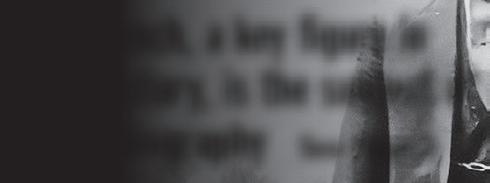
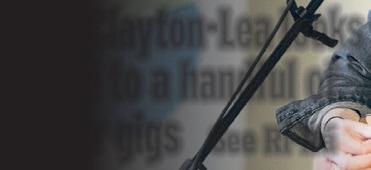
“We very much welcome the
detailed decision by the Court today,” read a statement issued by his children, Bronagh and Samuel, on behalf of the family.
“The Court has found that our father was waterboarded by the British army in Belfast in 1972. The Court also found that he was maliciously prosecuted by the army and that the army were guilty of public misfeasance. The Court has today exposed the grotesque act of torture committed by the members of the Paratrooper Regiment in Belfast in 1972.
“Our father was an innocent man who went to jail for a crime he did not commit for 17 years. We wish he was here today with us. He died on September 15, 2022.
“We miss him but salute him – his life and campaign for justice were a triumph of humanity and tenacity over state injustice.”
Mr Holden always maintained his innocence following his forced confession.
During the case, the court heard extracts from an interview Mr Holden gave to a doctor during a psychiatric evaluation.
In it, Mr Holden stated: “I don’t care about the soldiers that tortured me. I don’t care about the conviction.
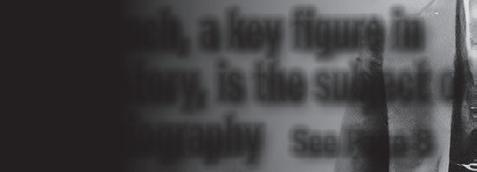
“I don’t care about the years in jail – because I can never get them back.
I haven’t got closure. The closure I want is the document that says, ‘We know he is innocent’.”
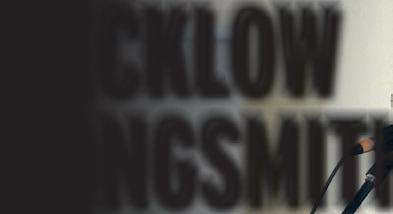

The damages awarded to Mr Holden’s estate included £250,000 for special loss, £50,000 for the torture he was subjected to, £30,000 for aggravated damages, and £10,000 each for malicious prosecution and malfeasance in public office.
Michaela – a new documentary about the Mauritius killing
BY MAL ROGERS
A NEW BBC documentary on the killing of Michaela McAreavey called Murder in Paradise will be broadcast next month
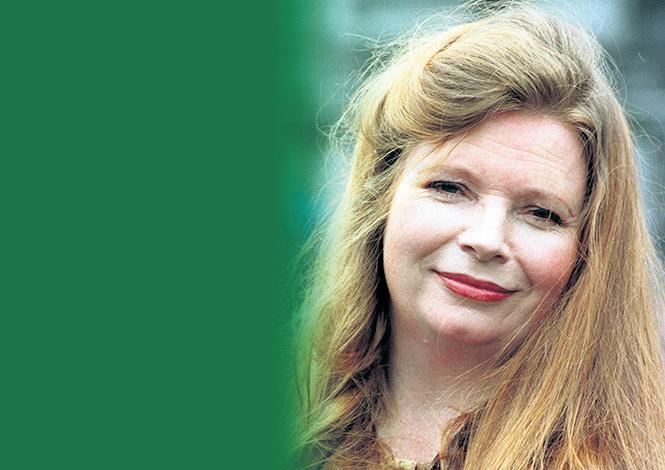
Michaela McAreavey (27) was strangled in her room at the hotel on January 10, 2011. A teacher from Co. Tyrone, she was the daughter of Gaelic football manager Mickey Harte and was on her honeymoon with John McAreavey.
Michaela had returned to her hotel suite for a snack. When she failed to come
back to the poolside, her husband John went to the suite and found her strangled in the bath.
It is believed that Michaela surprised burglars, and was strangled shortly after entering the room, then moved to the bath.
No one has ever been convicted of her killing. In August 2020. Two hotel workers were cleared of murder in 2013.
The Central Criminal Investigation Department in Mauritius reopened the investigation in August 2020.
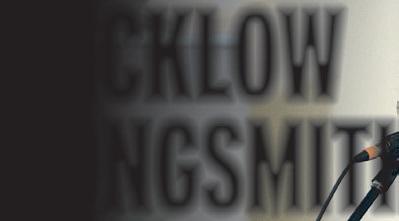
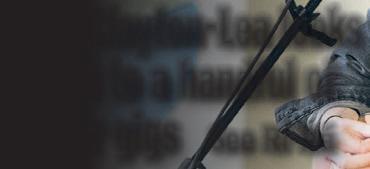

In another move in the case, Michael’s family met Tanaiste Micheál Martin in recent weeks.
A spokesman for the Department of Foreign Affairs confirmed to the Irish Mirror that the meeting took place

They said: “There continues to be engagement by the Government with the authorities in Mauritius on the death of Michaela McAreavey in 2011.
“The Tánaiste and Minister for Foreign Affairs, Micheál Martin, TD, recently met with family members.”
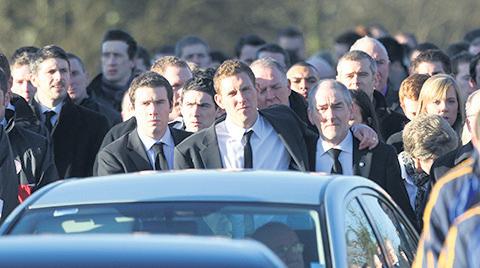
APRIL 1, 2023 £1.50 | €2 www.irishpost.com
WICKLOW
ahead
SONGSMITH
IN MOURNING: John McAreavey (centre) with his arm round Mickey Harte at the funeral of Michaela McAreavey née Harte Picture: RollingNews.ie
Disappointment for Queen Elizabeth II’s ‘right hand woman’
BY MAL ROGERS
ANGELA Kelly, Queen Elizabeth II’s dresser, did not get a top honour in the special ‘Demise’ honours awards marking the former monarch’s death. The list, drawn up by King Charles, made her a CVO, or Royal Victorian Order Commander. But according to the Daily Mail it was expected that Ms Kelly would be made Dame Commander of the Royal Victorian Order (RVO) –in the same way that the Queen’s long-serving diary secretary, Helen Cross was honoured.
Ms Kelly (65), a Catholic Liverpool woman of Irish heritage became much more important than the Queen’s stylist, hairdresser, dressmaker and aide. She was also personal assistant and
confidante.
But she was renowned among courtiers and the rest of the Queen’s staff as someone with ‘a forceful personality’. Some describe her as ‘straighttalking’ although she has also been labelled ‘abrasive’.
On top of not receiving the expected honour in the ‘’Demise’ list, it also seems that Ms Kelly’s living arrangements on the Windsor estate may be under threat. She continues to live in a grace and favour house in Windsor, and it was thought that Queen Elizabeth personally ensured that as one of her most trusted members of staff she would continue to live in the modest house on the Royal estate.
But according to the Daily Mail, that situation is not guaranteed. Sources told the newspaper they believed she had to vacate her modest
Award for Derry Girls
THE comedy series Derry Girls has claimed two gongs at the prestigious Broadcasting Press Guild (BPG) Awards.
THIS WEEK they said...
semi-detached home on the Windsor Estate ‘within weeks’. Should this happen, it will be seen as part of King Charles’ plans to ‘streamline’ the outgoings of the Royal purse.
Angela Kelly is the daughter of Thomas and Teresa who emigrated from Ireland, She was brought up on a council estate in Liverpool where Thomas was a dock worker, and Teresa a nurse.
Ms Kelly was able to devote much of her life to the Queen, particularly latterly, as she was a divorcee – she has been divorced three times. In addition to dressing the Queen and offering her advice, Kelly also travelled with her on official trips both at home and abroad. She is believed to have advocated very strongly that the Queen wear green on her state visit to Ireland in 2011.
The series, following the exploits of a group of teenage girls in Derry during the 1990s, was named Best Comedy while creator Lisa McGee won the Best Writer Award.
The show, which premiered on Channel 4 in 2018, had previously won the BPG Best Comedy Award in 2019.
“Our winners always reflect the vast amount of talent in British television and the prizes are going to both programmes and individuals who were extremely popular with our audiences last year,” said BPG chair Grant Tucker.
The association was founded in 1974 and is made up of journalists who specialise in writing and broadcasting about television, radio and the media in general..
The awards are the latest honours for Derry Girls, which is also up for two gongs at this year’s BAFTA Television Awards.
The series is nominated in the Best Scripted Comedy category, while Siobhán McSweeney — who plays Sister Michael – is in line for the Best Female Comedy Performance award.
The ceremony takes place on Sunday, May 14.
Meanwhile, Derry Girls’ hour-long final episode, The Agreement, has been nominated for Best Drama at the forthcoming IFTA Awards, with McGee up for Best Script (Drama) for the same episode.
The ceremony will be held on Sunday, May 7 and is hosted by comedian and Moone Boy star Deirdre O’Kane.
Legacy Bill under scrutiny from European lawyers
to be scrapped
GERARD DONAGHY
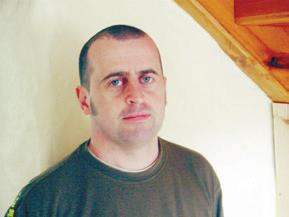
A DELEGATION from the European Association of Lawyers for Democracy & World Human Rights (ELDH) said they were ‘disturbed’ by the ramifications of the Bill following a visit to Northern Ireland last year.
They have now joined the Council of Europe’s Commissioner for Human Rights in calling for Britain to withdraw the Bill.
The Bill, making its way through the House of Lords, would offer conditional immunity for those who cooperate with a proposed Independent Commission for Reconciliation and Information Recovery (ICRIR).
Sinn Féin, which has been highly critical of the Bill, has previously said it would provide amnesty to members

of the British armed forces who had ‘killed Irish citizens’.
Thomas Schmidt, Co-Secretary General of the ELDH, was among the lawyers from Europe, South Africa and the US to visit Northern Ireland during September and October 2022.
He said: “The Delegation was disturbed to hear evidence about the regression of human rights standards in Northern Ireland.
“We are aware that the 25th anniversary of the Belfast/Good Friday Agreement will occur next month.
“Now is the time for the UK Government to urgently commit to realising human rights in Northern Ireland.”
During the visit, the delegation held meetings with human rights organisations, victims’ groups and legal bodies.
They concluded that the
British government was attempting to unilaterally dismantle the human rights framework of the Good Friday Agreement and voiced concerns regarding ‘breaches of international law and human rights’.
“The UK Government should cease its legal and political attacks on the Belfast/ Good Friday Agreement (B/ GFA),” the ELDH delegation said in its report. It is clear to the Delegation that the UK Government is not acting in good faith or fulfilling its role as an honest broker in maintaining the terms of the B/GFA.
“The Legacy Bill should be withdrawn from the Westminster legislative process.”
The report added that Ireland would be entitled to bring a claim for breach of international law to the International Court of
Justice against the British Government should the Bill succeed.
“The Irish Government should commit to making an inter-state case in the European Court of Human Rights against the UK Government’s Legacy Bill if it becomes law,” the report stated.
Responding to the report, Sinn Féin MP John Finucane called for the Bill to be scrapped.
“Ultimately, it is in breach of the Good Friday Agreement, and it is incompatible with international human rights obligations,” he said.
“This legislation is about amnesties for British state forces; denying investigation; avoiding accountability and cover-up and shutting down families from ever getting truth and justice.”
The delegates plan to submit the report to their
“Our father was an innocent man who went to jail for a crime he did not commit for 17 years. We wish he was here today with us. He died on September 15, 2022. We miss him but salute him – his life and campaign for justice were a triumph of humanity and tenacity over state injustice.”
A statement from the family of Liam Holden
“It is so important that we recognise and celebrate each other’s cultures, so I am delighted to see this mosaic installed celebrating our wonderful Irish community. Local people have been at the heart of this project, and I hope that they will enjoy the finished piece for many years to come.”
Councillor Roulin Khondoker, Executive Member for Equalities, Culture and Inclusion at the official unveiling of a mosaic in honour of Irish navvies.
“Some unionists think it is not stupid to simply hold fast and resist change, trusting that no matter how much they are reviled as doggedly negative no ultimate political deal can be made without them.”
Malachi O’Doherty
respective national associations of human rights lawyers.
Copies will also be submitted to the British, Irish and US Governments, as well as the EU Commission.
Boris Johnson’s government originally introduced the legislation in an attempt to draw a line under the Northern Ireland Troubles by dealing with so-called ‘legacy issues’ — in other words more than 1,000 unsolved or unresolved killings. They range from alleged killings by British soldiers to alleged killings by paramilitaries on both sides.
Under the bill, immunity from prosecution will be offered to those who co-operate with Troubles’ investigations run by a new information recovery body.
None of Northern Ireland’s parties agree with the bill.
“In Bell and Sigh, Sarah Baume has created a marvellously shambolic and memorable pair of characters, setting them in a creaking house in a wind-blown Irish landscape, where they walk their dogs and grow ever closer.”
Jon Gower – prize-winning Welsh author and academic at Swansea University and one of the judges Swansea University Dylan Thomas Prize speaking about the Cork author’s inclusion in the short list.
“The need to be special is about what others think of us and how that makes us feel validated. The more we acknowledge it, the more light we shine on it, the less it becomes our driving force.”
Cork singer, songwriter and multi-instrumentalist Lenii
020 7001 9390.
2 | April 1, 2023 The Irish Post NEWS @theirishpost
a new subscription, subscription queries, or
Join us at The Irish Post Follow us on @TheIrishPost NEWS 2-10 COMMENT&OPINION 11-13 RÍ-RÁ 15-20 SPORT 26-28 Untangling patriotism from jingoism Page 13 Paisley, the political phenomenon Page 15 Ireland’s soccer team may be heading for a golden era Page 26 The stark reality of unionist politics Page 4 From fighting the British to fighting his comrades Page 8
For
to order a recent issue, call
Legal team has called for the British government’s controversial bill
“Kerry Babies” case – gardaí release two arrested last week
Two people are arrested following a cold case review into the notorious killing, now 39 years old
BY MAL ROGERS
GARDAÍ last week arrested two people in connection with the discovery of the body of a five-day-old baby on a beach in Cahersiveen, Co. Kerry, in April 1984.
They were subsequently released. A file is being prepared for the DPP.
The two people, a man in his 60s and a woman in her 50s, were arrested on suspicion of murder in Kerry. They were initially detained under Section 4 of the Criminal Justice Act.
The body of the baby, subsequently named John, was found with 28 stab wounds.
The arrests, in connection with what became known as the “Kerry Babies” case, is a significant development in a cold case review launched in 2018, according to lead investigator Superintendent Flor Murphy.
He has said gardaí are focused on establishing the truth of what happened to Baby John in the Kerry Babies case.
DNA evidence will constitute part of the evidence used in determining the
progress of any subsequent prosecution.
Supt Murphy said at the beginning of the cold case enquiry in 2018 that it was the strong belief of the investigating team that the
answers to the questions about baby John’s death lay in Cahersiveen and its near environs.
The Kerry Babies case in 1984 concerned the killing of one newborn baby and
the alleged killing of another.
On April 14, 1984 a dead male infant with stab wounds was found on the rocks at Cahirciveen, Co. Kerry by a local.
Gardaí conducting the
initial investigation into baby John’s death in 1984 drew up a list of pregnant women who had either left the county or had not appeared to have a new-born infant.
An unmarried woman, Joanne Hayes from Abbeydorney, who was known to have been pregnant, was identified and arrested. She worked locally as a telephonist at the Tralee sports centre. She was known to have been having an affair with the groundsman at the centre, who was a married man.
Ms Hayes was arrested by a gardaí investigation unit and was accused wrongly of being the mother of baby John. Family members –sister, brothers and aunt –were accused of concealing the birth of the baby.
Ms Hayes had told gardaí she had given birth to a child, Shane, who was stillborn or died shortly after birth. He had been buried on the family farm around the same time as the body was found on the beach. Shane’s remains were subsequently located.
Gardaí were forced to drop
Ireland’s position on neutrality reappraised
BY MAL ROGERS
RTÉ reports that Tánaiste Micheál Martin is developing new strategies for Ireland’s neutrality in view of international events such as the Russian invasion of Ukraine. The revelations came in a statement made by Taoiseach Leo Varadkar to RTÉ. He said: “The Tánaiste is developing proposals on that and at the right time, and at a time of his choosing, I think he’ll tell you more about it.”
Asked if a citizens’ assembly might form part of those proposals the Taoiseach told RTÉ: “It wouldn’t be fair for me to half announce a proposal that he’s developing at the moment. So I’ll leave it to the Tánaiste and Minister of Defence to do that.”
Mr Varadkar said Ireland’s neutrality was not under any scrutiny at EU level.
But a year ago Foreign Minister Simon Coveney said that Ireland’s traditional military neutrality would need to be redefined, although a referendum on the
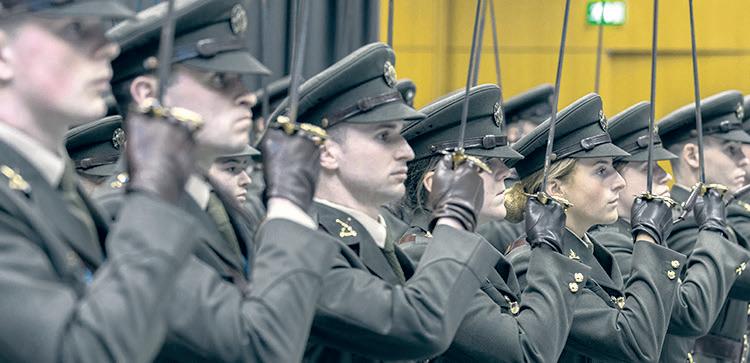
topic “was is not currently on the government’s radar”.
The longstanding policy of neutrality has been in place since the 1930s, and saw Ireland remain neutral during World War II. However, Irish Defence Forces troops have served with distinction in peacekeeping duties for the UN in some of the world’s intractable trouble spots.
The policy of neutrality has shaped Ireland’s response to the war in Ukraine. As part of the EU’s support package, Ireland
has chosen to contribute nonlethal materials such as medical supplies and bulletproof vests rather than weapons.
In Brussels last week Taoiseach Varadkar reiterated Ireland’s stance of military neutrality, but added: “We’re not politically neutral. We’ve always been on the side of the West, on the side of democracy and on the side of freedom. And that’s particularly the case now that we’re facing this war in Ukraine.”
He told RTÉ that Irish troops participated in PESCO, the EU’s
security and defense cooperation platform, and also in the European Defence Agency.
“We’re a member of EU battle groups. So, our neutrality needs to be seen for what it is.”
Four other countries in the EU are also neutral: Finland, Sweden, Malta and Austria. But Ireland has the lowest spend per GDP (.2 per cent) of any country in the EU.
Although neutral, Ireland and Britain share a defence agreement. In 2015 Minister Simon Coveney signed what is known as a Memorandum of Understanding with the then British defence secretary Michael Fallon This memorandum, which falls just short of a treaty, ensures greater defence collaboration between the two countries. A memorandum such as this is not legally binding, but describes the broad outline of an agreement.
In practical terms this means that in the event of Ireland being attacked by a foreign power, Britain would come to its aid – or, indeed, vice versa.
the charges four years later and a tribunal of inquiry, the “Kerry Babies Tribunal”, was launched.
The report, critical of the police conduct of the investigations, concluded that Ms Hayes had precipitated the death of her baby – not “Baby John”. A suspicion that Ms Hayes had given birth to twins was subsequently found to be false. The tribunal said the gardaí were guilty of “resorting to unlikely, far-fetched and self-contradictory theories that Joanne Hayes had given birth to twins in an attempt to link her with the Cahirciveen baby”.
In 2020, the Irish State formally apologised after 36 years to Joanne Hayes for wrongly accusing her of the murder and for the “appalling hurt and distress caused.”
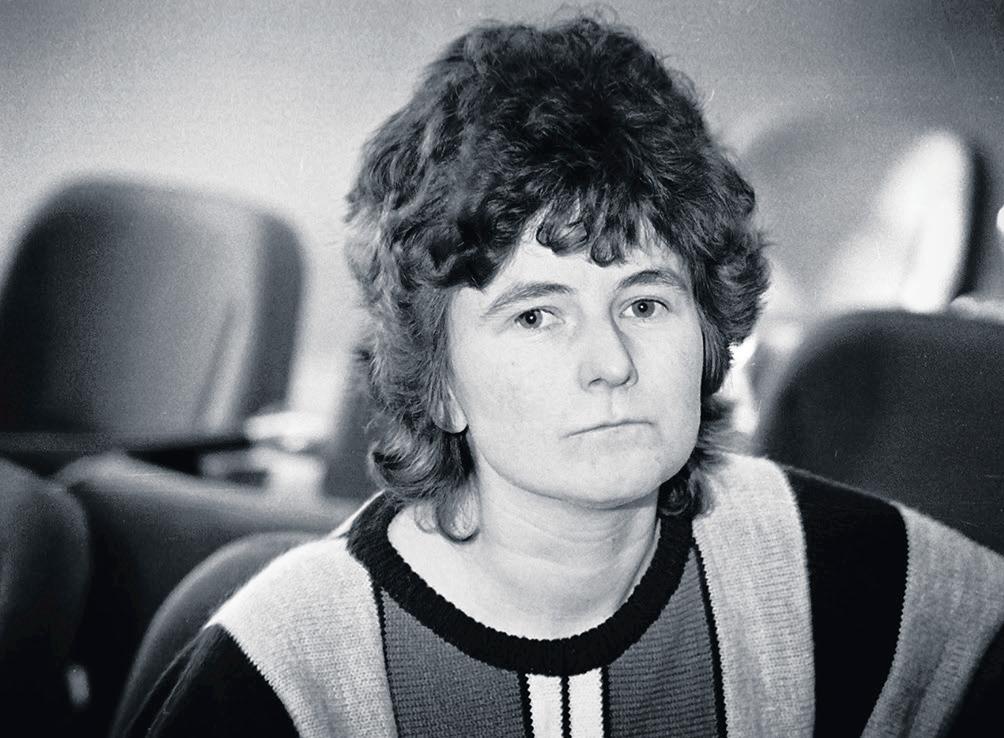
The case had a significant impact on Irish society, and led to changes in the way that investigations into infant deaths were conducted. It also sparked broader discussions about women’s rights and the treatment of women in the Irish legal system.
Sex offences committed by Northern Irish man
A MAN from Northern Ireland has been charged with online child sex offences in Australia.
The 34-year-old was arrested and charged following a joint operation between officers from Police Service of Northern Ireland (PSNI) and Western Australia’s Joint AntiChild Exploitation Team.
Praising the operation, Chief Inspector Fox of the PSNI’s International Policing Unit, said: “This is an excellent example of our officers working across international borders to protect vulnerable people wherever they are, identifying and prosecuting offenders wherever they are, and contributing to our goal of keeping people safe both here and beyond.”
He added: “We will continue to work with international colleagues to prevent similar offences in future from online predators.
“The offender will be subject to sex offender restrictions if he returns to the UK.”
NEWS The Irish Post April 1, 2023 | 3 /theirishpost
PARADE: Cadets from the Irish Defence Forces Picture: Courtesy of Irish Defence Forces
WRONGLY ACCUSED: Joanne Hayes in 1985 Picture: RollingNews.ie
The stark reality of unionist tactics
within committees advising his ministers but would not accept that people who actually wanted a united Ireland should have any place in government.
This was a cruel assessment. The taxi that Mallon was waiting for would take him to Poyntzpass in Co. Down, the scene of a double murder the night before of Phillip Allen and Damien Trainor, one a Catholic, the other a Protestant, ad close friends.
He and Trimble would together visit both grieving families to express their sympathies together and that gesture was presented by the media as an example of cross community generosity and an assurance that both victims had the sympathy of the whole community.
And years later Mallon admitted that Trimble had been badly treated given that the political risk he had taken was so great. Nor did that risk really pay off for him. He accepted the Good Friday Agreement but ultimately lost his party and the Democratic Unionist Party inherited the benefit of his courage.
Even then, the new leader of unionism, Ian Paisley, long seen as the uncompromising hard man, was brought down by his party for being too conspicuously genial with his partner, Martin McGuinness, or Oglach Martin McGuinness as he is remembered on his gravestone.
So over and over again we have the clearest illustration of the fact that Unionism is not homogeneous and that compromising leaders who try to settle deals with nationalism get brought down by their own people.
Jeffrey Donaldson, the current leader of the Democratic Unionist Party took the top job against resistance from the more conservative and religious wing. Those who think the solution to the current deadlock is for Donaldson simply to make a brave decision and stand over it forget that party members have to move with him or they will destroy him as they destroyed Faulkner, Trimble and Paisley. These are three strong precedents suggesting that the most astute political career move for Donaldson to make is to do nothing.
A CALLER to a radio programme I was on offered a simple solution to the problem of political deadlock in Northern Ireland. He said if the unionists won’t grow up we have to move on without them.
I hear variations of this comment often. There is the standard joke that unionists have only one word in their vocabulary and that word is ‘No!’
Hillary Clinton said, absurdly that those unionist leaders who were protesting against the Northern Ireland protocol by boycotting Stormont should simply stand aside and let others get on with the job.
This is so naive she can hardly believe it herself but it fits with an
easy dismissal of unionism as stupid and intransigent. It fits also with an assumption that Northern Ireland is destined to move in one direction
and that the job of those parties which think differently is to simply wise up and not seek to influence change in their own preferred way. There is indeed a long history of unionist resistance to change, but not just because party leaders are slow dullards.
When the Troubles were at their worst in the early 1972 and the British government was trying to entice unionists into compromising with nationalists, or ‘the minority’ as they were routinely called then, even those would ultimately compromise had little sense of how far they would have to shift.
Brian Faulkner, the Northern Ireland prime minister conceded that he might include Catholics
A year or so later, at Sunningdale, he accepted power sharing with the SDLP, and the basic model which became the Good Friday Agreement. His party split and the majority of unionists sided with opposition to the new assembly and brought it down, aided by massive street protest and the Ulster Worker’s Council strike of 1974.
When David Trimble, 20 years later, revisited the idea of a compromise, he also split his party.
And he got little appreciation from nationalists for the risk he had taken. The nationalist stereotype of unionists is that they are homogeneously obstinate and Trimble seemed to fit that.
He was a difficult man given to flashes of temper.
One day I met with his SDLP partner in the executive, Seamus Mallon, standing on the steps of Broadcasting House in Belfast waiting for a taxi. I asked him how he was getting on with Trimble.
He said, “That man hasn’t got it in him to be big about anything.”
There is no point in imagining, as Hillary Clinton appears to, that internal party democracy in unionism can be waived aside as a mere nuisance.
The unionist leader who compromises with nationalism always loses support because a big section of the community on which it draws is religious and chauvinistic and wary of change, but also fears that it is being outflanked by nationalism, Sinn Féin and the SDLP clearly having slicker, more eloquent operators in charge.
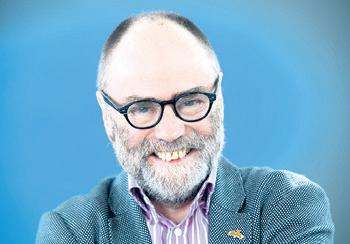
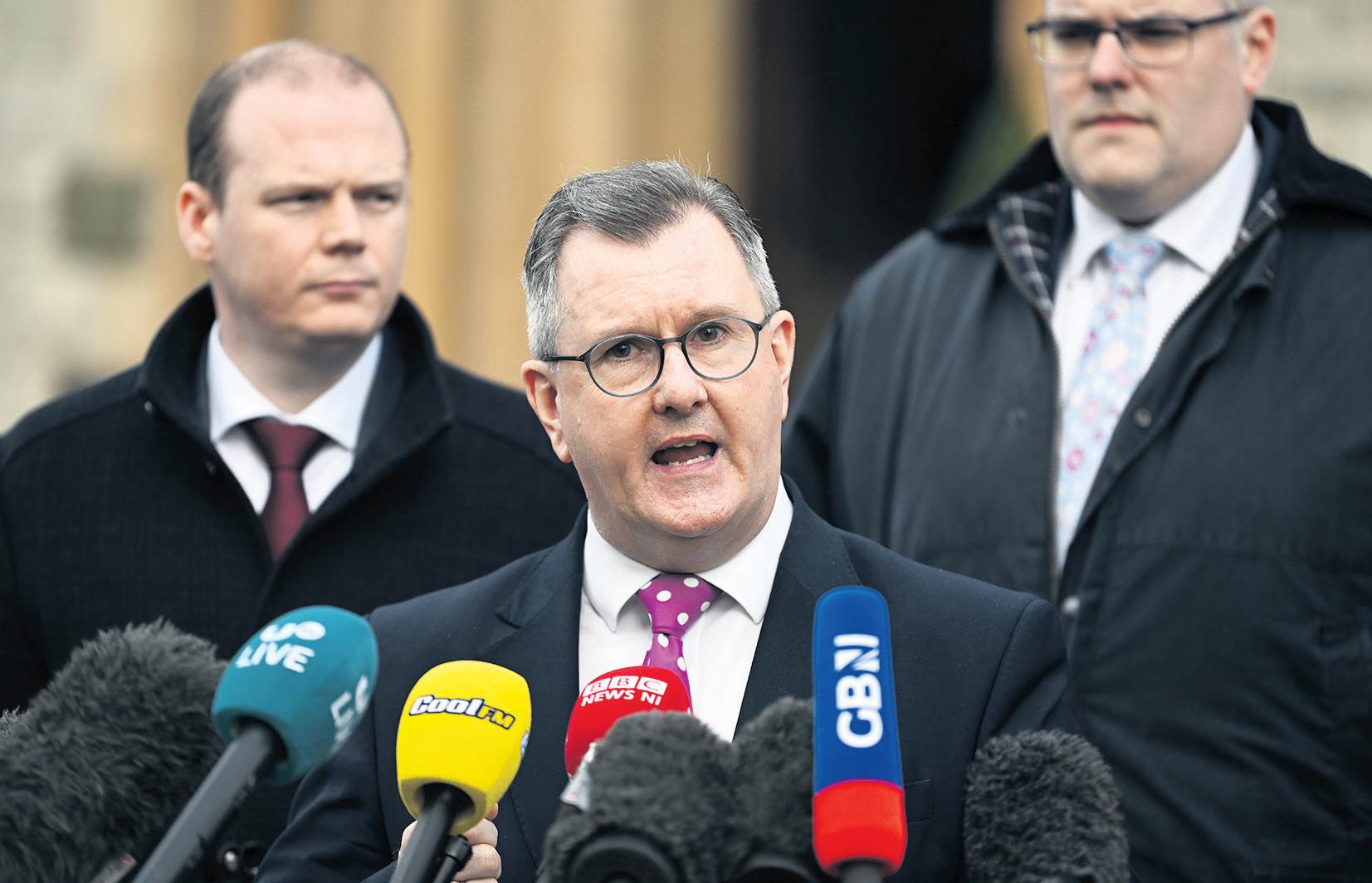
And many are averse to partnership with Sinn Féin which still celebrates the IRA as patriots.
Nationalism also has the demographic advantage while it draws on a Catholic community which is younger and growing faster.
Some unionists think it is not stupid to simply hold fast and resist change, trusting that no matter how much they are reviled as doggedly negative no ultimate political deal can be made without them.
n Malachi O’Doherty is one of Ireland’s leading political commentators and author of 11 books on the North of Ireland.
4 | April 1, 2023 The Irish Post NEWS @theirishpost
Some unionists think it is not stupid to simply hold fast and resist change, trusting that no matter how much they are reviled as doggedly negative no ultimate political deal can be made without them
Any long-term settlement in the North requires acceptance by unionists, no matter how inconvenient a truth that is
MALACHIO’DOHERTY
BELEAGUERED LEADER: Sir Jeffrey Donaldson putting his point of view Picture: Getty Images
Newry statue to Celtic legend
A bronze statue to Glasgow Celtic’s foremost manager is to be unveiled this month in Newry
BY MAL ROGERS
A LIFE sized bronze statue in honour of Celtic Football Club’s most successful manager Willie Maley is to be unveiled in Newry on Saturday, April 15.
William “Willie” Patrick Maley was born in Newry on April 25, 1868 the son of Thomas Maley who was from Ennis, Co. Clare. His mother Mary had been born in Canada to Scottish parents. Maley was born in Newry Barracks – his father was serving in the British Army at the time.
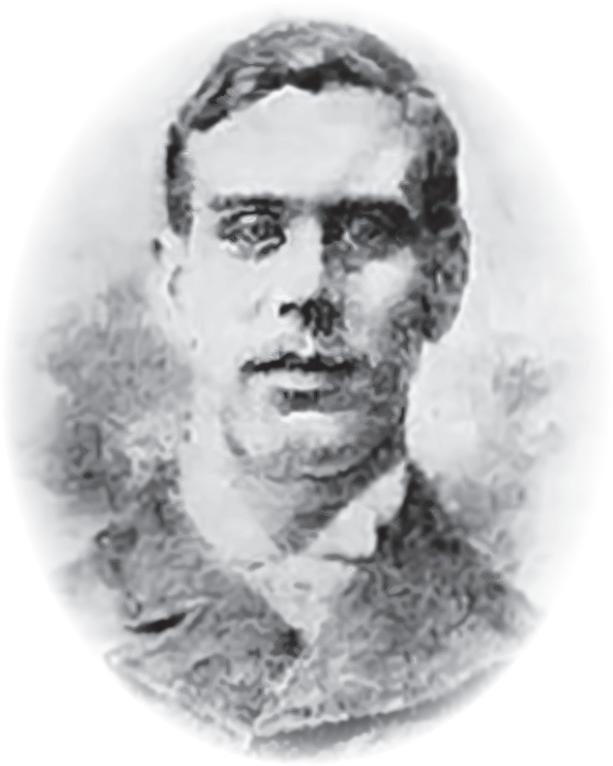
Willie Maley was the first manager of Celtic, and widely regarded as one of the most successful managers in Scottish football history. He is largely credited with turning the club into an internationally renowned force in football. He led Celtic to 30 major trophies in 43 years as manager.
The sporting and heritage project is being carried out by the Newry Willie Maley Memorial Group, a group which has campaigned to erect a memorial to one of Newry’s most famous sons. Their Facebook page says: “The Newry Willie Maley Memorial Group is a community group which has come together to ensure a fitting memorial to a local sporting legend is delivered. This is a sporting and heritage project involving the Celtic family and the wider community.”
Some £80,000 has been raised both locally and in the wider football fraternity, notably in Glasgow – it is known that some Rangers supporters also contributed to the fund.
The application to Newry, Mourne and Down District Council, which was approved last year, specifies “the erection of a life-sized bronze statue (1.95m high) on a
Irish nominee for literary prize
FIONA AUDLEY
AN IRISH author has made the shortlist for one of the world’s largest literary prizes celebrating young writers.
Cork native Sara Baume has been announced as one of six authors shortlisted for the Swansea University Dylan Thomas Prize.
The final list – featuring four debuts and four female writers, as well as three titles from independent publishing houses – comprises three novels, two short story collections, and one poetry collection.
Baume is listed for her novel Seven Steeples, published by Tramp Press in Ireland.
Based in Skibbereen, west Cork, she is a previous winner of the Geoffrey Faber Memorial Prize, the Rooney Prize for Literature and the E.M. Forster Award.
She also works as a visual artist.
Baume goes up against Limberlost by Australian writer Robbie Arnott, God’s Children Are Little Broken Things, a selection of short stories by Nigerian author Arinze Ifeakandu, I’m a Fan by British author Sheena Patel and Send Nudes by Saba Sams, also based in Britain, and Bless the Daughter Raised by a Voice in Her Head, a poetry collection by Somali-British writer Warsan Shire.
Di Speirs, Chair of the judges, and Books Editor at BBC Audio, said of the shortlist: “There’s brilliance and beauty in the six books shortlisted for this year’s Swansea University Dylan Thomas Prize.
“All six – while hugely different in style, subject and genre, and ranging from rural Tasmania and the wild Irish coast to the sharply contemporary in Nigeria and the UK –exemplify not only the talent and excitingly fresh, often startling, writing we were seeking, but draw the reader in and on.
“There’s wit and wisdom, pleasure and pain, acute observation of the natural world and of human relationships and
above all, so much to savour.
“That we all agreed so clearly on our shortlist is testament to the strength of this potent mix of poetry, short stories and novels and to the power of the six writers.”
Worth £20,000, the Swansea University Dylan Thomas Prize is one of the UK’s most prestigious literary prizes as well as the world’s largest literary prize for young writers.
Awarded for the best published literary work in the English language, written by an author aged 39 or under, the Prize celebrates the international world of fiction in all its forms including poetry, novels, short stories and drama.
Judge Jon Gower, the prize-winning Welsh author and lecturer in English at Swansea University, describes Baume’s third novel as “beautifully quiet and quietly beautiful” he adds that the novel “maps out two lovers’ lives with custodial care and in delicate, precision prose”.
“In Bell and Sigh, Sarah Baume has created a marvellously shambolic and memorable pair of characters, setting them in a creaking house in a wind-blown Irish landscape, where they walk their dogs and grow ever closer,” he explains.
“Tender and true, this is a book that lingers like the coconut scent of gorse in full flower.”
The judges will now deliberate and select their winner, with the final decision due to be announced at a Winner’s Ceremony in Swansea on Thursday, May 11, prior to International Dylan Thomas Day on Sunday, May 14.
Joining Ms Speirs and Mr Gower in whittling down the six-strong shortlist to a single winner is American bestselling author and 2012 winner of the Swansea University Dylan Thomas Prize winner Maggie Shipstead, British poet and the founder of Octavia Poetry Collective for Women of Colour, Rachel Long, and Nepali-Indian author and 2013 Prize shortlistee Prajwal Parajuly.
black granite plinth (3m x 1m) in memory of a renowned native sporting manager and player. New granite silver flag paving is also proposed as part of the scheme, to be arranged in the area surrounding the proposed statue and plinth, with surrounding existing planters and garden to remain in situ.”
As reported by Newry Beo, a spokesperson said: “As pointed out previously this project was funded by you and only you with no financial backing from any party or official office and that’s something to be proud of, for in the years ahead we can look back and say without contradiction that statue is owned by the supporters.”
The statue will be unveiled at Linenhall Square/ Mourneview Park, Newry, on Saturday, April 15
Three former Celtic players will be in attendance: Joe Miller, Jackie McNamara and Tommy Johnson.
Celtic Football Club was founded at a meeting in St Mary’s church hall in Calton, Glasgow, by
Marist Brother Walfrid, on November 6, 1887. Brother Walfrid – secular name Andrew Kerins –was born in Ballymote, Co. Sligo. He had come to Glasgow as a teacher, and was shocked at the poverty in the East End of Glasgow, whose population had a substantial number of Irish immigrants. Walfrid’s idea was to establish the club as a means of fund-raising – much like Hibernian had done in Edinburgh. Walfrid’s own suggestion of the name Celtic was intended to reflect the club’s Irish and Scottish roots and was adopted at the same meeting. The club has the official nickname, The Bhoys. According to the Celtic press office, the newly established club was known to many as “the Bold Bhoys” or “the Bould Bhoys”. The extra h imitates the spelling system of Gaelic, where the letter b is often accompanied by the letter h. It is hoped that representatives from Co. Sligo make the journey to Newry for the unveiling statue of Willie Maley.
Appointment to the Emigrant Services Advisory Committee
The Embassy of Ireland, London is seeking expressions of interest from suitably qualified people for appointment to the Emigrant Services Advisory Committee.
The Emigrant Services Advisory Committee (ESAC), formerly known as the Díon Committee, was established in 1984 to advise the Government on issues of concern to the Irish community in Britain. Its work is coordinated by the Embassy of Ireland in London.
The Committee advises on the delivery of the Government’s Emigrant Support Programme in Britain, grants from which amounted to €6million for the 2022-23 programme. This includes assessing applications made to the programme. Members will serve on a part-time basis and do not receive remuneration. Expenses associated with attendance at meetings will be covered. Prospective members should expect to serve an initial term of 3 years upon joining the Committee with the possibility of serving one more consecutive term only of 3 years. Expressions of interest should be accompanied by a Curriculum Vitae. The Embassy will not be restricted to considering only those who have responded to this invitation but will ensure that all of those appointed have the relevant qualifications for the positions.

Please submit expressions of interest to IrishCommunityCultural@dfa.ie by Thursday 6 April 2023.
Further information on the work of the Committee is available at https://www.dfa.ie/irish-embassy/great-britain/our-role/irish-community-in-britain/emigrant-services-advisory-committee/
Willie Maley Picture: Public domain
NEWS The Irish Post April 1, 2023 | 5 /theirishpost
minutes with...
LENII
FROM Cork, Lenii is a singer, multiinstrumentalist, songwriter and music producer. She has enjoyed a string of successful singles, racking up 400k monthly Spotify listeners, and a following of 180k on TikTok.


What is your favourite place in Ireland?
Newmarket in north Cork. That’s where all my mom’s family is from and it feels more like home than anywhere.
Mozart or Martin Hayes?
I literally want to call one of my future kids Wolfgang lol – so Mozart 100 per cent.
What would be your motto? Nothing really matters
Which living person do you most admire?
If I can say two, then my parents Bowie or Beyoncé? Both.
What are you up to?
Right now I’m getting ready to play some shows in LA that I’m really excited about after my new EP Zero Sympathy comes out. I’ve also been producing a lot of music for Kenzie, so I’m splitting my time between both projects and loving being busy.
Which piece of music always sends a shiver down your spine?
All I Want by Kodaline.
Which musician has most influenced you?
There’s a few answers to this. I always say Eminem has been my biggest influence lyrically, but *old* Kanye shaped my music a lot production wise and Amy Winehouse melodically.
How did you get started in music?
I’ve been writing songs for as long as I can remember and started classical violin when I was four. When I was 15, I moved to New York and started producing and getting into songwriting for other people, so it’s been a bit of a journey trying out different paths, but I really just always wanted to be Hannah Montana, lol.
If you were told musicians are no longer welcome in Ireland, where would you go?
I live in LA now so I suppose I’d go here!
Where are you from in Ireland?
Cork City
What’s on your smartphone playlist at the minute?
Raye!! Her new album My 21st Century Blues is a masterpiece. Also Fontaines D.C. and Noga Erez.
Pantomime or opera?
A bit of both!! I used to be in the panto at Cork Opera House every year when I was small but I listen to a lot of classical music and opera to clear my head.
Rory puts his Best foot forward
FORMER Ireland rugby international Rory Best launched Rory’s Miles 2 Mayo at the Aviva Stadium last week to raise vital funds for childhood cancer charity, Cancer Fund for Children. The rugby legend will take on a 300km walk on May 16 spanning 10 days across 8 counties to raise a target of €2million for Daisy Lodge a second therapeutic short break centre in Cong, Co. Mayo for children with a cancer diagnosis and their families. You can donate on www.rorysmiles 2mayo.com.
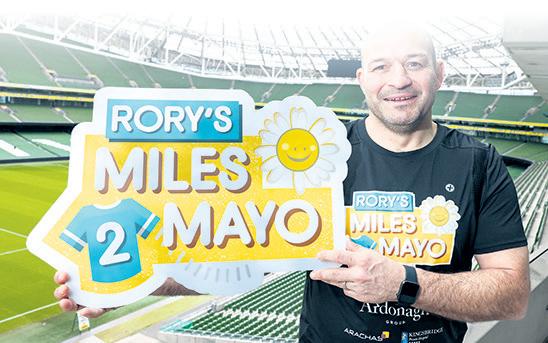
Monument to London Irish
If you weren’t a musician what other job would you be really good at? Surgeon. Everyone’s going to think I’m insane for this but I actually love watching surgeries on YouTube.

What’s the best piece of advice you’ve been given this year?
My mom literally sent this to me this morning so it’s on my mind: The need to be special is about what others think of us and how that makes us feel validated. The more we acknowledge it, the more light we shine on it, the less it becomes our driving force.
In terms of inanimate objects, what is your most precious possession?
My laptop has my whole life on it so probably that.
What’s the best thing about where you live?
I live in LA so the weather 100 per cent. . . . . and the worst?
It’s crazy expensive and takes an hour to get anywhere
What’s the greatest lesson life has taught you?
To not worry so much about what people think of you! You can’t control it and you’ll never be loved by everyone so trying to be is a waste of energy.
What gives you the greatest laugh?
My sister, she’s a hoot
What do you believe in?
Hitting the kettle fixes 90 per cent of problems!
What do you consider the greatest work of art?
The world!! That might be cheesy but look at the planet we live on, it’s impossibly gorgeous.
Who/what is the greatest love of your life?
People. All the people I love in my life and just interacting with people in general.
Nurses and navvies feature on a new mosaic to the Irish community in Archway, London
Executive Member for Equalities, Culture and Inclusion said: “In Islington, we stand with our communities to make sure they feel connected, and we are proud of the diversity and inclusion that exist here.
“It is so important that we recognise and celebrate each other’s cultures, so I am delighted to see this mosaic installed celebrating our wonderful Irish community.
“Local people have been at the heart of this project, and I hope that they will enjoy the finished piece for many years to come.”
A NEW mosaic unveiled in a London borough celebrates the contribution of the Irish community to the area.
Islington Council revealed the artwork at Navigator Square in Archway last week, announcing that it is a permanent feature celebrating “the huge contributions of Irish people to life in the borough”.
Cllr Roulin Khondoker and artist Maud Milton pictured by the new Irish mosaic at Navigator Square

The piece was commissioned by the council, and created by artist Maud Milton, to pay tribute to Irish heritage and culture, which has played an important role in Islington’s history, they confirm.
The council also hopes that the mosaic will be an attraction that helps to animate Navigator Square and bring visitors to the local economy.
Archway is of particular historic significance for the Irish community, as many generations of Irish
Londoners have made their home there.
Navigator Square takes its name from the Irish navvies – construction workers who moved to England n the 19th century – who settled there.
The nearby Whittington Hospital is also known to have employed many Irish nurses over the decades.
The mosaic was unveiled by Irish Ambassador to the UK, Martin Fraser, and the Mayor of Islington, Cllr Marian Spall last Wednesday (Mach 22)
Many of the tiles in the piece were handmade by Year 5 pupils from St Joseph’s, Yerbury, Hargrave Park and St John’s Upper Holloway Primary Schools.
The tiles make up nine panels, which depict the lives of Irish navvies and nurses, as well as important aspects of Irish heritage such as coins, national symbols and traditional Celtic art.
Cllr Roulin Khondoker,
Artist Maud Milton said: “I had a wonderful experience working with Islington Council to create this mosaic. Community is central to all my work, and I’m delighted that four local schools could contribute hundreds of handmade tiles to this mural. I recently traced my own Irish heritage, and I hope this will inspire the people of Archway to feel connected to their own heritage too.”
Claire McFlynn, Executive Headteacher, St Joseph’s Catholic Primary School, said: “At St Joseph’s we have many staff and pupils of Irish heritage, and many more without. But the heritage in our community belongs to all of them. We were delighted to work with Islington Council on this mosaic and that the values of collaboration and community are forged both inside and outside the classroom.
“As we say in Irish, go raibh míle maith agaibh, thank you all very much.”
6 | April 1, 2023 The Irish Post NEWS @theirishpost
FUNDRAISER: Rory Best
MOSAIC MEMORIAL: Artist Maud Milton and Cllr Roulin Khondoker
Lenii
Some hard bargaining and soft-soaping over canapés
KEVIN MEAGHER looks at the significance of the recent commute to Washington by Irish politicians
the US commitment to seeing Northern Ireland succeed further, an ambition the UK and US governments share”.
The Americans know they can sprinkle a little magic over proceedings and starstruck British politicians will lap it up.
But during St Patrick’s week, its Irish diplomatic pull – ‘soft power’ – that undoubtedly counts for more.
And not just because Joe Biden is such an enthusiastic son of the diaspora.
Frankly, it doesn’t matter who the president is, the brute strength of the Irish American caucus on Capitol Hill – the congressmen and senators – ensure that Irish issues are firmly on the agenda.
The new Republican Speaker of the House of representatives, Kevin McCarthy, even likened himself to his legendary Democratic predecessor, Thomas ‘Tip’ O’Neill.
He famously took a close interest in Northern Ireland and helped funnel $250 million towards peace initiatives and economic development after the signing of the Anglo-Irish Agreement in 1985.
– as they hold hands tightly for a group shot. He looks for all the world like the father-ofthe-bride giving away his eldest daughter on her wedding day.
It speaks volumes about how Biden and most of the Irish American political class see the near future. They reckon Sinn Fein will break through in Dublin in the next couple of years and the debate about Irish unity will then turn up a notch.
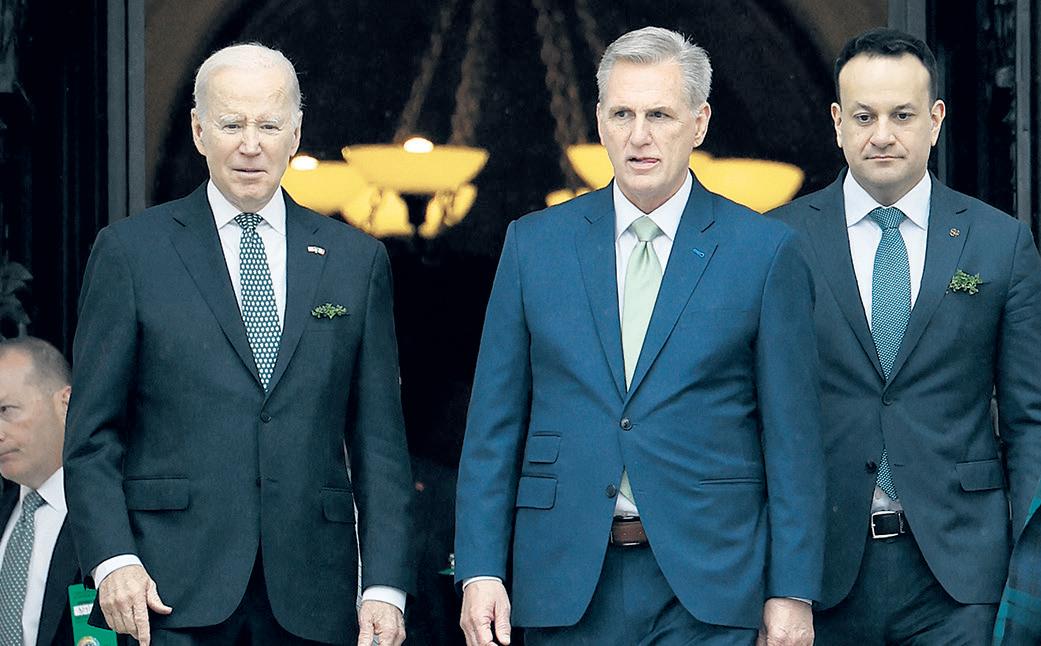
And they will be delighted if that’s how things turn out, bringing encouragement, hard cash and a ‘can-do’ attitude to proceedings.
So, where are the unionists during St. Patrick’s week, you might ask?
They go to Washington as well. After all, 20 or so US presidents had Ulster-Scots heritage.
They receive a cordial and friendly reception, if hardly effusive. Not helped by the brittle nature of some unionist politicians, it bears stating.
THESE days, it seems like the entire the Irish political class – north and south – hops on a plane and high-tails it across the pond for the annual St Patrick’s festivities. Lunches and networking. Dinners and schmoozing. Glad-handing and posing for photographs.
But it’s about more than reminiscing about the ould country amid the whirl of receptions and meetings in the White House. This is hard politics.
The US might not be a signatory to the Good Friday Agreement, but it was certainly its midwife, and American politicians keep a beady eye on Irish developments.
Obviously, many of them have family connections and even more represent communities where pride and affection in being ‘Irish American’ is genuine and heartfelt.
So, they use this time of year to check-in, to
hear from all the key players in Belfast and Dublin, chiding and chivvying to bridge whatever impasse we have arrived at.
The British are there too, with officials from the Northern Ireland Office clambering over each other for tickets to accompany the Secretary of State.
Chris Heaton-Harris posted a photograph on Twitter of himself at the prestigious Friends of Ireland lunch in the White House (note, this was not the friends of ‘Northern Ireland’).
He’s standing next to former congressman, Joe Kennedy, the latest scion of the clan who President Biden has recently appointed as his economic envoy to Northern Ireland.
Heaton-Harris looks intently at Biden, clapping his speech with all the verve he can muster. “A pleasure to join today’s luncheon,” he gushed, adding that it was “great to hear President Biden’s words which clearly stated
This, then, is the value of US involvement in Irish affairs – the Americans think big. They have an innate sense of how to use power and the possibility of change and will not settle for British foot-dragging.
For instance, Biden has left Prime Minister Rishi Sunak in no doubt that he had better get the long-running row about the Northern Ireland Protocol sorted ahead of the 25th anniversary commemorations of the Good Friday Agreement, which he is planning to attend next month.
The Americans are also much more clearheaded in responding to changes of political wind direction.
This was summed up in a single image of Joe Biden posing for a photograph.
He’s there – beaming smile and a clump of shamrock in his lapel, stood next to Sinn Féin President, Mary-Lou McDonald – also beaming
Unable to break the habit of a lifetime, Jeffrey Donaldson, the DUP leader, upbraided Senator Chuck Schumer, the Majority Leader in the Senate and one of the big beasts of US politics.
The Senator had suggested the DUP should ‘get to the people’s business’ and restore the devolved institutions. Donaldson later told journalists that Schumer should ‘read some history books.’
Meanwhile former Secretary of State, Hillary Clinton, went was far as calling for unionists who are currently boycotting the Northern Ireland Assembly over the protocol row to resign and make way for people committed to restoring devolution.
So, canapés and cocktails amid the high-end craic. But tough talk as well.
n Kevin Meagher is author of A United Ireland: Why Unification is Inevitable and How it will Come About and What A Bloody Awful Country: Northern Ireland’s Century of Division
Cancel culture scuppers debate at university
BY CATRIONA GRAY
CLAIRE Fox’s appearance at a debate about cancel culture and free speech, scheduled for the debating society at Royal Holloway, University of London, has been – somewhat ironically – cancelled.
Fox, the daughter of Irish Catholic immigrants John Fox and Maura Cleary, was an MEP candidate in the north-west of England. She now sits in the House of Lords as Baronness Fox of Buckley.
A leading journalist and
regular broadcaster on BBC Radio, in previous times
Claire Fox (62) was a prominent member of the far-left Revolutionary Communist Party (RCP) which supported “the right of the Irish people to take whatever measures necessary in their struggle for freedom”.
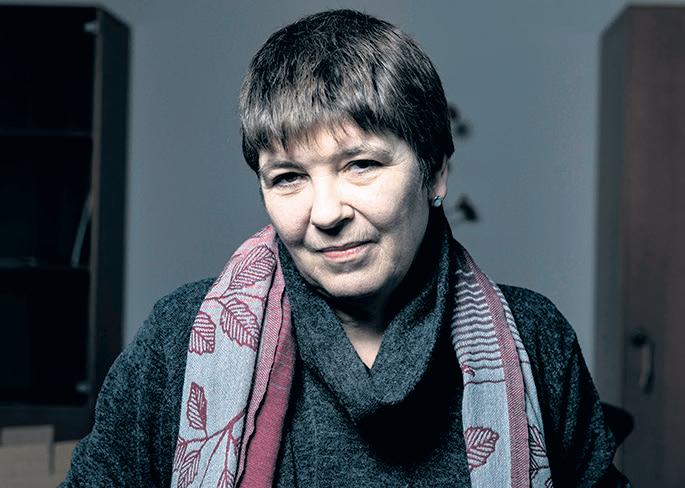
But it is not her republican views that have resulted in her being told she is unwelcome at Royal Holloway.
The Times reports that she is “furious” about being disinvited by the debating society at Royal Holloway,
University of London, for retweeting a Ricky Gervais gag that appeared to be anti-transgender.
Maia Jarvis, the RHSU president, had notified the debating society of Fox’s retweet of a Ricky Gervais joke in his last Netflix special.
In an email reported by The Telegraph Jarvis is quoted as saying: “Claire Fox re-tweets and praises this video of Ricky Gervais being overtly transphobic. I wonder if you have thought about the impact of bringing a
person who is an advocate for hate towards trans people and publicly ridicules them.”
Fox completely denies being transphobic.
At the weekend Graham Linehan, co-creator of Father Ted, told The Times that his prominent profile in the transgender debate – he doesn’t recognise transitioned men as women – had near enough ruined his career. He told The Times that a musical of Father Ted is unlikely ever to be performed because of cancel culture.
NEWS The Irish Post April 1, 2023 | 7 /theirishpost
MEETING: President Joe Biden and Kevin McCarthy with Taoiseach Leo Varadkar Picture: Getty Images
CANCELLED: Claire Fox Picture: Getty Images
From fighting the British to fighting his comrades
A comprehensive biography of Liam Lynch, one of the key players in the War of Independence and the Irish Civil War, has just been published in advance of the centenary of his death in April 2023. GERARD CASSINI sets the background to Liam Lynch – ToDeclareARepublic by Gerard Shannon, the first biography of this divisive figure in almost four decades
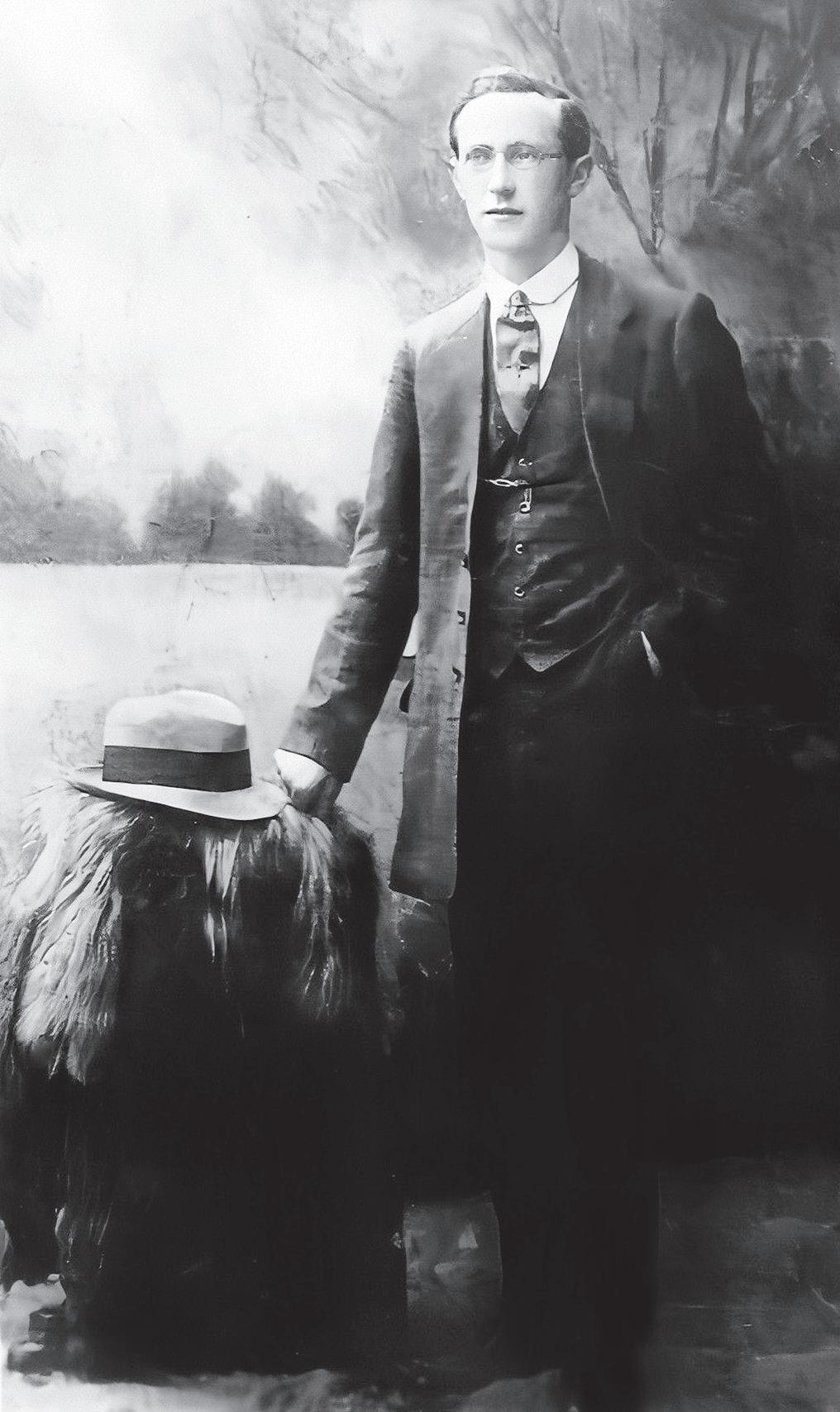
GENERAL Liam Lynch was a key figure in the fight for Irish independence and remains one of the most celebrated IRA leaders of his era. His republicanism was shaped both by his upbringing in Limerick and by the aftermath of the Easter Rising. By the time of the War of Independence, Lynch was in command of the IRA’s Cork No. 2 Brigade and masterminded some of the most important actions against British forces, such as the Fermoy arms raid and the daring kidnap of British General Cuthbert Lucas. Steadfastly opposed to the Anglo-Irish Treaty brokered and signed by Michael Collins, he regarded it as a betrayal of the Irish Republic.
Lynch accordingly became chief of staff of the IRA men who opposed the settlement. Yet he remained determined to find a compromise with former comrades, which left him little prepared for the outbreak of the Irish Civil War. Lynch would not live to see the end of the bitter conflict – he was mortally wounded following a dramatic pursuit by Free State forces across a mountain in south Tipperary – yet his controversial leadership of the IRA during the eleven-month Civil War continues to shape his legacy today. Some would add that the Civil War continues to exercise its influence on Irish politics today, 100 years later.
In this new biography, the first in nearly forty years, historian Gerard Shannon delves deep into a wide array
of archival material to create a detailed, nuanced portrait of a hugely significant and influential figure in Irish history.
As Shannon told The Irish Post: “In the dark days of March 1923 General Liam Lynch was determined to find a path forward for the Irish Republican Army.
General Liam Lynch
With the collapse of republican territory in the southwest weeks following the beginning of the Irish Civil War, Lynch had ordered his forces to resort to guerrilla tactics. By 1922, Free State government sources admitted the republicans had been successful, thereby threatening the foundation of the new state. From November, the National Army had begun the executions of republican prisoners, mostly notably, Erskine Childers. The conflict descended into a brutal, bitter affair.”
Gerard Shannon added: “Even at this critical juncture of the Civil War, Lynch was not interested in peace, mainly due to the ultimately doomed efforts he himself had pursed prior to the conflict.”


























Gerard Shannon CV

historian from Skerries in north Co. Dublin, with an MA in History from the DCU School of History and Geography. Gerard has written numerous articles and done talks on key figures of the Irish revolutionary period. He works as a civil servant in Dublin city.
Shannon believes Lynch
Shannon believes Lynch became radicalised following the events of the Easter Rising. He wrote to his brother Tom, “We have declared for an Irish Republic and will not live under any other law.”
brother Tom, “We have declared for Shannon told The Irish Post “Lynch was
tion in March 1922. But his heart was not in this bitter civil war. In September 1922, he wrote to his brother, ‘The
bones … who could have dreamt all our hopes could have been so blighted.’ In December that year, he wrote to his mother, ‘Would that tracked me down rather than
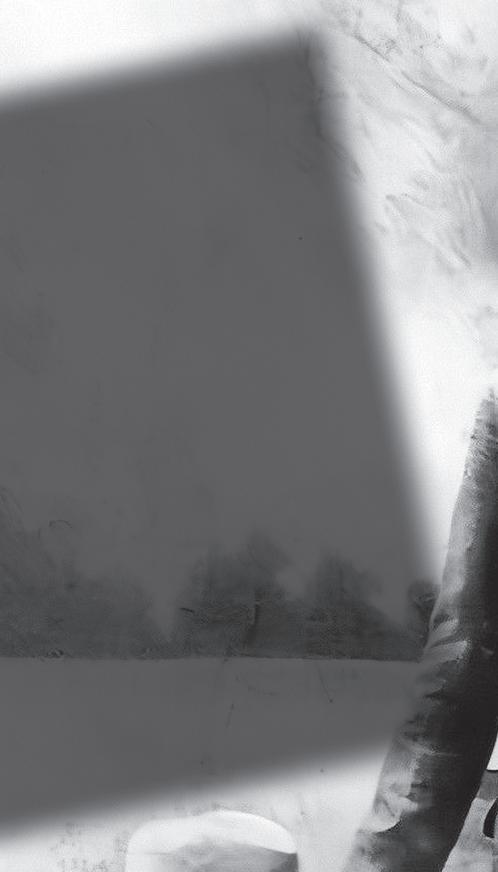
Shannon told The Irish Post “Lynch was elected chief-ofstaff at the antiTreaty IRA Convention in March 1922. But his heart was not in this bitter civil war. In September 1922, he wrote to his brother, ‘The disaster of this war is sinking to my very bones … who could have dreamt all our hopes could have been so blighted.’ In December that year, he wrote to his mother, ‘Would that England’s hounds had tracked me down rather than old comrades who had been false to their allegiance.’”
On April 10 1923, a National Army unit was seen approaching Lynch’s secret headquarters in the Knockmealdown Mountains. Lynch was in possession of important papers that he knew must not fall into enemy hands. So, along with his comrades he tried to flee. But another unit of soldiers approaching from the opposite direction. Lynch was shortly afterwards hit by rifle fire, and died in the mountains, aged only 29. The Irish Civil War was effectively ended by the shot that killed Liam Lynch. Twenty days later, his successor, Frank Aiken, gave the order to cease military operations.
Liam Lynch – To Declare A Republic by Gerard Shannon is published by Merrion Press, €19.99/£17.99.
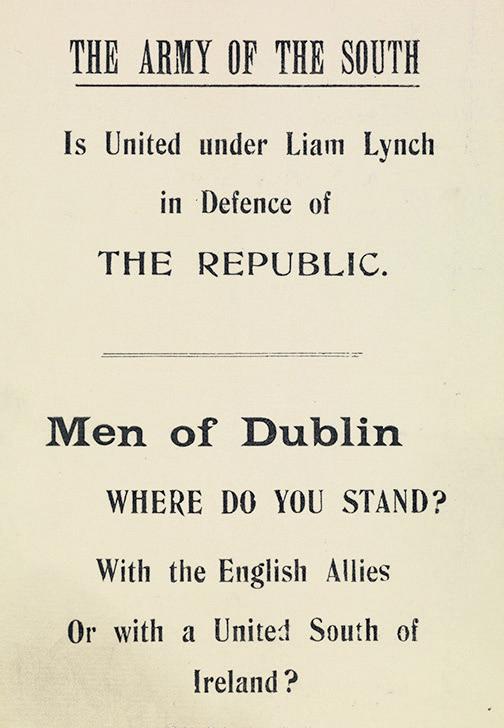
8 | April 1, 2023 The Irish Post FEATURE @theirishpost
Gerard Shannon is a
IMPOSING FIGURE: Studio photograph of Liam Lynch
Would that England’s hounds had tracked me down rather than old comrades who had been false to their allegiance
Popular Mayo pub up for sale
Fundraiser for the London Irish Centre and Hospitality Action
London-Irish based businesses, as well as Green & Fortune’s clients and supplier partners.
Joining the event were the rowers from the Spirit of Hospitality, a two-man crew of Chris Mitchell and Robbie Laidlaw who are set to row the Atlantic in December 2023 for Hospitality Action.

Monies raised from the St Patrick’s Day Event will be split between The London Irish Centre and Hospitality Action with a view to supporting and helping those in need.
THE Broken Jug pub on O’Rahilly Street, in the heart of Ballina, Co. Mayo is up for sale.
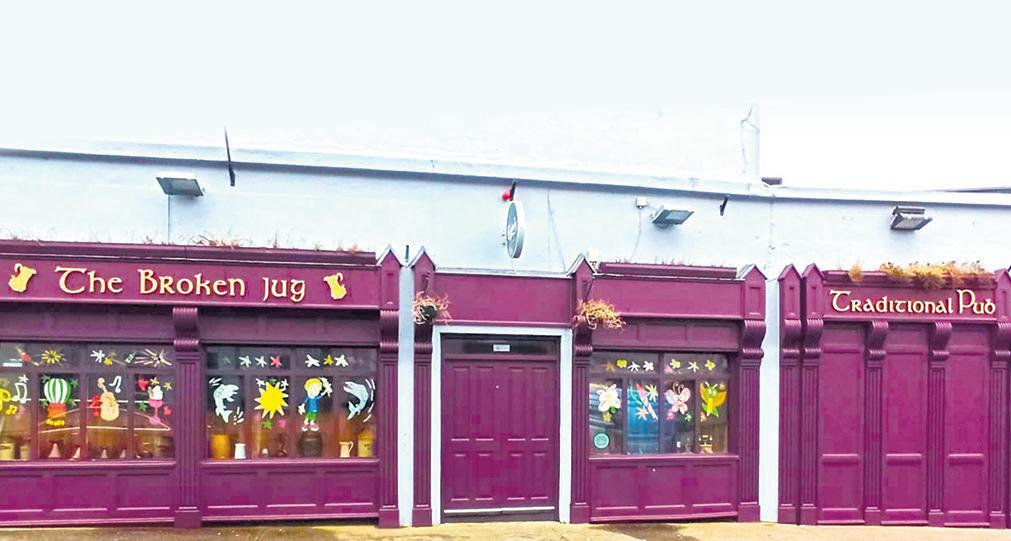
First opening in 1995, the owners are retiring, so the property and business are now on the market.
Ballina is on the River Moy, one of the best salmon-fishing rivers in Europe, at the mouth of Killala Bay in north Mayo, so anglers have long made Ballina, and the Broken Jug, a handy base.
Ballina is also situated on the Wild Atlantic Way and within easy distance of the Ox Mountain range to the east, the Nephin Beg Mountains to the west.
So overseas and local visitors make up a substantial part of the clientele.
The property runs a successful food and drinks operation, so if you’ve ever fancied retiring home to run a pub this could be your chance.
ST PATRICK’S Day marked Green & Fortune’s annual charity fundraiser. This year’s event raised the biggest ever amount since the occasion was founded in 2019.
More than 200 guests joined John Nugent, Green & Fortune’s Chief Executive, for the lunchtime celebration at
Financial sectors set to lock horns
BY MAL ROGERS
THE City of London and the British government are keen to strike an agreement with the EU for each side to fully recognise the other’s financial regulations and modus operandi. But some work remains to be done.
An agreement would help smooth certain issues and challenges faced by British financial firms since the UK voted to leave the EU. This would also impact on the Irish financial sector centred mainly in Dublin.
In February, City of London Corporation Policy Chair Catherine McGuinness met several key Irish financial services stakeholders at the European Financial Forum when the topic was discussed.
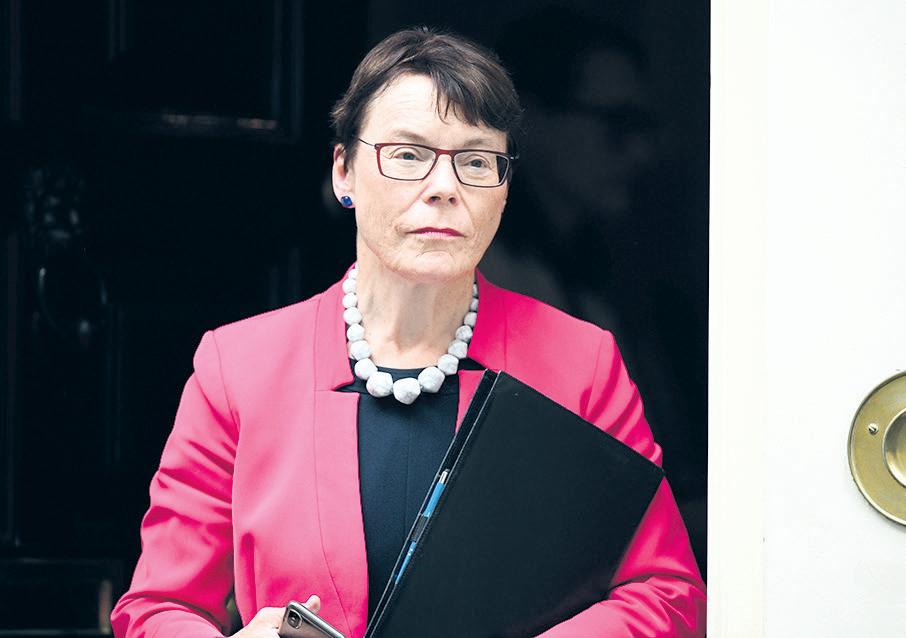
Ms McGuinness had talks with officials from the Central Bank of Ireland, the Department of Finance, KPMG (financial services body) and ESMA (a supervisory authority) among others. She discussed common regulatory objectives and the potential for strong regulatory cooperation as part of the UK-EU framework. But so far a compressive agreement has not been achieved.
According to The Irish Times, Irishborn lord mayor of the City of London Nicholas Lyons has entered the
discussions and believes that Ireland’s ever-expanding financial sector largely depends on business from London. He is reported (by The Irish Times) as saying:
“There is definitely a desire in the [UK] government to help the City be as competitive as it can. We want to do that
in a sensible and thoughtful way that enables us to rebuild relationships with the EU. But there is always another way to do things. We have not really flexed our muscles yet on regulatory change.”
It seems that some rocky negotiations still lie ahead.
King’s Place where £45,000 was raised for the London Irish Centre and Hospitality Action. The latter provides a whole range of support services to help hospitality people back on their feet again after a setback. Guests were drawn from the hospitality industry,
John Nugent, Chief Executive at Green & Fortune, comments: “A heartfelt thank you to everyone who donated and supported the day. It’s a huge date in the calendar for the whole company and for all of the guests to get behind it and for so many brands to give amazing lots and raffle prizes, it’s very humbling.”
Galway-based Nick Leeson joins financial investigators’ firm
BY GRAINNE CONROY
NICK Leeson, the former ‘rogue trader’ has joined Red Mist Market Enforcement Unit, a firm of corporate private investigators.
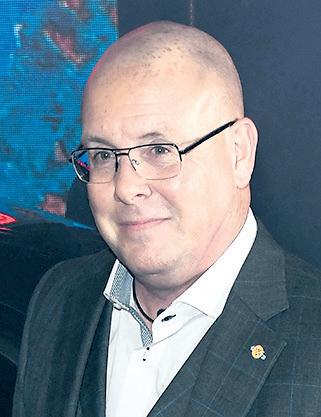
Leeson (56) is a former derivatives trader whose fraudulent, unauthorised and speculative trades resulted in the 1995 collapse of Barings Bank, the United Kingdom’s oldest merchant bank. Leeson was convicted of financial crime in a Singapore court and served over four years in Changi Prison.
After his release he eventually moved to Galway, holding several positions at League of Ireland club Galway United FC. He eventually became its CEO, a position which he has since left.
By 2010 Galway United had debts estimated to be between €35,000 and €70,000.
The club was taken over by brothers Luke and Brian Comer, from Galway, who are based in London and Monaco.
Leeson continues to live in Galway. The firm Red Mist Market Enforcement Unit that he is joining, advertises financial
investigation services to investors seeking compensation in court cases. This is according to an interview with Leeson published by Bloomberg.
According to Bloomberg, Leeson hopes his first-hand experience will help him spot the fraudsters.
The corporate intelligence firm is run by Seth Friedman, who worked as an undercover investigator for disgraced Hollywood producer Harvey Weinstein. Friedman also worked at Black Cube, a private eye firm run by former Israeli intelligence employees. He left the company in 2018. Red Mist was founded in 2021.
BUSINESS The Irish Post April 1, 2023 | 9 /theirishpost
Brexit has caused tensions between financial sectors in Dublin and the City of London. Negotiations are ongoing
ANNUAL FUNDRAISER: The Green & Fortune cheques
ON THE MARKET: A chance to live the dream with a pub of your own – The Broken Jug
TOUGH NEGOTIATOR: Catherine McGuinness, City of London Corporation Policy Chair
FORMER TRADER: Nick Leeson Picture: Getty Images
Picture: Getty Images
Gardaí investigate last year’s attack on Ian Bailey
TWO men have been questioned by gardaí following an unprovoked attack on Ian Bailey in west Cork last year.
The 64-year-old former journalist who has been arrested twice in connection with the killing of Sophie Toscan du Plantier, but never charged, has always denied any involvement in her murder. A French court sentenced him to 25 years in absentia after finding him guilty of murder in 2019. Irish authorities regarded the trial
as a sham based on hearsay evidence.
Cork Beo reports that Mr Bailey was attacked when he met a number of women who contacted him online in what is now suspected to have been a setup.
CORK
The alleged incident took place in Bantry on November 30, last year. Mr Bailey received a number of kicks to the head from a group of men. In the aftermath of the
Greenway or walkway – council


debate
incident, he described himself as “shocked and traumatised”.
Mr Bailey has received several death threats since the unsolved killing was put back in the public spotlight by Sky and Netflix documentaries.
As well as attacks and threats from those who believe he was involved in the attack on the French filmmaker, Mr Bailey is apprehensive about a possible abduction by French authorities: “I am also concerned they will try to abduct me and bring me to France.”
Traveller unwelcome to return to his home town
TRAVELLERS have warned of trouble if a serial sex attacker, considered one of the North’s most dangerous inmates, is released back into their community.
Sunday Life reports that 35-year-old Tom Ward is in line for a transfer from high-security Maghaberry jail to the Burren House
open prison in Belfast. Ward was given an indeterminate sentence for a second conviction in 2011.
The Travelling community in Coalisland, which Ward called home until he was jailed a decade ago, does
not want him back.
Members are predicting violence if he dares step foot again in the Co. Tyrone town, where his first victim lives.
A Prison Service spokesperson said: “People in our care approaching the end of their sentence will be tested prior to release back into the community.”
‘Vigilante’ to have his sentence increased
A WATERFORD councillor has expressed his concerns that plans to restore the long-idle WaterfordWexford rail line could jeopardise the potential for an international standard greenway.
WATERFORD
Waterford News & Star reports that Cllr. Donal Barry (Independent) outlined his worries at a meeting of Waterford City & County Council. It is anticipated that the All-Island Strategic Rail Review will recommend the restoration of the old WaterfordWexford line, Cllr. Barry said: “I think a Waterford to Rosslare greenway would connect us more with the European and all-important English tourism market,” said Cllr. Barry. “There are passenger boats arriving from the UK and France on a daily basis ... I think also, if you have a Waterford to Rosslare Greenway, it will make us an international greenway.” Director of Services for Economic Development with Waterford Council, Mr. Michael Quinn, said that officials in Wexford are awaiting the outcome of the rail study, and that he would assume they have given some thought to any potential impacts resulting.
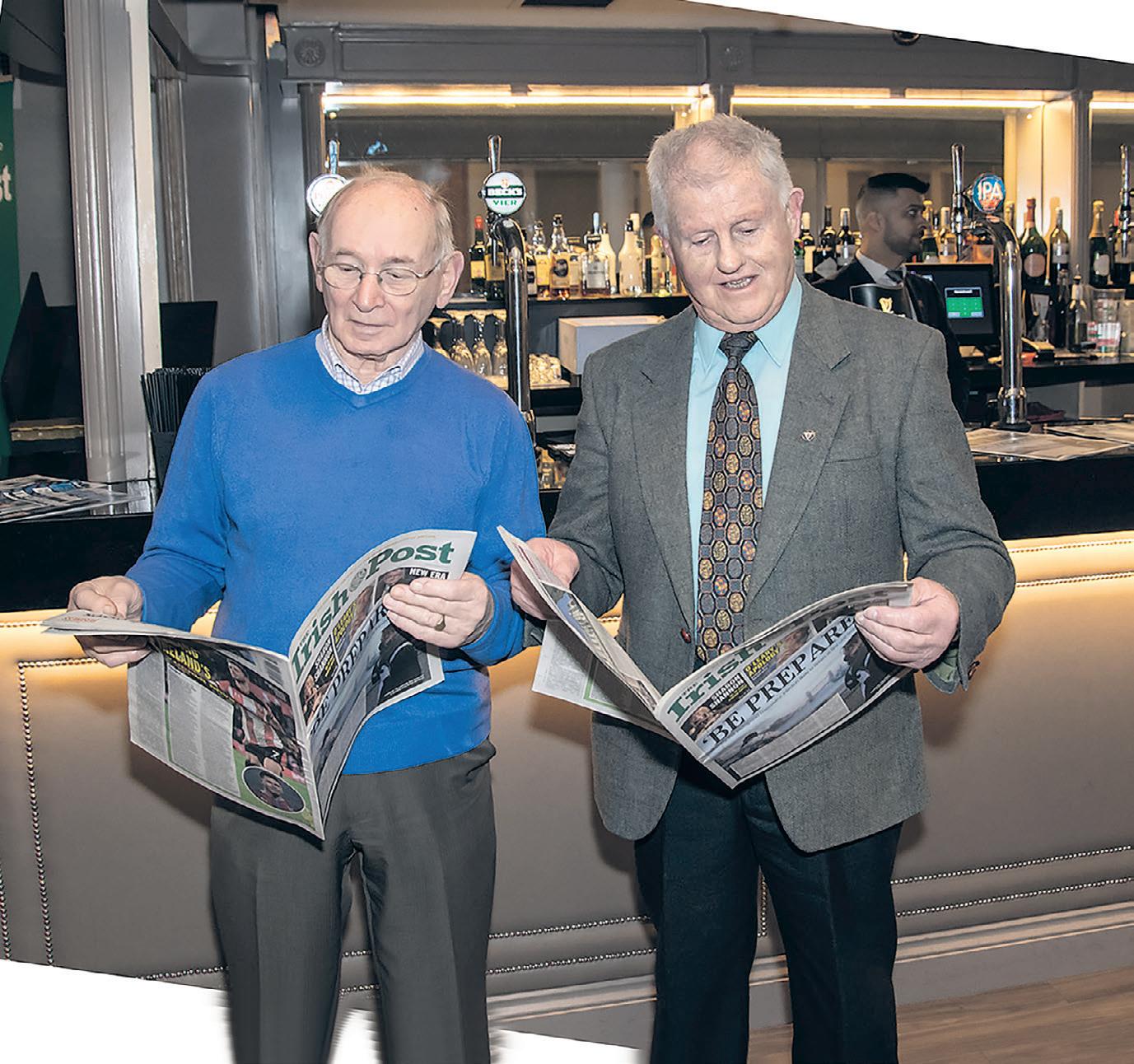
A MEMBER of a “mob” who threatened to kill a woman after a “vigilante” gang of men forced their way into her home will have his sentence increased after a successful appeal by the State.
The court was told a “forceful mob” had turned up at the house and damaged lights and windows with the victim’s “very small baby” suffering small cuts to its forehead from smashed window glass.
The Limerick Leader reports that the three-judge Court of Appeal heard that William Lyons made his way with three others into the home of a woman whose small children and partner were in the house with her at Caherconlish, Co. Limerick.
At a hearing at Limerick Circuit Criminal Court in November 2021, Lyons was sentenced to two-and-a-half years’ in jail.
At the Court of Appeal, the State successfully appealed against what they submitted was the “unduly lenient” sentence.
Monika Leech BL, for the State, submitted that trial judge Tom O’Donnell was too lenient. She maintained that the maximum sentence for burglary is 14 years and that the trial judge erred in identifying five years as the headline sentence. According to Ms Leech it “failed to reflect the seriousness of the offending” and the “physical and psychological harm done to the victim”.
10 | April 1, 2023 The Irish Post NEWS @theirishpost NEVER
Get your copy of delivered directly to your door each week Get an annual SUBSCRIPTION to The Irish Post for only: £151.50 to anywhere in the UK or £194.50 to Ireland and the rest of the world (ROW) Don’t delay, sign up today! To register or for further information contact: dara@irishpost.co.uk or call 0208 900 4223 CELEBRATING MORE THAN 50 YEARS AS THE VOICE OF THE IRISH COMMUNITY IN BRITAIN
MISS AN ISSUE
TYRONE
LIMERICK
COMMENT&OPINION
MALROGERS Hard news the easy way
Burns’ journey from Bournemouth to Belfast
Conservative) Bournemouth, Aitkenhead was intrigued by his self-aggrandising anecdotes. One after another, “purring with pleasure as he quotes praise from this or that dignitary”.

She added: “The magnificence of his self-regard, and the marvel of his misapprehension that he has managed to conceal it, is so mesmerising that at first I sit back and enjoy the show.”
A devout Brexiteer, under Boris Johnson he became a trade minister in 2019, but had to resign the following summer for abusing parliamentary privilege by trying to intimidate a member of the public involved in a financial dispute with his father.
A year later he was back, first as Johnson’s trade envoy to Canada, then as minister of state for Northern Ireland. But Johnson never made him Northern Ireland secretary – something that is reported to have been a huge disappointment to him.
Stanza extravaganza
TOURISM Ireland has come up with a handy guide pointing out land and cityscapes through the eyes of the poets who immortalised them in their work. There are homages to everyone from William Butler Yeats – whose name even sounds like a piece of poetry – to Medbh McGuckian, who has been inspired by Co. Antrim’s causeway coast. No mention, however of the beautiful bronze WB Yeats statue in Sligo, which became poetry in motion when it was knocked over in a car chase a few years ago. The statue was smashed to bits – changed utterly, in fact. The people in Sligo were warned by gardaí to tread softly in the area.
Funnily enough, I always fancied that Mrs Yeats’ boys, JB and WB had an older pedantic brother, NB Yeats, who endlessly annotated needless explanations to WB and his brother Jack B’s work. Who knows, that could have been a line of enquiry for the Sligo police.
The driver of the offending car was from Offaly, by the way, an area not often evoked in poetry. After all The Lake Isle of Innisfree rewritten as the Lake Isle of Offaly just doesn’t have the same ring to it. And if Patrick Kavanagh had written On Raglan Road as On Offaly Road, would it have attained the same level of popularity?
But gardaí seemingly ruled this out as a motive early on in their enquiries.
The Swiss not on a roll
TOBLERONE has announced they are removing the image of Switzerland’s most famous mountain the Matterhorn from their chocolate bar because the company is moving some of its production to Slovakia later this year.
‘Swissness’ legislation introduced in the country in 2017 means that companies can’t claim maximum Swissness if part of the product is made beyond Swiss borders. And that includes packaging as well.

DECCA Aitkenhead’s interview with Conor Burns MP in the Sunday Times didn’t really do him any favours. The honourable member for Bournemouth West is an unusual Tory MP: he’s gay, he’s Catholic, and he was born on the Falls Road in Belfast.
Now 50, Burns’ career path to get where he is now – he has served as a minister under two prime ministers – has taken evident talent, hard work, a certain charm, and a lot of hubris.
It is this last quality that intrigued the Sunday Times journalist
Aitkenhead said interviewing him was like a cross between Yes, Minister and The Thick of It
The magnificence of his self-regard ... is so mesmerising that at first I sit back and enjoy the show

The walls of his office are lined with framed photos, cartoons and paintings of Margaret Thatcher – he became the unlikely, and very close friend of Lady Thatcher in her declining days.
But, while acknowledging Burns’ astounding journey from nationalist Belfast to leafy, ultra-conservative (and
A towering Taoiseach
SEEING the miserable display of politicians who the British public elected to lead them – including Boris Johnson and Liz Truss – made me think fondly of the late Garret FitzGerald.
As a columnist I have a particularly fond regard for Garret, who was a contributor and columnist for the Irish Times for 57 years. Despite the onerous duties of any columnist – hard work, constantly on call, continually searching

for stories – Garret still managed to squeeze in two terms as Taoiseach of the country twice.
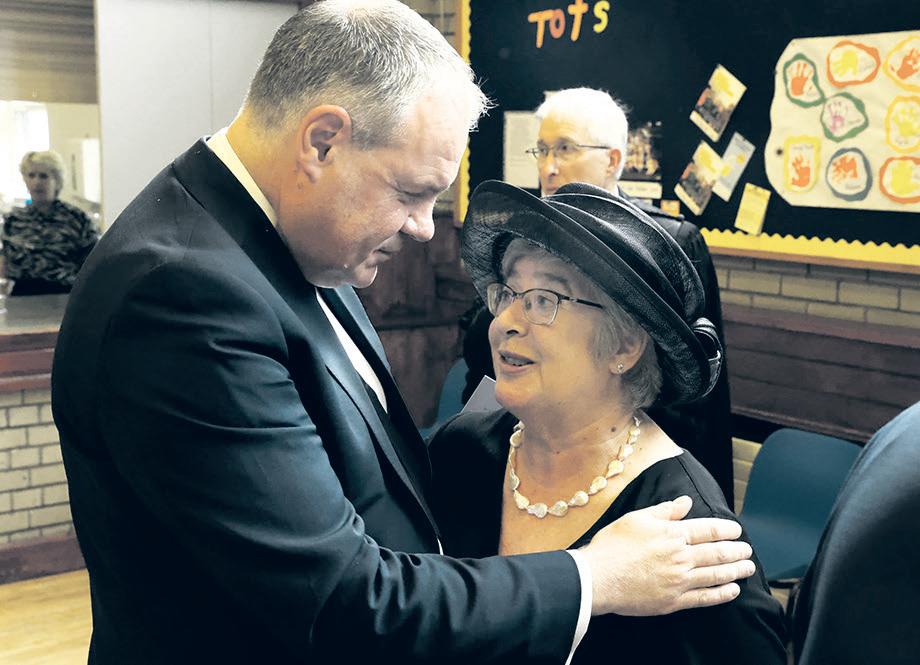
I met him once; or let’s say, I barrelled up to him and introduced myself. This was in his post-taoiseach days. He was wheeling his wife round St Stephen’s Green in Dublin in a wheelchair, dressed in somewhat shabby suit, and wearing carpet slippers. He had no entourage in tow; it was just him and his wife. I stopped and
When Liz Truss took charge last September she made him a junior minister for trade. Less than a month later she sacked him. This was due to an incident in a Birmingham hotel during the Tory Party Conference. Mr Burns was accused of being drunk and stroking a young man’s thigh.
One of the witnesses subsequently made the affair known to the party whips. The young person who was reportedly touched did not make the complaint – in fact no formal complaint was made. But Burns was suspended, although later cleared of any misconduct. However, it seems unlikely he will ever return to cabinet, and the Sunday Times article is unlikely to have made that ambition any more realistic.
told him how much I enjoyed his columns, and Garret was generous with his time. We stood there chatting about this and that, but mainly politics. But there was also a certain amount of other-wordliness to him, a slight detachment from the sturm and drang of everyday life.
I wasn’t surprised, therefore, to read subsequently in Olivia O’Leary’s fine book Politicians and Other Animals, about her being on the campaign trail with Garret and his team. They’d arrived by bus in a constituency in rural North West Cork, where a loyal Fine Gael crowd had gathered to
welcome him. A little boy came forward with a teddy bear dressed in red and white.
“That’s a nice teddy,” said Garret in his most avuncular tones. “And the colours – red and white, whose are they?”
As a party worker leaned forward to illuminate him, Garret burbled. “ Oh, I know. They’re for Solidarnosc, aren’t they? The Polish Solidarity movement, that’s what they are.”
There was a silence while the little boy pondered him. How, he was probably wondering, could a man be elected Taoiseach who didn’t recognise the Cork colours?
So that was the first national blow.
Then it was announced that Credit Suisse are in trouble. Blimey! What on earth is happening to this great chocolate superpower, this exemplary financial behemoth?
If you think you can help Switzerland in its hour of need, visit the official site www.howareyoufixedforatenner.com

The price of a ‘no-show’

INCREASINGLY more restaurants are insisting that when you book a table, you leave your card payment details
It’s not that the management fear a bout of ‘dining and dashing’, ie, exiting before you’ve paid, but because of the number of ‘no-shows’ that have been experienced over the years. And most of the hospitality business is in such a precarious situation currently, a couple of no-shows in one evening could mean the difference between profit and loss for a restaurant.
In days gone by customers would regularly fail to show up or else arrive in fewer numbers than specified on the reservation. It was known that some customers even booked a number of restaurants then on the evening decided which place suited their whim the best, and left the other places they’d booked with empty tables. So from now on many establishments are asking you to stump up – or at least leave your credit card details – up before even a amuse bouche is served.
But it’s odd, with things seeming to have gone full circle.
I remember going to the Stepaside Restaurant on the Dublin Road in Belfast with my mother, back in the 1980s. I remember her saying “My, it’s posh. You pay after you’ve eaten.”
The Irish Post April 1, 2023 | 11 /theirishpost
BELFAST MEETING: Minister Conor Burns talking to Lady Daphne Trimble at David Trimble’s funeral last year Picture: Getty Images
The
voice
of the Irish in Britain since 1970 Right move from Rishi Sunak
PRIME Minister Rishi Sunak has made positive strides towards normalising relationships with Europe in the wake of Brexit. The Westminster Framework and the Stormont Brake, which will make Northern Ireland’s trading position with regards the EU much more streamlined, will help hasten that process.
The fact that the legislation passed through the House of Commons with only 22 Tory votes against it has strengthened Prime Minister Sunak’s hand immeasurably. He is seen as a far less divisive figure than either of the two previous incumbents of No. 10 – Boris Johnson and Liz Truss – and is likely to help restore British-Irish relationships, damaged over Brexit.
The one area where Rishi Sunak could further help restore good relations between Ireland and Britain is if he scraps the controversial legacy bill. The British government’s proposal to have a statute of limitations on all prosecutions, legacy inquests and civil actions for Troubles-related killings has the backing of no parties in Northern Ireland, probably a unique occurrence.
Across the political and religious divide, all of the Stormont parties are united against the British plan. The UN came out firmly against the legislation, as the EU has done in the past.
The catalyst for this idea was widely seen as pressure on Boris Johnson from diehard Conservatives in his own party and the right wing media in the UK to put an end to the prosecution of British soldiers in the courts – no matter what crimes they are suspected of.
But unionists in Northern Ireland point out that such an amnesty would include those suspected of terrorist outrages that went unpunished.
Now a group of international lawyers has called for the British for the bill to be scrapped.
A delegation from the European Association of Lawyers for Democracy & World Human Rights (ELDH) said they were ‘disturbed’ by the ramifications of the bill following a visit to Northern Ireland.
They have now joined the Council of Europe’s Commissioner for Human Rights in calling for Britain to withdraw the bill.
It really is a win-win situation for Prime Minister Sunak if he does just that, and withdraws the legislation. It will foster good relations with Northern Ireland, Ireland, the EU and the international community.
Conversely, should the law pass and be enacted, it will not help restart the democratic process in the North, will fracture relations with the Republic and heap international opprobrium on Britain once again.
Prime Minster Sunak, with his new found authority over the Conservative Party, should act now and withdraw the bill.
Dishonouring democracy
IT perplexes me that Boris Johnson’s full title is The Right Honourable Boris Johnson when, for the most part, he has hardly ever done anything honourable.

I was delighted to see that his fellow MPs almost eviscerated him at the Commons Select Committee enquiry.
But I was even gladder to see that in the parliamentary vote on the so-called Stormont Brake, an addendum to the Westminster Framework which was an addendum to the Northern Ireland Protocol (if I’ve got that right) that only 29 MPs voted against it.
Johnson was, of course, against it.
The DUP of course voted against it too. Fair enough. That’s their raison d’etre, to oppose any progress. And you could almost admire the integrity of their negativity if it wasn’t so injurious to a return to normal democracy in the North.
But the other 22 votes against the Stromont Brake were Conservatives, and they included that dreadful duo, the disgraced and disgraceful former prime ministers of Britain, Johnson and Truss.
They also included a former Tory leader who didn’t make it to No. 10, Iain Duncan Smith. That these three so-called grandees could only muster 19 of their Tory colleagues into the ‘no’ lobby along with them says a lot.
More than 300 Tory MPs voted for the legislation, and the Labour party rowed in as well.
Hopefully this resounding vote finally puts paid to the dreadful malign influence of Johnson, and indeed Truss – neither of whom cared one fig for the fate of Northern Ireland, and probably only ever cared about themselves.
And why either of them should ever be referred to as ‘Honourable’ is completely beyond me.
Rowan Kincaid London N7
Passport rights
I WAS interested in the response to Gerry Molumby’s letter about a presidential vote for the diaspora and the follow-up, last week, from Dan McIntyre. Dan pointed out that one of the biggest stumbling blocks to giving a vote to the diaspora is the huge range of people who would be allowed to vote if the criterion was Irish citizenship.
Everybody from Tony Blair’s children to Iain Duncan Smith MP, and from far-right activist Tommy Robinson to anyone with an Irish-born grandparent could qualify for an Irish passport.
Perhaps the point here is: it’s too easy to get an Irish passport.
For instance it’s not nearly as easy to get an Italian passport. One website says: “The fact you have Italian grandparents, or Italian great-grandparents, is not enough. It doesn’t automatically entitle you to claim “Dual Italian Citizenship through Descents” according to one legal adviser.
This, of course is quite different from getting an Irish passport where all you need is one grandparent born on the island, and it doesn’t matter if they’ve ever renounced their Irish citizenship (as they may have had to in order to get citizenship in certain countries).
To get US citizenship by ancestry, their website says: “Applicants 18 years old and over, born outside the United States, may claim U.S. citizenship from a parent who at the time of the applicant’s birth was a United States citizen... U.S. citizenship does not pass directly from a grandparent to a grandchild.”
For Poland, a quick look at any enabling site will take you through multiple questions as to your Polish heritage. For instance: “Please refine your grandmother’s line: is it mother>>Grandmother>>Greatgrandmother. . . “ and so on.
A French friend has told me the qualification for a French passport is a parent. But according to him, it is not a
straightforward process.
The point of the matter is that it is, largely speaking, it is fairly easy and straightforward.to get an Irish passport.
So maybe that should be tightened up. There are several ways that could be done, to at least get rid of the outliers qualify for an Irish passport through the flimsiest of connections with the country.
Perhaps then, Gerry Molumby’s dream of allowing the Irish diaspora to vote in Irish elections could come to pass.
J. McMahon London N1
The end of an era
I LIVE in the northeast of England, and I note that a local bookshop has just closed down.
I am sorry, but sadly, I have to say I am not surprised.
I would probably be a target audience for such a shop (retired, with plenty of leisure time) but I just would not be able to afford more than one book a month (or thereabouts) given that books in bookshops usually start at the £10 mark.
It makes me wonder if the slow and sad demise of the traditional bookshop is now well underway.
Kindle books are around a fiver (sometimes less) and you can pick up a paperback on the
internet for a pound. Goodness knows what alternative economic strategy these businesses operate that can allow them to sell a book for a pound. But that’s what the traditional bookshop is up against. Then there are audiobooks which I’m told are good value, although I’m not a fan of that medium.
I don’t welcome this shift, but can understand why it has happened. I love the atmosphere in a good bookshop, but I guess that ‘progress’ has sounded the death knell of these shops.
I suppose that’s progress.
Sinead Brandt Haltwhistle
Ruck & roll
WELL, nobody said it would be easy.
A wounded opponent is a dangerous one, and the English showed that even with a man down they were game for a battle.
Both on the pitch and behind the scenes the Irish team did indeed “answer Ireland’s call” and their massive achievement has given a lift to the whole country at a time when misery seems to be the order of the day worldwide.
As my dear old Dad used to say: “Come on ye boys ye!!!”
Mike O’Hara Birchington, Kent
12 | April 1, 2023 The Irish Post COMMENT/LETTERS @theirishpost
Published weekly by: Color Company™ Ltd, 1 Curzon Street, London, W1J 5HD Telephone: 020 8900 4193 e-mail: editor@irishpost.co.uk Internet: www.irishpost.com
Write to: Letters page, The Irish Post,
Street,
E-mail
on: editor@irishpost.co.uk The
FACING QUESTIONS: Former prime minister Boris Johnson en route to answer Partygate allegations
88 Fenchurch
London EC3M 4BY.
us
Editor reserves the right to edit all letters as applicable. Please keep your letters as brief as possible. The opinions expressed do not necessarily reflect those of The Irish Post.
The forum of the Irish in Britain
Picture: Getty Images
COMMENT&OPINION
Vol. 53. No. 13. The Irish Post 27a Poland Street London W1F 8QW
Tel: 020 8900 4159 www.irishpost.com
EDITORIAL
Editor: Mal Rogers
Tel: 020 8900 4329 Mal.rogers@irishpost.co.uk
Reporters:
Conor O’Donoghue Conor.o’donoghue@irishpost. co.uk
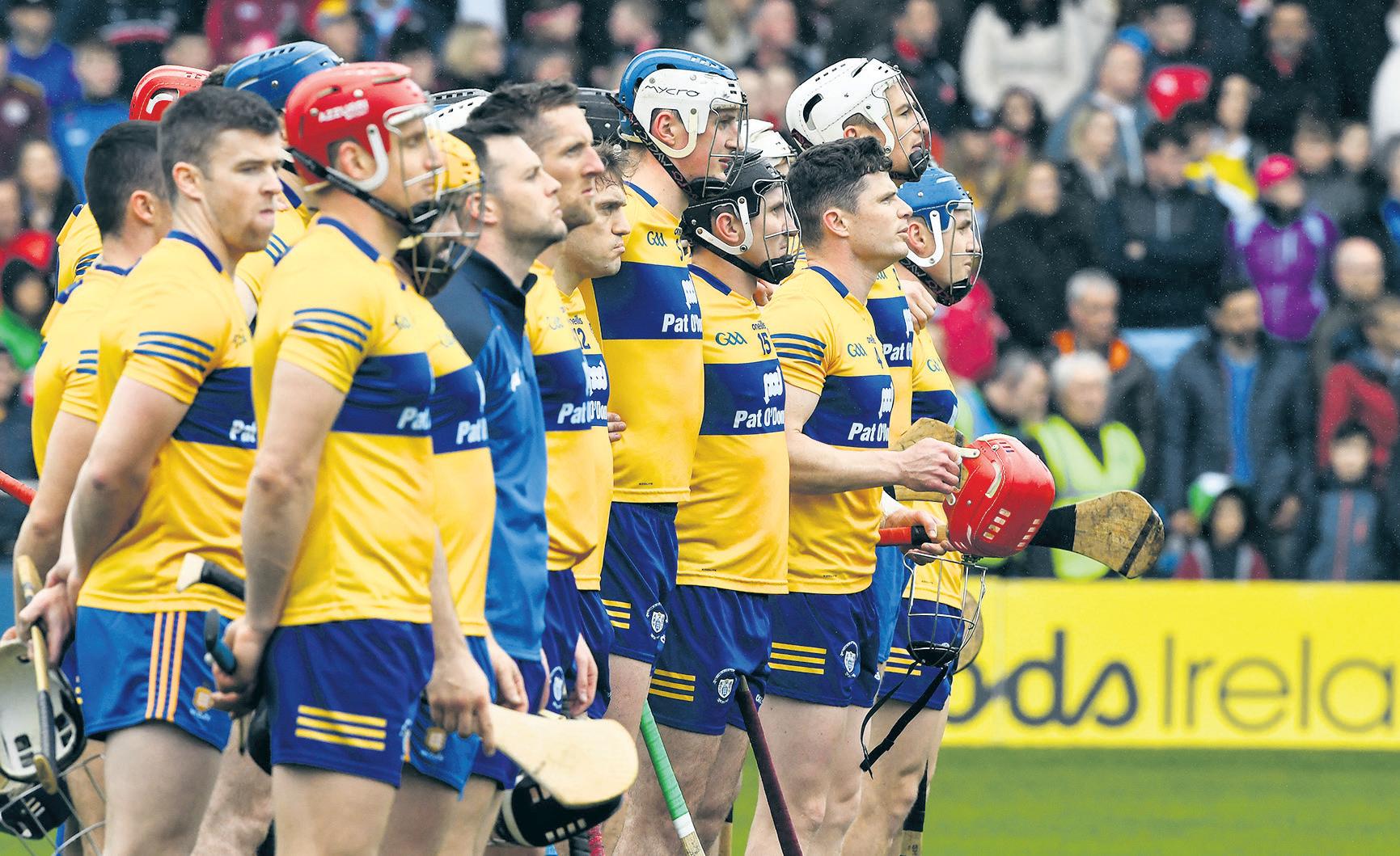
ADVERTISEMENTS
Commercial /advertising enquiries: Tel: 020 8900 4195 advertising@irishpost.co.uk
Untangling patriotism from jingoism
WHAT I always remember is the national anthem.
Registered at the Post Office as a newspaper. The Irish Post is published every Wednesday by Color Company (TM) Ltd.
The newspaper seeks to provide the Irish in Britain with comprehensive news coverage of Irish issues from Ireland and Britain, sports news and reviews, a weekly entertainment guide, reader feedback and features of interest to the Irish in Britain.
©2009 ISSN No. 0959-3748. The Irish Post Ltd. All rights reserved. No part of this publication may be reproduced, stored in a retrieval system or transmitted in any form or by any means electronic, mechanical photocopying, recording or otherwise without prior permission of the publishers. Newsagent distribution and printing by Trinity Mirror Printing Limited whose registered office is at One Canada Square, Canary Wharf, London, E14 5AP.
The tradition in Irish social clubs in England was that a night of dancing, where there was a band present, would always end with the national anthem, The Soldier’s Song. The first drum beats of Amhrán na bhFiann would begin and the chairs would be pushed back. The entire room would come to attention. Fathers, mothers, children. Those who’d left Ireland in their thousands and their families. The city outside an English one but the room inside an Irish one. This wasn’t nationalism. This wasn’t even patriotism. This wasn’t some kind of Irish chauvinism wrapped in a cheap tricolour.
Increasingly, the older I get, I can’t help but see nationalism as an ugly thing, a negative thing, a hateful thing. Not so much an innocent love of where you’re from but, more, a disdain of where you’re not from.
Nationalism as a snarling thing. A mean and spiteful
JOEHORGAN
Increasingly, the older I get, I can’t help but see nationalism as an ugly thing, a negative thing, a hateful thing. Not so much an innocent love of where you’re from but, more, a disdain of where you’re not from
thing. This room of people standing to attention for the national anthem was not like this. This was more of a statement. A quiet, dignified statement. There was pride there, for sure, Irishness and an open celebration of it. But this was birthplace not as empty
achievement but as insistence. A stubborn insistence on being who they were from a generation abandoned. From a generation forced to be Irish outside of Ireland. The immigrant Irish.
I was chatting with a group of people recently who are all aged around their late sixties, early seventies. They are all from this part of rural Ireland where I live. There were five of them. It came up in conversation that every one of them had a sister or brother living abroad. It hadn’t really struck me before. This is an area that is now celebrated for its natural beauty. But, as they say around here, you can’t eat scenery. It has historically been a depopulated area because so many left. It has historically been an attractive option for alternative lifestyle
searchers from across Europe because abandoned properties abounded. It has a largely unchanged landscape because there was no one around to change it. And beyond all of the picturesque beauty and the colourful life of the newcomers lay this story of emigration.
There’s a remote area where I often go walking. I’ve been going there since I was a kid. It sweeps down to the sea and there is a spot I can sit where it is just me and the Atlantic, the odd seal, and a couple of tumbling, joyful choughs. Its special and I’m lucky to keep finding it. Yet, I always notice the old potato drills and wander did they save them or not. I’m always aware of those who tried to eke an existence out of this place. Those five people reminded me that this story of people gone is not lost in the distant past. There are people around me, people I might pass in the street say, or nod hello to in the pub, whose lives are shaped by this story. This story of Ireland and emigration.
What it also reinforces in me is the belief that the Irish lives that started here didn’t end when they left here. They took their Irishness with them. They stayed Irish. They insisted on it. Which makes the closed idea of flag waving nationalism all the more nonsensical. All that spiteful fury over something that makes no sense.
For Irishness, by its very nature, is not confined by the parameters of the nation. It is a human thing. A real thing. Not something that exists behind a megaphone or at the end of flag or behind the keyboards of a twitter account.
Each one of those people had a sister or brother in London or New York. In Birmingham or Boston. That is what being Irish has meant for so long. That is what being Irish means.
Nationalism denies that. It portrays the nation as some insular, settled, unchanging thing and nothing could be further from the truth. It is so often so true that those who talk most about being Irish are those who know least about what it means.
Nationalism? It’s just a kind of civil war, isn’t it? Hating so much of what you purport to love. I’ll always stand for The Soldier’s Song, though, just so in my mind at least I’m always standing with those in that social club. The Irish outside of Ireland.
n Joe Horgan tweets at @JoeHorganwriter
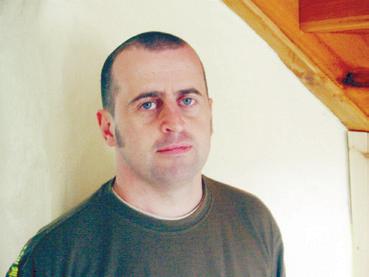
The Irish Post April 1, 2023 | 13
UNIFYING SONG: Standing for the national anthem at the Munster hurling championships
Picture: Getty Images
Flann the Man
MAL ROGERS looks back on the career of an often overlooked yet highly influential writer, Flann O’Brien
A date with history
What happened on this day...
Friday, April 1:
1716 – The first Doggett Coat and Badge sculling race on the Thames, one of the oldest sporting fixtures in the British sporting calendar, founded by Thomas Doggett, an Irish actor and theatre manager.
1935 – Death of Francis Arthur Fahy from Kinvara, Co. Galway, who wrote Galway Bay. 1966 – Death of writer Brian O’Nolan a.k.a. Flann O’Brien and Myles na gCopaleen.
Saturday, April 2:
1902 – Premiere of Yeats’ Cathleen ni Houlihan starring Maud Gonne.
1925 – The Dublin Metropolitan Police Force (DMP) is amalgamated with the Garda Siochana.
1958 – Death of Willie Patrick Maley, from
Newry, Co Down. One of the most successful mangers in Scottish football history, he guided Celtic to 30 major trophies in 43 years. He is simply known as the Man Who Made Celtic.
1972 – Radio na Gaeltacht goes on the air for the first time.
Sunday, April 3:
1846 – Death of Michael Moran, aka Zozimus, balladeer and storyteller.
1798 – Birth of John Banim, novelist, poet and playwright, in Kilkenny.
1916 – Padraig Pearse orders 3-day ‘manoeuvres’ of Irish Volunteers for Easter Sunday.
Monday, April 4:
1774 – Death of Oliver Goldsmith.
FLANN O’Brien was born Brian O’Nolan at 17 Bowling Green Square, Strabane, Co. Tyrone, one of twelve children. He was a native Irish speaker, something that shows in much of his writing.
Outstandingly intelligent, he could write with equal fluency in English and Irish – he could also read Latin and Greek. The fact that he was a native Irish speaker does come through in his writing.
The dullness of his civil service job probably didn’t suit his irrepressible nature – his writing was undoubtedly an escape for him
O’Nolan / O’Brien / Brother Barnabas / Brian Ó Nualláin/ (he had many pennames and iterations of his real name) worked as a civil servant in the capital for eighteen years. As Myles na GCopaleen (another pen name) he was the author of An Béal Bocht, The Poor Mouth, and the legendary column in The Irish Times, Cruiskeen Lawn
One of Myles’ great characters is The Brother, the man who was an expert on everything from war to landladies’ rheumatism.
The dullness of his civil service job probably didn’t suit his irrepressible nature – his writing was undoubtedly an escape for him.
In the column he would comment on the developments of the day, such as the rambling cerebral discussions of the Dublin Institute for Advanced Studies set up by Eamon de Valera. This body included some of Ireland’s finest thinkers, plus several eminent Jewish and Eastern European philosophers who had fled wartime Europe and settled in Ireland.
As an example, the topic of Ireland’s national saint was discussed in the most erudite terms.
The philosophers finally came to a rather startling conclusion – that there
1914 – Cumann na mBan, the women’s auxiliary to the Irish Volunteers, is founded. 1994 – Riverdance appears in public for the very first time at the Eurovision Song Contest in Dublin.
Birthdays: Novelist and journalist Mary Kenny, 67, Paddy Hopkirk, international rally driver, 78, and Twink (Adele King), singer and actress, 60.
Tuesday, April 5:
1855 – Completion of the Dublin to Belfast railway line.
1961 – Death of Oscar-winning Irish actor of stage and screen Barry Fitzgerald.
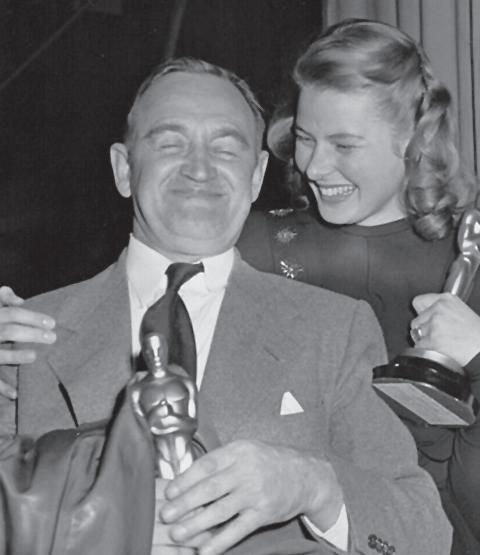
1962 – Guinness formally adopts the harp as its symbol.
1974 – Merrion Square is formally handed over to Dublin Corporation by the Archbishop of Dublin to become a public park.
Wednesday, April 6:
1862 – Death of Clare-born Fitz-James O’Brien. His psychologically penetrating tales of pseudo-science are regarded as the forerunner of modern science fiction.
might have been two patron saints with the same name. As Flann O’Brien put, it was the Dublin Institute’s singular achievement to prove that there was no God but two St Patricks.
At Swim-Two-Birds, his first novel, appeared in 1939 and was lauded by James Joyce, Graham Greene and Dylan Thomas.
O’Brien could be considered as having written post-modernist novels before there were even modernist novels. In this he was in the same mode as fellow Irishmen Laurence Sterne (writer of Tristram Shandy) and James Joyce who both changed the way we viewed novels. O’Brien also deserves to stand beside the man who brought absurdism to an artform, Samuel Beckett, His second book The Third Policeman, O’Brien’s diabolical vision of the afterlife, was rejected by his publisher; the first novel, despite now being critically acclaimed, had only sold 240 copies.
O’Brien seems to have made few efforts to find an alternative publisher. Instead he consigned the manuscript to a drawer, and made up fantastical stories about how he’d lost the manuscript. One version had him describing a journey by car though Donegal when unnoticed the boot flew open, and the manuscript flew out of the car page by page to be strewn across the Donegal countryside.
For many years Flann O’Brien wrote no more fiction in English, languishing as a cult figure in a city then regarded, astonishingly enough, as a backwater.
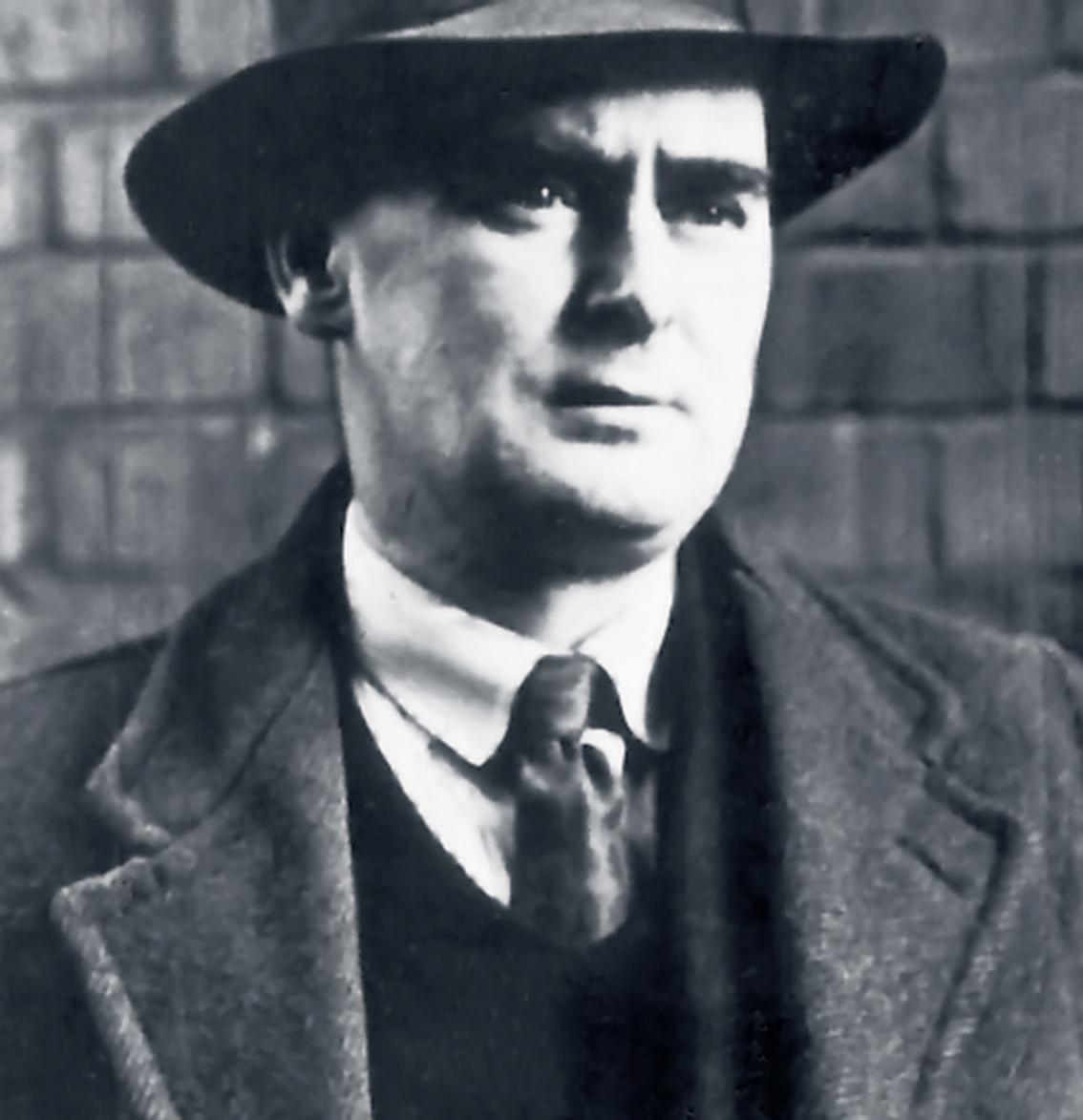
The Third Policeman has since been acknowledged as one of the most important novels to come out of Ireland in the 20th century. But by the time it was discovered and acclaimed, Flann was drinking heavily and in poor health.
Ironically, almost, his memorable lines on the recuperative effects of alcohol during hard times are probably amongst the most quoted in the whole canon of Irish poetry:
“When money’s tight and hard to get,

And your horse is also ran
And all you have is a heap of debt
A pint of plain is your only man.”
Flann O’Brien died of cancer in 1966, aged only 54. But even in his death, he managed a theatrical twist. He passed away on April Fool’s Day.
1917 – Government issued an edict banning all parades or processions between April 8 and Easter Sunday April 15. Despite this, 20,000 people gathered outside the GPO in Dublin and unfurled the new Irish tricolour. 1962 – The Miami showband were formed.
14 | April 1, 2023 The Irish Post FEATURE @theirishpost
OUTSTANDINGLY INTELLIGENT: Flann O’Brien Picture: Wikipedia
Barry Fitzgerald with Ingrid Bergman at the 1945 Academy Awards Picture: Public domain
Paisley, the political phenomenon

FROM firebrand preacher to First Minister, a new three-part series for BBC Northern Ireland charts the journey of Ian Paisley, a defining and divisive figure in Northern Ireland’s recent history.
The House Of Paisley follows the life of Ian Paisley snr with insights from journalists past and present, as well as political allies and opponents. It explores the many twists and turns of his political career from his opposition to progressive unionism in the 1960s to
ultimately sharing power with Sinn Féin in 2007.
The series looks at the intertwined role of faith and politics in shaping his outlook, personality and influence on Northern Ireland society. It describes his role in the establishment of the Free Presbyterian Church when he was in his mid-20s and the development of the Democratic Unionist Party, which he led from 1971-2008.
This series examines Ian Paisley’s career from a variety of viewpoints. It seeks to
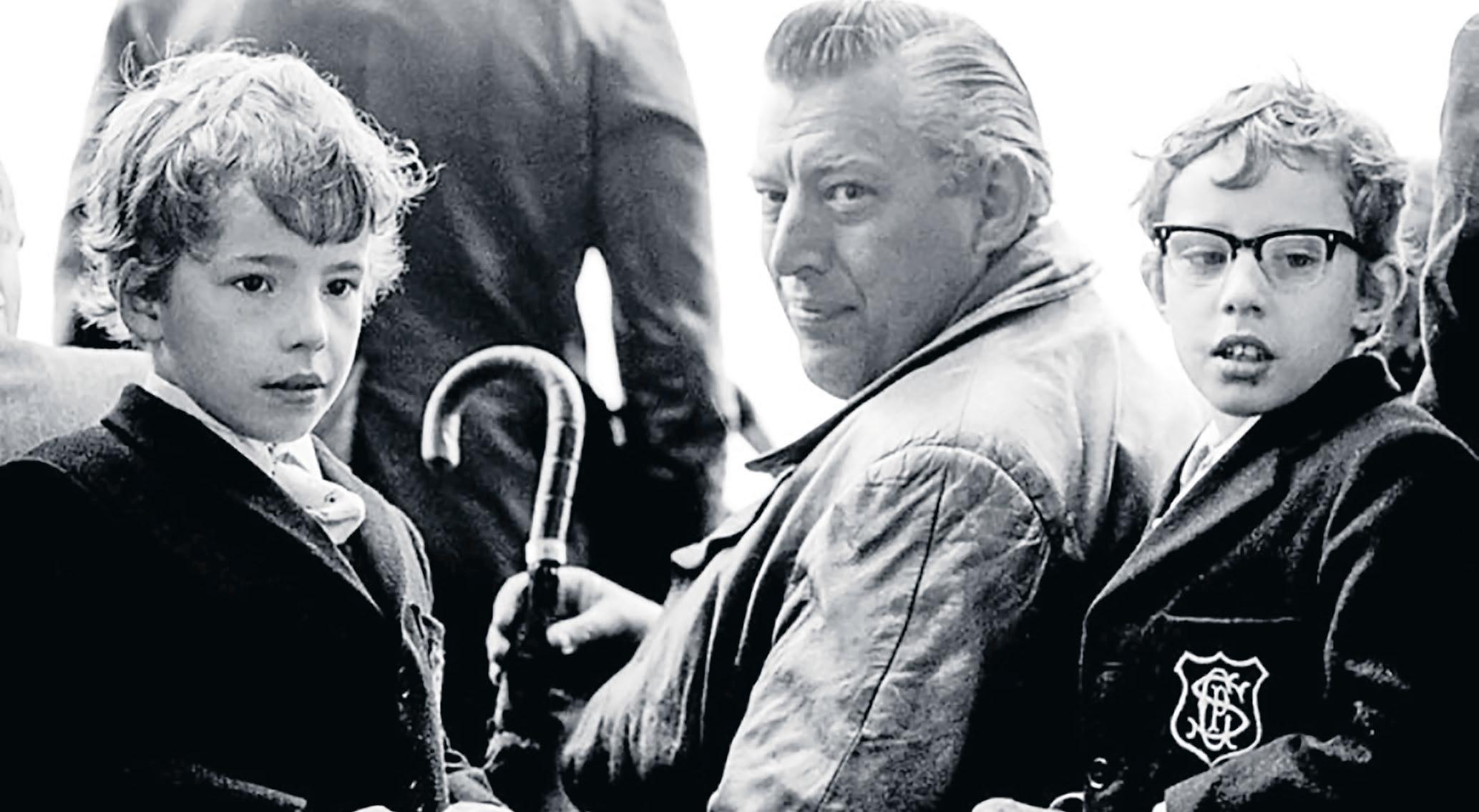
Poetic licence to discover Ireland
TOURISM Ireland has come up with a handy guide pointing out land and cityscapes through the eyes of the poets who immortalised them in their work. The stanza extravaganza includes homages to some of the county’s greatest wordsmiths.
William Butler Yeats: Yeats, whose name even sounds like a piece of poetry, is one of the giants of Irish literature, and won a Nobel prize to prove it.
He drew inspiration from Co. Sligo, on the Wild Atlantic Way, which he called The Land of Heart’s Desire.
Seamus Heaney: You can immerse yourself in the work of Seamus Heaney, the most widely published poet in the English language, at the Heaney Homeplace in Bellaghy, Co. Derry, where the poet was born.
Patrick Kavanagh: The quiet Monaghan landscape that inspired
explain why he became a significant figure in local politics, his appeal within unionism and political legacy. And it gives us a sense of the person behind the headlines, including from those who were close to Ian Paisley at critical junctures in his life.
The House Of Paisley is a critical reassessment of the former First Minister. It combines archive footage and interviews to shed new light on a life that was long characterised by controversy and concluded
Patrick Kavanagh has changed little since he wrote his best-loved poems Inniskeen Road and On Raglan Road. Follow the Kavanagh Trail to see sites referenced in his work and visit the Patrick Kavanagh Centre to delve into his life and poetry.
Oscar Wilde: Oscar Wilde is celebrated in Dublin with a statue made from semi-precious stones that reclines in Merrion Square.
It is one of the city’s 10 Talking Statues, each bearing a plaque with a QR code that can be scanned with a mobile phone.
After scanning Wilde’s code your




with Ian Paisley’s personal and political relationship with Martin McGuinness.
The House Of Paisley was made for BBC Northern Ireland by Walk On Air Films, with support from Northern Ireland Screen. It starts on Monday April 3, at 10.40pm on BBC One NI. This is available throughout Britain by selecting the Northern Ireland location preference.
The full series will be available on BBC iPlayer
phone will ring and you will get the chance to hear an entertaining excerpt of his work read by actor Andrew Scott.
Medbh McGuckian: The dramatic landscape of Co. Antrim’s Causeway Coast features in the critically acclaimed work of Belfast poet Medbh McGuckian. Her collections of poems, such as On Ballycastle Beach and The Currach Requires No Harbours, capture the “athletic anatomy of waves” and “infinite racy stir of water”.
Nuala Ní Dhomhnaill: The Irish
language poet Nuala Ní Dhomhnaill has been greatly inspired by the landscape of Co. Kerry. Her poetry is infused with ancient myths, and she calls out the “otherworldly power” of Mount Brandon.
Eavan Boland: Dublin is celebrated in the work of Eavan Boland, who uses photographs alongside her words to paint a portrait of her home city and its surrounds.
Dun Laoghaire harbour, the Huguenot graveyard on Merrion Row, and the Doll’s Museum are all places that feature in her work.
ENTERTAINMENT & LIFESTYLE | April 1, 2023 | www.irishpost.com
ALL HAIL HOZIER
FIREBRAND FATHER: The late Ian Paisley with his twin sons Ian and Kyle Picture: Victor Patterson
The Take Me to Church singer is back with a new album Page 20
Irish radio in your area...
BEDFORDSHIRE
Jim Carway presents Luton Irish Live on Diverse 102.8FM and online every Tuesday evening 6-8pm. Contact Jim on 07977 063233.

BRADFORD
Joe Sheeran presents Echoes of Ireland on Bradford Community Broadcasting 106.6FM every Sunday at noon. The programme is repeated on Mondays at 9am and Wednesdays at noon and is online at www.bcbradio.co.uk.
BRIGHTON
Brighton and Hove weekly Irish radio airs live on Mondays from 8pm on Radio Reverb, 97.2 FM, DAB and online.
COVENTRY
Hands Across the Waters on Hillz FM. Broadcasting live every Monday and Thursday 1pm-2pm and the best of Irish & Country every Sunday 1pm-2pm. You can tune in locally on 98.6fm or catch us online at www.hillzfm.co.uk
Join The Four Country Road Show with Colm Nugent and Michael Gallagher every Tuesday 9-10pm and Sunday 2-4pm. Broadcasting live in Coventry from the studios of Radio Plus 101.5fm and online around the world on www.radioplus.org.uk playing the very best in Irish and Country music, news, guests and more.
GLASGOW
Celtic Music Radio on 1530AM and www.celticmusicradio.net featuring Paddy Callaghan’s Trad with Pad every Tuesday from 6-7pm.
HERTFORDSHIRE
Radio Verulam 92.6FM and online at www.radioverulam.com
featuring The Emerald Hour with Kathy Weston, Lydia El-Khouri and Shane every Thursday from 7-8pm, and John Devine’s Traditional Irish Music Show, featuring Joe Giltrap, every Monday from 7-9pm (available on the website for seven days after broadcast)

John Devine, Monday evenings from 7-9pm on Radio Verulam in West Hertfordshire 92.6FM or through the internet at www. radioverulam.com. Facebook www.facebook.com/rvirishmusic.
LONDON/SOUTH-EAST
Johnny Jameson hosts Ireland’s Eye on Resonance 104.4FM every third Wednesday of every month, 8-9pm and repeated the following morning at 10pm.
Emily Horgan, Pippa T and Róisín O Rourke broadcasting What’s the Craic? every Tuesday from 7-8pm on West London’s ONFM 101.4.
Johno’s Irish Hour, ONFM 101.4, every Saturday morning from 10-11am with presenter John O’Sullivan. Anything and everything Irish including traditional Irish music, news and sport.

MANCHESTER
Out and About in Manchester with Martin Logan, Wednesdays 7-9pm on 96.9FM.
The Irish Connection Show with John Lowry on Wythenshawe 97.2FM, Saturday from 10am to noon. www.wfmradio.org.
MIDLANDS
Bob Brolly’s Irish Show, Sundays 4-7pm on BBC Radio WM 95.6FM and DAB Radio.

NEWCASTLE-UPON-TYNE
Jim Bennett, Fiona Clelland and Tommy McClements present NE1 Irish from 5-7pm every Wednesday on 102.5FM or www.ne1fm.net. Text NE1 + message to 60300. Contact 0191 261 0384.
OXFORD/BERKSHIRE
BBC Radio Oxford/BBC Radio Berkshire hosts Henry Wymbs’ Irish Eye, Sundays from 2pm on 95.4FM | 104.1FM.
ONLINE
Gerry Byrne’s Irish Radio: www.irishradio.org 24/7 non-stop Irish Music. Live weekdays 1-3pm; Saturdays & Sundays 11am-1pm. Podcasts uploaded to website immediately after shows are transmitted. Requests welcome to: gerry@irishradio.org. For music, arts, charity sector, commerce and current affairs interviews search YouTube Irish Radio with Gerry Byrne.
Mid West Radio, the home of Irish music, chat, news, culture and gossip 24 hours a day! www.midwestradio.ie

RTÉ Radio operates four primary national stations — RTÉ Radio 1, RTÉ 2fm, RTÉ lyric fm and RTÉ Raidió na Gaeltachta — and seven exclusively digital stations — RTÉ Radio 1 Xtra, RTÉ Choice, RTÉ Pulse, RTÉ Chill, RTÉ Gold, RTÉ 2XM and RTÉ Junior, available online.
Alan O’Leary of Copperplate presents two hours of Irish traditional and folk music every Sunday at 8-9.30pm (repeated Wednesday 8-90pm) on www.liveireland.com — 24/7 live Irish trad and folk. It can also be heard 24/7 on Mixcloud, Soundcloud and Podomatic.
All Folked Up – a folk show with an Irish influence – is broadcast on the third Thursday of the month on sarumradio.com at 7pm.
Irish Country Music Radio (Limerick) – Broadcasting live and recorded programmes 24 hours a day covering a broad spectrum of Irish music: www.irishcountrymusicradio.com.
THE IRISH IN THE UK TV SHOW
www.theirishintheuktv.com
Join Martin each week as he meets the community around the UK with an Irish connection
Every Thursday evening at 7.30pm
Repeated Sat at 8.30pm and Tues at 1pm
Sky 186 Freesat 161


Martin Logan 07808 573142
martinloganmanchester@gmail.com
Sponsored by




Look out, here comes Hozier
OUT AND
ABOUT MANCHESTER RADIO SHOW
96.9 ALL FM Wednesday, 7-9PM with MARTIN LOGAN

T: 0161 248 6767 | M: 07706 682622
E: outandaboutmanchesterradio@yahoo.co.uk
ALMOST ten years ago, this writer sat down opposite a tall, soft-spoken, well-mannered, level-headed, and bookish 24-yearold songwriter and singer. Unusually, for an emerging pop/rock music act, he went by the mononym Hozier (taken from his surname HozierByrne; his first name is Andrew), and also unusually, he had none of the airs and graces that seem to be automatically grafted onto up-and-
coming musicians.
Ten years on from his impressive debut single, Take Me to Church, Hozier has a new album in the offing. TONY CLAYTON-LEA reports Blues is the music of a disenfranchised people ...music that comes out of one of the worst atrocities in the history of the Western world: human trafficking
“I’m still getting the hang of it,” he told me of his (then) recent rise in profile, “especially the fuss in the dressing room beforehand – meeting label people, music industry people, media people. All of that takes a while to acclimatise to because you don’t fully realise how busy you can be right up until you’re walking onto the stage. I’m new to all of this, but I know the more I carry on, the more I know how much I enjoy performing.”

RÍ-RÁ — THE IRISH POST ENTERTAINMENT SECTION 16 April 1, 2023
STAGECRAFT: Hozier performing in Tennessee Picture: Getty Images
So it has been proven. Back in autumn of 2013, Hozier released his debut single Take Me to Church, the song that catapulted him from relative obscurity to an international name. Before the writing and release of the song, Hozier’s backstory amounted to relatively familiar tropes of childhood (being influenced, musically, by his father, who was a drummer in a blues band), teenagerhood (he lost interest in secondary school but didn’t want to disappoint his parents, so he went on to study music at Trinity College Dublin), a passion for music (open-mic nights, playing in covers bands, soaking up his father’s record collection of soul, blues, and jazz albums), and sensing from blues music that it is borne out of suffering and displacement.

“Blues is the music of a disenfranchised people,” he informed me, “music that comes out of one of the worst atrocities in the history of the Western world: human trafficking of such enormity, when – based on the colour of their skin – people were robbed of identity, history, religion, humanity, and then placed in another part of the planet in order to be a slave. Everything that has sprung from that is unique.” Music, he said, was key to his creative ambitions and personal aspirations, and gazumped his academic studies. “In my heart, I knew I couldn’t stick four years of academic music study. It was obviously a huge help towards understanding music structure, and so on, but all I wanted to do was write songs.”
To no one’s surprise, Hozier hasn’t stopped, and while he hasn’t been the most prolific of artists (he has to date released two albums – 2014’s self-titled debut, and 2019’s Wasteland, Baby!), he has swapped production for quality. You may well

Eat Your Young, the three tracks on which - the title song, All Things End, and Through Me (The Flood) –highlight not only how
artistic stances against political and social inequalities; Be Jump

most recently, last year’s
All royalties from Jackboot Jump Association for the Advancement of Lives Matter movement following the artists can deliver, the song lyrics his instructive and protective. He has
domestic violence, tellingly so in the video, which features Saoirse Ronan; Nina Cried Power, celebrating artistic stances against political and , highlighting Jackboot Jump, alluding to worldwide antiauthoritarian demonstrations; and, most recently, last year’s Swan Upon , showing solidarity with those fighting for reproductive rights. Jackboot Jump went to the NAACP (National Association for the Advancement of Coloured People) and the Black Lives Matter movement following the George Floyd protests, but in a curious creative twist that not many artists can deliver, the song lyrics neither berate nor condescend. Hozier’s use of language is meticulous and is probably the cause of his lack of prolificacy, but it is also instructive and protective. He has said that by the time someone hears a song, he can uphold any idea in it because he has put the words through a linguistic assault course. He is, however, aware that with the advancement of his political sensibilities he might be unfairly regarded as an off-the-rack mouthpiece that will speak on or perform for every credible cause. “I have a lot of resistance with people regarding my music as – quote, unquote – political music, or that there is a political message to it.
First of all, I know you can be pinned down for it, but that isn’t the intention of the music.
Instead, the objective is to create something that is an honest reflection of the times we live in.” So much music made today, he adds, is immensely popular, but he doesn’t view it as an authentic manifestation of what shared human experience really is. “The aim is not for my music to carry some sort of political message, but to credit elements of our common experiences.”
There will be enough shared encounters at Hozier’s recently announced ‘rehearsal’ gigs at Dublin’s intimate Academy venue. Taking place from next week (April 6-11), if you can’t get to them, and believe me, tickets are proverbial gold dust, then he’s playing a major open-air show at Malahide Castle, Co. Dublin, on Friday, June 30. If that isn’t enough for you – or a journey home to Ireland isn’t on the cards – his new album Unreal Earth is scheduled to be released at the end of summer.


















Pressure? What pressure? To stay in the game let alone be ahead of the posse is always something that digs into the skin of successful artists. Knowing that he has already made a mark with such a series of successful songs and albums, he says, is pressure, and the sense that he has to justify what happened the first time around wasn’t just luck is a weight of expectation he doesn’t necessarily want.
Besides, he ponders, what exactly is success? “Not to be too grand about it, but I would rather just leave behind a good body of work. If we’re going to add to the canon of popular music, we should at least make it count.”
RÍ-RÁ — THE IRISH POST ENTERTAINMENT SECTION April 1, 2023 17
ON SONG: Hozier in 2014 Picture: Getty Images
The aim is not for my music to carry some sort of political message, but to credit elements of our common experiences
Hozier at the 45th Kennedy Center Honors in December 2022 Picture: Getty Images
A DRAMATIC HISTORY LESSON
And yet decisions are made with disastrous consequences and allegiances turn in the bat of an eye as this family attempts to find safety while caught up in the underbelly of the conflict.
Eventually, however, with tragedy hitting each member of her family, Niamh is left to find a path through the world she now finds herself within alone.
The Good Friday Agreement is about to be signed, but for Niamh it is slightly too little too late, as her worst fears have already been realised and she is forced to join those she previously despised.
It was a dramatic and dangerous time and there is, understandably, much emotion and intensity to this production – thanks as much to Edge’s writing as to the performances by lead cast members Lynch, Montgomery, Nayagam
and Walker.
IT’S Belfast at the height of the Troubles and an end to the bloodshed is on the horizon
Told through the tragic tales of the members of the war-torn Ryan family, new play Under the Black Rock is a moody and menacing reminder of the trauma that the conflict in Northern Ireland brought to its people.
Written by Tim Edge and directed by Ben Kavanagh, the play is billed as a “timely warning from history” as the 25th anniversary of the signing of the Good Friday Agreement approaches.
And with a stellar cast on board, led by Harry Potter star Evanna Lynch, it is true to its word, bringing the dark days of the Troubles to the Arcola Theatre in east London and keeping the audience hooked from the very start to the bitter end.

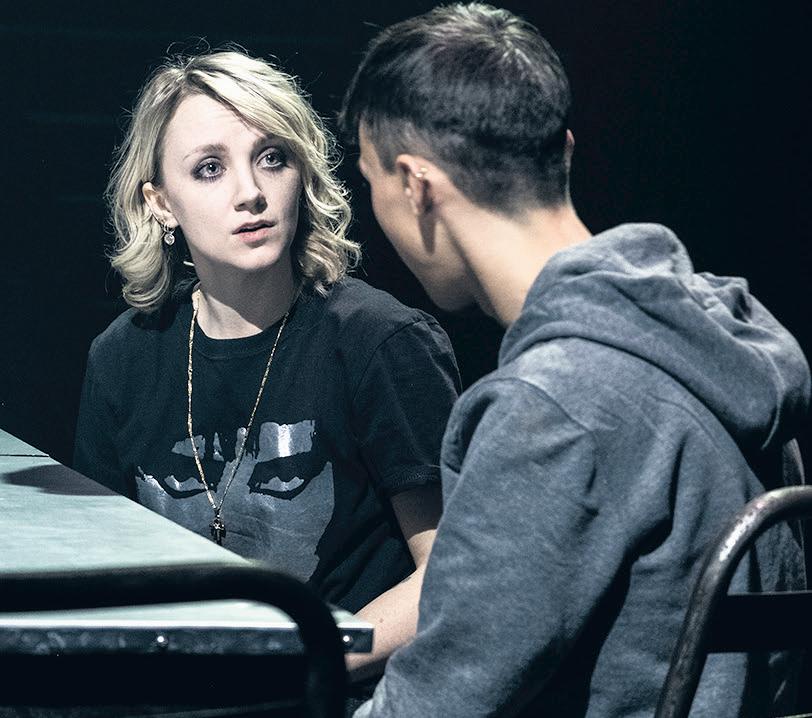
The Arcola boasts a relatively small – yet ample – stage, which, with minimal props and effective lighting, is impressively transformed into the dark and dangerous streets of a city in the grip of a bloody civil war.
Much of the action is to be found in the church-turned IRA meeting room, where the cast of just eight moves seamlessly between a multitude of characters all caught up in the battle that has engulfed their community for many years.
From torture scenes to funerals and IRA stings, the ensemble moves effortlessly
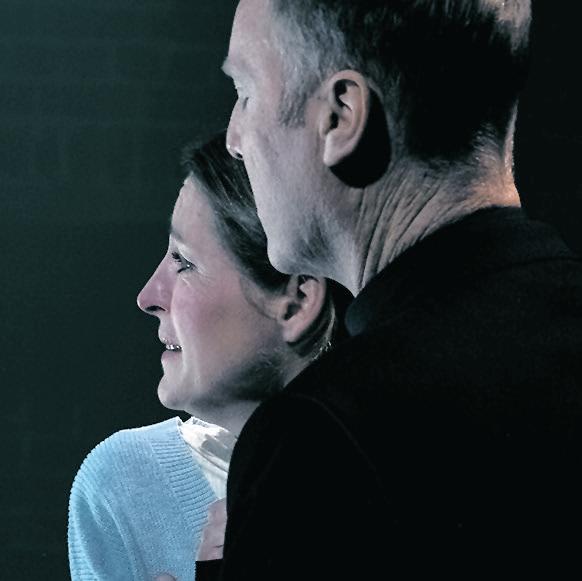
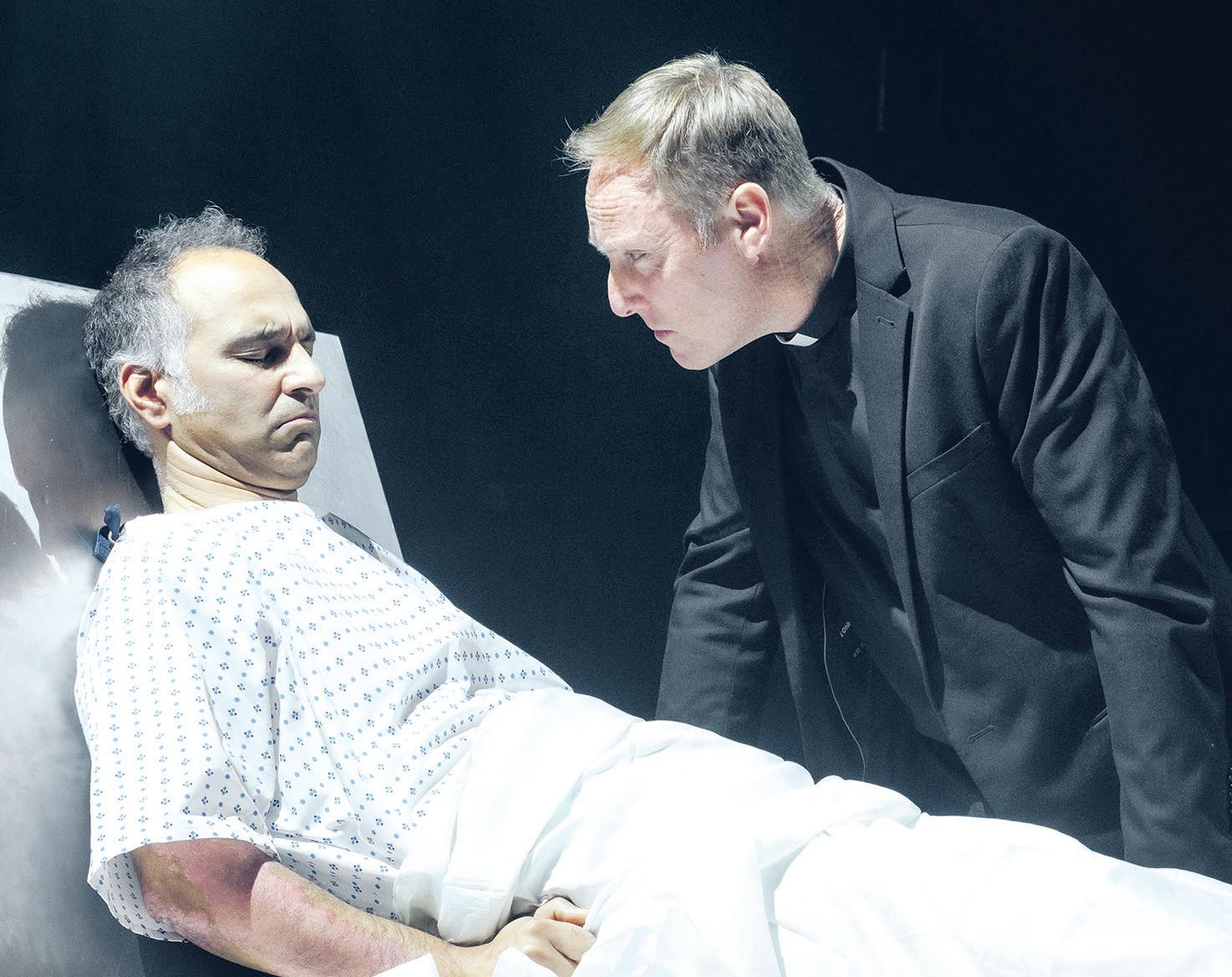
through the settings the highly-charged and fast-moving story places them within.
Above them all hangs a huge black rock, a reference to Belfast’s view of Black Mountain, which dangles precariously over their heads.
There are a few scattered chairs and a table which all serve various purposes as the play progresses, but as far as sets go, that is it.
And it turns out that that is plenty. This drama is played out entirely through the performances, which lead us on a journey through the Troubles via the tragic life choices of the Ryan family.
The Ryans are a family divided and we quickly learn who is on which side.
Dad, Cashel Ryan (John Nagayam) is a long-term member of the IRA, who is slowly grooming his much-loved son Alan (Jordan Walker) to join him.
The women of the family, mum Sandra
(Fiona Montgomery) and daughter Niamh (Lynch) are against the idea and the violence that is putting all of their lives in danger.
their




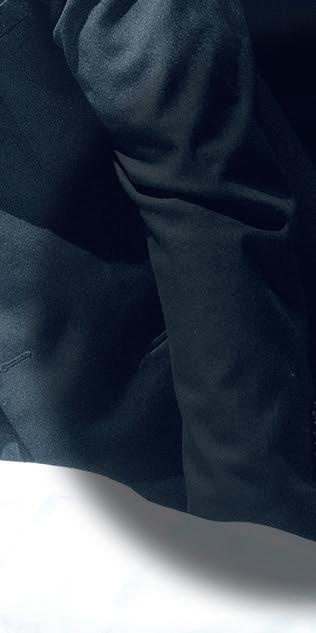












frightening nature which only
But there is some comic relief to be had too, largely through the character of local busy-body Mary (Elizabeth Counsell) whose sarcastic one-liners and dithering disposition hide a much more frightening nature which only reveals itself when the stakes are at their highest. Ultimately, though, there is little to laugh about
in this tale.
This is not fiction really; it’s loosely based on true stories and true-life experiences that many people who lived through that period will recognise only too well.
As such it serves as a chilling reminder of the brutal and bloody history of Northern Ireland that is not so distant and the hard-won peace that must be protected at all costs.
RÍ-RÁ — THE IRISH POST ENTERTAINMENT SECTION 18 April 1, 2023
Under The Black Rock is a Troubles thriller that sends a chill down the spine. FIONA AUDLEY reviews the production
This is not fiction really; it’s loosely based on true stories and true-life experiences that many people who lived through that period will recognise only too well
HIGH DRAMA:
Under the Black Rock
Pictures: Gregory Haney
The seduction and pitfalls of celebrity – fom the harbour in Greenore to a Fulham dole queue
BACK in the 1970s at the Top Of The Pops studio I was party to a significant conversation. It was an exchange between a young enthusiastic Radio 1 DJ about to make his debut as a presenter and an experienced, celebrity veteran. The new DJ asked for advice. The celebrity DJ just said two words: “Simon Dee”, and went on his way.
It was a salutary warning.
Simon Dee was the very first DJ on Radio Caroline, and his rise was meteoric, as was his fall. Dee had witnessed the station boat’s construction at the port of Greenore, Co. Louth, and sailed with the ship to its anchorage off the coast of Essex.
But by 1965 he had fallen out with its eccentric owner, Dublin man Ronan O’Rahilly – whose parents owned Greenore Port – and left. He had refused to play certain records and another occasion he expressly disobeyed the orders of the ship’s captain.
The BBC gave him a job on the Light programme because of his big following and by 1966 he was presenting Top Of The Pops Soon he had his own weekly weekend BBC TV show, chalking up18 million viewers.
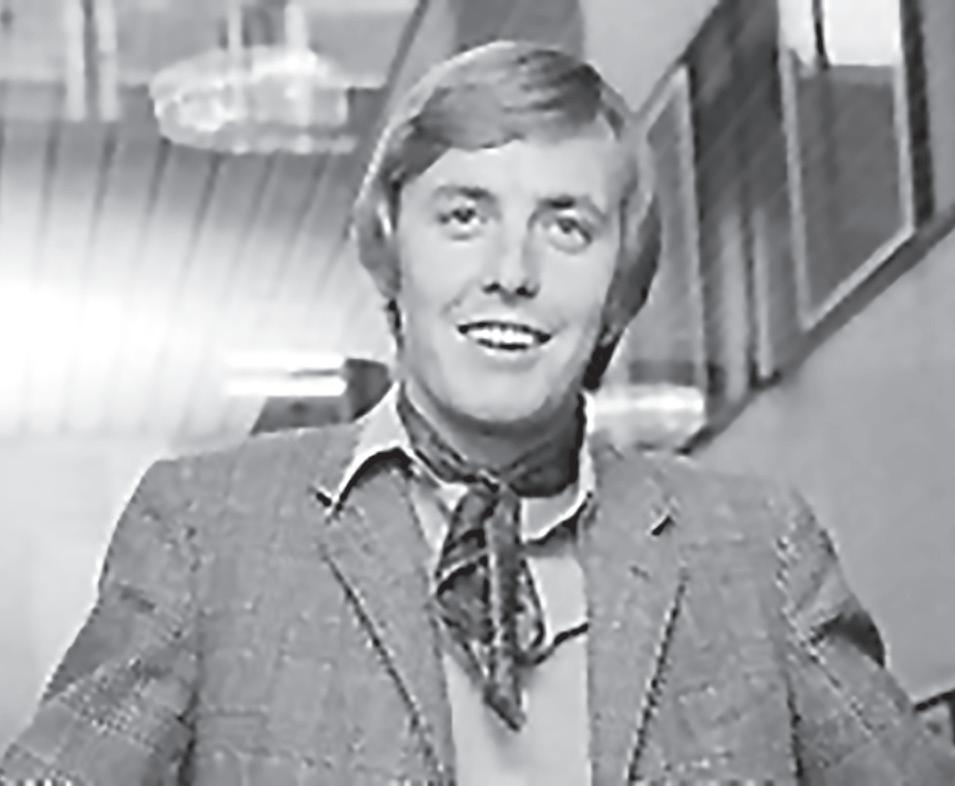
The career trajectory of Simon Dee was remarkable, but such was his ego that he was convinced he was always right. In 1967 he hosted the Miss World Competition for the BBC but he alienated his crew and colleagues by making more and more petulant demands. He,
of course, asked for more money. At the time the Head of Light Entertainment was a very tough Bill Cotton Jnr, who took a dim view of Dee’s demands. Knowing it would never end well and that there was no way to reason with the obdurate Dee, Cotton courageously put the BBC first and refused. He summarily sacked his star at the pinnacle of his career.
Almost immediately ITV saw the opportunity to grab a big name celebrity and offered Dee big money for a Sunday night show for LWT, which started in January 1970.
It was not a success. The respected and high profile critic Milton Shulman wrote about Dee’s “hitherto unplumbed quality of inanity”.
Dee continued to make outlandish demands on top of the huge fees already being paid. Sir David Frost was a founder director of LWT and Dee made the mistake of alienating him. To his amazement Dee was shown the door after a few months.
In those days there were only two broadcasters, ITV and the BBC. Dee now had nowhere to go except the Fulham labour exchange.
Once one of the most successful faces in the public eye he was so broke for a while he became a bus driver. Later he was prosecuted for tax debts and went to prison in Pentonville in 1974.
He was prosecuted again, this time for vandalising a lavatory seat, and ironically the magistrate who sent him down was none other than Bill Cotton, who had hired him and then fired him from the BBC. Dee died in poverty in 2009.
So the stark words ‘Simon Dee’ were actually very good advice back then, and should perhaps be embedded into the brain of all broadcasters as a salutary lesson in how easy it is to blow it all if the ego takes over.
Michael J. McDonagh
Here’s a funny thing...
IRISH comedians, comic actors and comedy writers have for many decades lit up British television. Dave Allen, Dylan Moran, Old Man Steptoe (Wilfrid Brambell from Dublin) were early pioneers on the British media; today Daire Ó Briain Patrick Kielty, Sharon Horgan, Lisa McGee and Ed Byrne are regular fixtures this side of the Irish Sea. In the sphere of sit-coms., there have been successes too, starting with Me Mammy by Hugh Leonard. Airing from 1968-1971 this starred Milo O’Shea as Bunjy Kenefick, Ray McAnally as Father Patrick, and Anna Manahan as the Irish mammy. Light television dramas, which weren’t exactly sitcoms, more whimsical romps – such as The Irish RM and Ballykissangel – also proved very popular.
Then, courtesy of Channel 4, Craggy Island loomed through the mist. Written by Graham Linehan and Arthur Mathews, the story of three priests who can’t quite get the hang of sobriety, chastity or honesty became phenomenally success. Back in the 1980s a comedy about
priests seemed quite a cuddly idea – it’s doubtful if the format would get off the ground today. But it did help launch the career of Graham Norton, as the happy clappy priest. And he is now happier and clappier than ever, being one of highest paid performers on the British airwaves.
former, Brendan O’Carroll’s creation, is now in production for another series.
Featuring Brendan O’Carroll as Agnes Browne, unlike Derry Girls which has picked up plaudits from across the industry, Mrs Brown has been panned mercilessly by the critics.
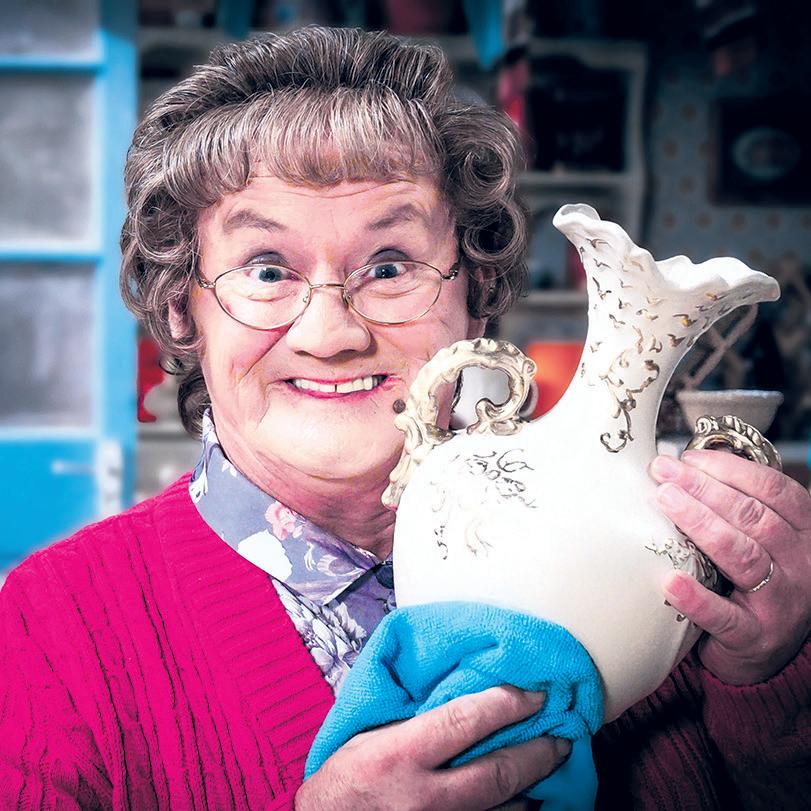
Since Father Ted, other successes followed for Irish comedies such as the IT Crowd and Black Books, as well as Sharon Horgan and Rob Delaney’s Catastrophe. But none have reached the stratospheric heights of Mrs Brown’s Boys and Derry Girls
The latter has just finished its hugely successful run, while the
It’s often described as a throwback to the days of Bernard Manning. But in reality it’s not. Is it racist? An emphatic no. Is it anti-Irish? Difficult to see how it could be construed as such; there are no specifically ‘Irish’ jokes in the series, such as those Frank Carson, and even Val Doonican, used to trade in. Is it sexist? Probably not, although it would be interesting to know what Brendan O’Carroll’s real mammy might have made of it. Maureen O’Carroll (who died in 1984) was a Labour TD in Dáil Éireann for Dublin North-Central. She was Labour’s Chief Whip from 1954 to 1957, and its fair to say was an uncompromising, left-wing figure round Dáil Éireann.
What Mrs Brown’s Boys does seem to covey is a warmth, an
unpretentiousness, a lack of irony and cynicism. It has no political message, no baggage, and the British public seem to have responded to that.
The decision by the BBC to go with Mrs Brown’s Boys was astonishingly brave — as well as being extraordinarily shrewd. It was amongst the biggest
commercial risks they’ve taken in recent years, and seems to have been based on very little other than blind belief.
The Corporation — which doesn’t have its sorrows to seek at the moment — is to be lauded, along with Brendan O’Carroll. Both of them, most certainly, have had the last laugh.
RÍ-RÁ — THE IRISH POST ENTERTAINMENT SECTION April 1, 2023 19
COMICAL IRISH MA: Mrs Brown in Mammy’s Hair Loom
SEDUCED BY CELEBRITY: Simon Dee in 1967
On the news that a further series of Mrs Brown is in production, GRAINNE CONROY casts her eye over the development of Irish comedies on British television
The decision by the BBC to go with Mrs Brown’s Boys was astonishingly brave — as well as being extraordinarily shrewd
Picture: Courtesy of BBC Studios
Marvelling at musicianship
AT the recent Provincial Council of Comhaltas in Britain’s Annual Convention held in Kenilworth Warwickshire, it was the young musicians who took the spotlight.

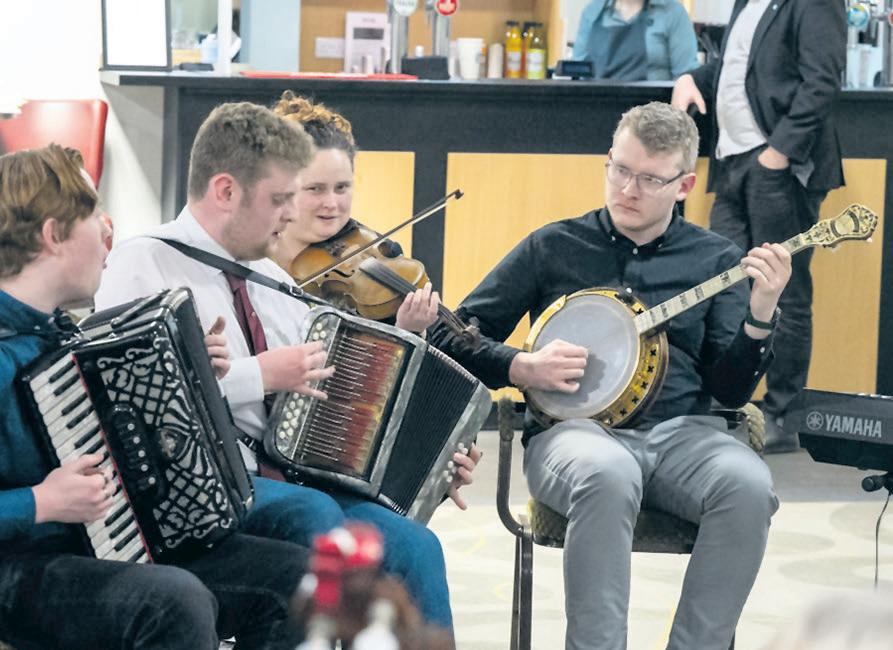
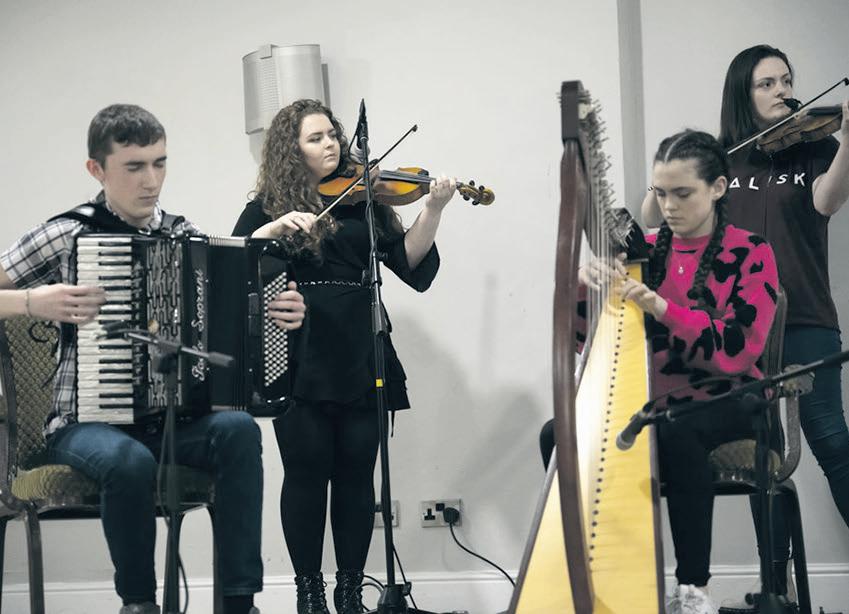
Comhaltas Britain has grown from its first branch in Glasgow in 1957 to now having in excess of 1200 members in 22 branches across Britain.
CROSSWORD
Clues Across
1. Where you’ll get a stamp - or a job (being no longer on the hard stuff)! (4,6)
6. Burial place. (4)
10. Honour earned by one part of the hospital? (5)
11. Secure a breather for a fish, one hears, in this North-western lake. (5,4)
12. Fees. (7)
15. Latin-American dance. (5)
17. Volcano in Sicily. (4)
18. A hot kind of swearword. (4)
19. The sauce has poets in a frenzy. (5)
21. This pest will puff and take wing. (7)
23. String. (5)
24. Shopping precinct. (4)
25. This flower got up. (4)
26. Natural watercourse. (5)
28. Historic type of soldier. (7)
33. Confused, I landed on a weed. (9)
34. Ward off. (5)
35. The Orient. (4)
36. The dieting and exercise here might make her ham flat.
Sudoku requires no calculation or arithmetic skills. It is a game of placing numbers in squares using very simple rules of logic and deduction. It can be played by children and adults. Simply fill in the grid so that every row, every column and every 3x3 box contains the digits 1 through 9. However each number can appear only once on each row, column and 3x3 box. Answer next week.
Seisúns tended to break out throughout the convention
Clues Down
1. Turf. (4)
2. It can be filling the gaps it might create! (9)
3. Senior, more aged. (5)
4. Untrue. (5)
5. One’s pal is much confused. (4)
7. Drug that contains morphine. (5)
8. O call a ball for this town in Laois. (10)
9. There is treatment available to the harp yet. (7)
13. Olga was confused and imprisoned here. (4)
14. Kelp, for example. (7)
16. Structure with a twelve-inch span? (10)
20. Television drama that’s clean and musical? (4,5)
21. It sounds like one inters the tiny fruit. (7)
22. Molten rock from a volcano. (4)
27. The second planet from the sun. (5)
29. Learn about what concerns the kidneys. (5)
30. Mathematical chart. (5)
31. Showing great knowledge and judgment. (4)
32. Microscopic constituent of a male cat. (4)
No.
RÍ-RÁ — THE IRISH POST ENTERTAINMENT SECTION 20 April 1, 2023
Last week’s solution: 7 9 92 1 4 4 5 4 7 3 6 1 6 3 5 2 7 5 7 3 1 8 3 64 1 8 6 2 6 3 6 78 91 1 2 84 34 97 7 7 7 6 2 2 8 8 42 2 9 8 9 4 8 8 9 65 53 1 1 5 6 5 3 3 2 1 45 9 59 3 6 1 3 8 2 3 6 3 7 9 2 4 4 8 5 15 1 2 9 8 5 8 2 9 1 8 69
1 2345678 9 10 11 12 1314 15 16 17 18 1920 21 22 23 24 25 2627 282930 31 32 33 34 35 36
1034
SUDOKU No. 911 Last week’s answers:
Across 1. Omnipotent 6. Scab 10. Hosta 11. Neighbour 12. Caravan 15. Nerve 17. Iron 18. Olga 19. Endow 21. Trivial 23. Stash 24. Over 25. Ivan 26. Glens 28. Ardfert 33. Appalling 34. Rhino 35. Days 36. Granny knot Clues Down 1. Oche 2. Nostalgia 3. Plaza 4. Tonga 5. Nail 7. Choir 8. Barbed wire 9. Channel 13. Vair 14. Nirvana 16. Coast guard 20. Diversion 21. Thistle 22. Arid 27. Empty 29. Regan 30. Ferry 31. Pier 32. Port
Clues
Words and pictures by Chris Egan
Provincial Council, Comhaltas in Britain at the annual Convention
Got

Email

ctfwilkins@gmail.com
A fond farewell to you all
IHAVE embarked upon the writing of my last article for The Irish Post. It’s certainly been fun these past years, and it has given me an opportunity to make many friends and thousands of admirers across the UK and beyond. Without their encouragement and support it would not have been possible.
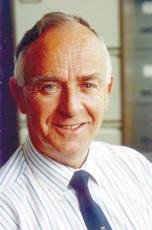
And so, faced with all the articles I still want to write, and ideas still bursting to find form, it is saddening to stop so suddenly but issues with age and domesticity demand that I cease.
I really wanted to wander into the fascinating world of ‘Britain in Bloom’, the origin of garden societies, and delve into the hidden, and now forgotten, large country estates of the last century.
A FINAL EXPECTATION
WHATEVER the temperature outside, however bleak or wet the weather, there can be no greeting warmer or more eloquent than the flowering of the first hellebore; boldly assertive, weather resistant, punctual as tax demands! No wonder they have become firm favourites with millions if not with millionaires.
These earliest flowering perennials are one of the wonders of the plant kingdom, and a matchless garden treasure. They are flowering in gardens near you, but if you are unfamiliar with their charms then visit a garden centre soon and see the best of what’s available. Because most will be in full
Of course, much of what I have written about this great hobby of ours has come to me through experimentation, trial, and error. Some of my earlier articles were inspired by writers who have introduced many to the joys of garden plants
Sometimes these houses used to be where gentlemen set up their mistresses, and this country could boast more than a fair
bloom you’ll be able to choose plants with particularly attractive colours.
The very keen will seek the double flowered H. torquatus and H. x sternii ‘Blackthorn Group’ but for those who want long-flowering, attractive hellebores should choose the Lenten forms.
They’ll be totally happy with these for decades to come.
Provided the ground is neither frozen nor waterlogged, plant them out into free-draining but slightly moist soil.
Hellebores grow particularly well in partial shade and are good on limestone and chalk provided they’re kept well mulched.
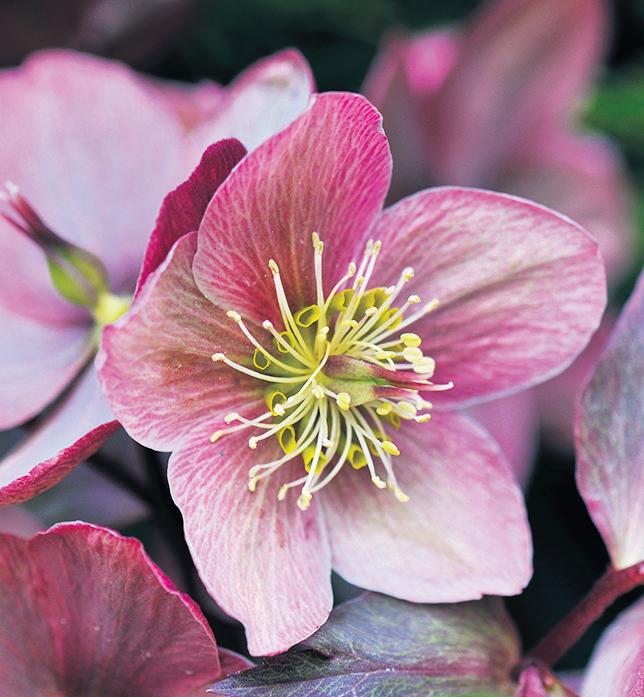
share in times past!
Equally, I would like to have hunkered down and pondered the value of the greenhouse. We would have sat for a morning among ‘Long-Tom’ pots, hanks of raffia and overwintering geraniums. Equally we could have enjoyed the smell of potting compost mixed with the strange perfume we associate with propagation and division.
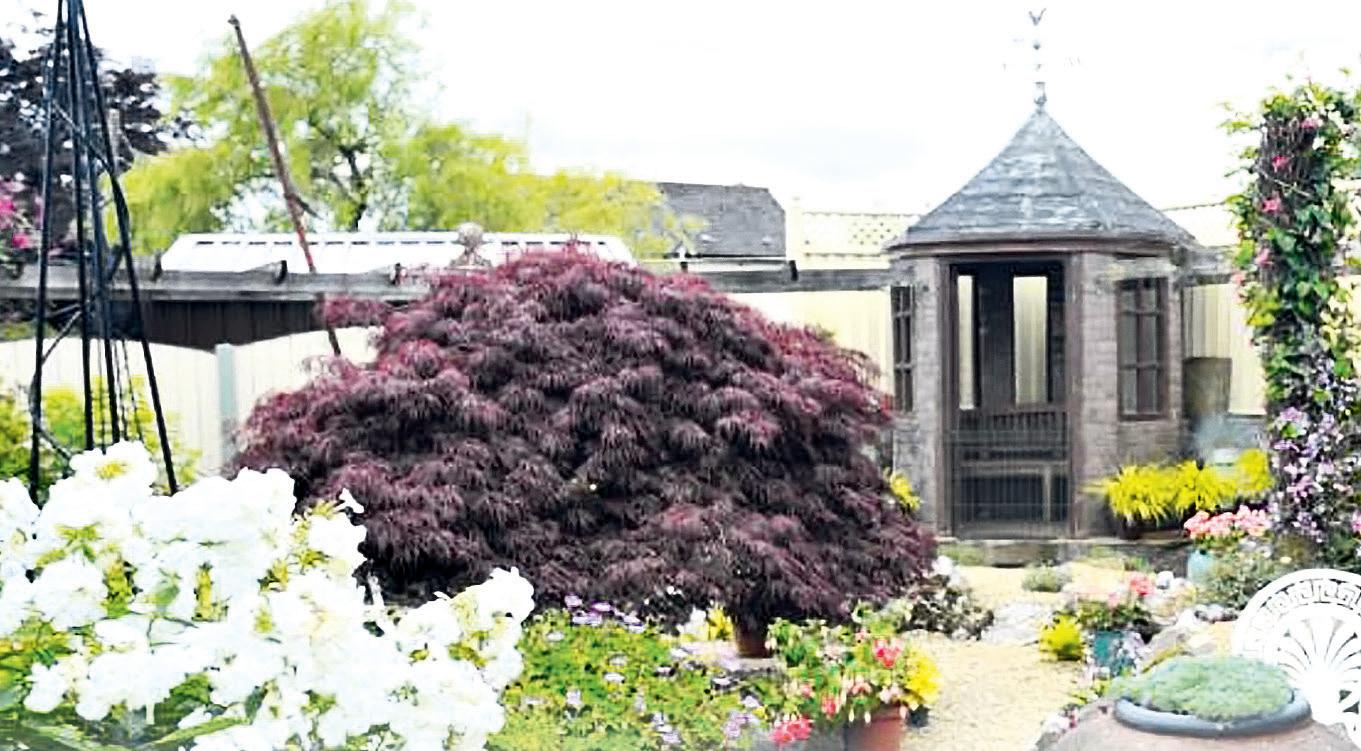
There were people, too, whom I wanted to dust off and push into the limelight. There was a brewer who maintained a garden in Co. Cork which was once described (before our independence) as having the ‘Best Rockery in the British Isles’. There were gardening monks at Mount Melleray Co. Waterford who

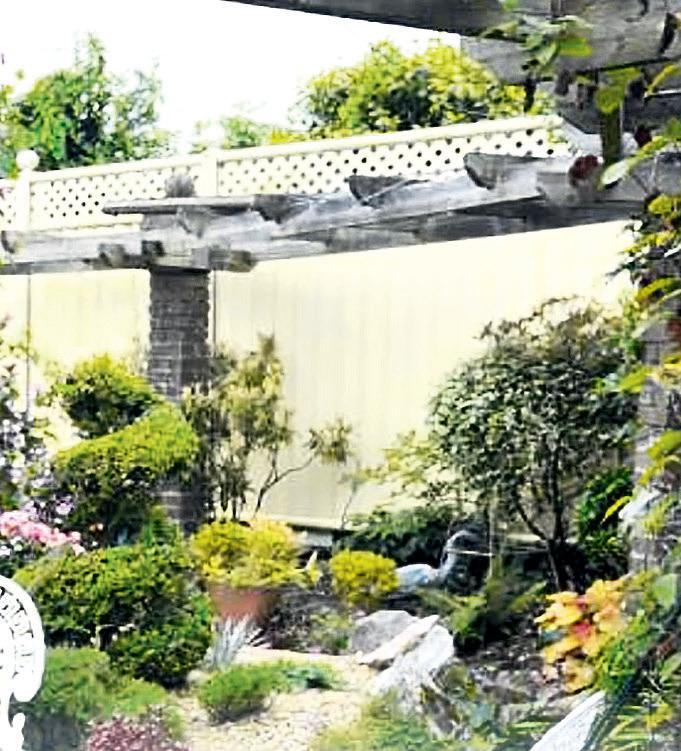
maintained a wooded mountainside and substatial ‘secret’ garden which I had the privilege of seeing on more than a few occasions. Delving further, I would have discussed with you the talented siblings and artists of some famous English gardeners and the demise of the country’s earliest glass structures which later became known as orangeries.
Of course, much of what I have written about this great hobby of ours has come to me through experimentation, trial, and error. Some of my earlier articles were inspired by writers who have introduced many to the joys of garden plants in this country. In my mind I carry them with me, for they, like you dear reader, have in part shaped the
things I have done.
In a way of course the two activities of gardening and writing are similar, but whichever of the two you undertake remember that they should be the best possible version of themselves.
Over the years I have neglected my health and outside plot for these weekly dibbling amongst the pages of The Irish Post Perhaps now that I’m stopping this clean work, I shall have more time to be ‘up and doing’ outdoor things.
There’s always so much to do. Certainly writing and gardening are two journeys that never come to an end, and I have enjoyed both to the limit. Thank you one and all.
THE WONDERS OF GARDENING
MY plants have taught me that life is a continuous circle, one of growing, maturing, and eventually one of rest. Gardening has also given me bountiful days of fun, health, and immense knowledge of how things evolve. It has given me innumerable gardening friends none of whom I would change for even the most desirable of ornamental plants. Best of all, it has given me laughter and tears, and pictures of almost incredible beauty unlike any I have ever seen on canvas or board.
So, as I cease this most wonderful occupation may I repeat for one last time, that in a year so laden with symbolism, so fraught with life-changing decisions and overstocked with bad news, that gardeners (and more importantly my readers) are the lucky ones – for we have a ready retreat into the inviolate rhythms of nature. The west of Ireland is a difficult area to garden but keep at it for as long as you are able. The rewards are bountiful and permanent.
The Irish Post April 1, 2023 | 21
a gardening query?
Charlie at
CHARLIE WILKINS’ GARDENING COLUMN HOME&GARDEN
Helleborus
Picture: Getty Images
GETTING BACK TO MY ROOTS: A small corner of Villa Marie during early spring 2019
Edited by Mal Rogers
Stand by your van

DESPITE the cutting wind and rain, a warm feeling of connection struck me as I stood on the Cobh harbour-front and stared out at that grey sea that had transported my family members to America so long ago.
Three uncles and an aunt had left in the 1930s on a voyage of hope to New York to escape the grinding poverty of a Leitrim hill farm.
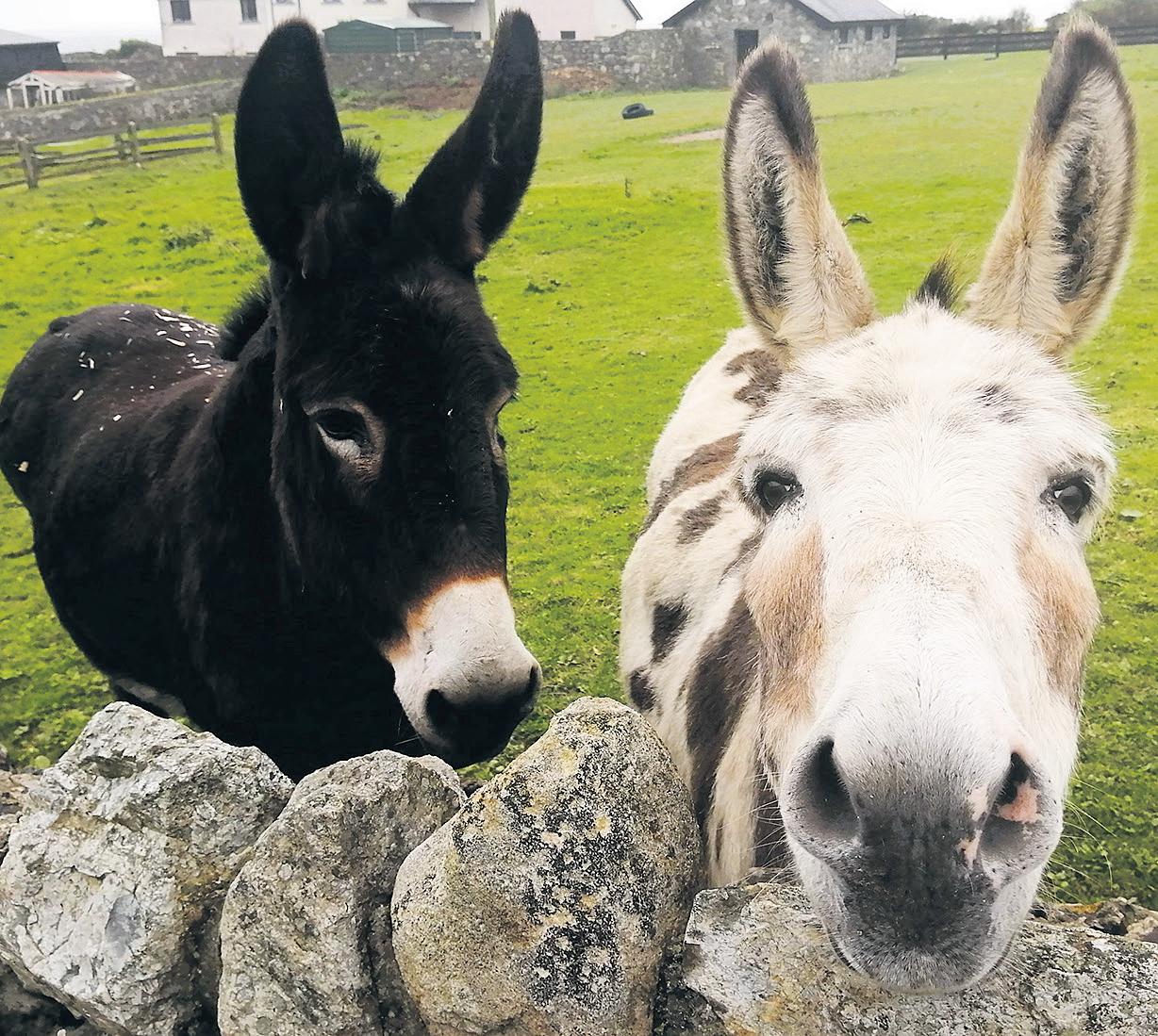
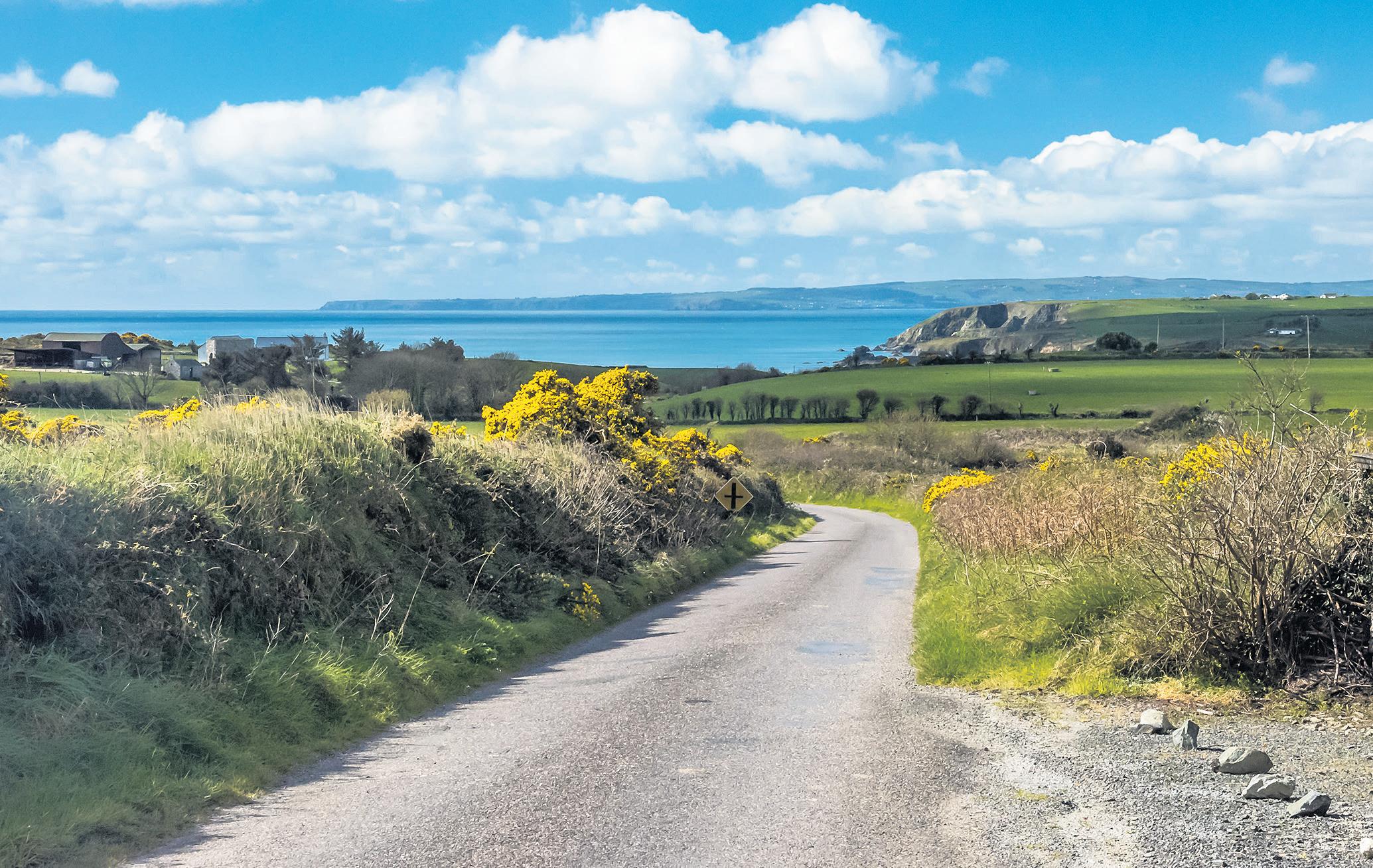
Like the six million other souls who emigrated from there between 1848 and 1950, their enforced voyage was filled with trepidation about the ocean dangers and shipboard diseases that claimed so many – not least those on the sunken Titanic and Lusitania liners.
Like trailblazing Annie Moore and her brothers, who were the first to pass through Ellis Island immigration control in 1892, my four relatives all survived the trip and lived long and fruitful lives amid the supportive Irish-American community of the Bronx.
With the rain sliding off my cagoule and soaking my walking boots, I stood transfixed, recalling
the details of my unremarkable emigration story, which will be so familiar to many readers of this newspaper.
The US-bound foursome had left behind my mother and their oldest bachelor brother, both of whom were meant to remain at the tiny hill cottage, outside Ballinamore, and care for their widowed father.
But she was too high-spirited for that. Still in her late teens, she packed a bag one morning and made her way, using a little saved money, by bus and the Dún Laoghaire ferry for England.
It was there, in Preston, she met and married the Mayo-born man who was to become my father.
Such memories always burn brightly when a member of the Irish diaspora – currently estimated at 80 million worldwide – sets foot in the land of their ancestors.
As former Irish president Mary McAleese once said so aptly: “The immigrant’s heart marches to the beat of two quite different drums, one from the old homeland and the other from the new.”
22 | April 1, 2023 The Irish Post TRAVEL
PICTURE OPPORTUNITY: Stunning views at Copper Coast, Co Waterford
Despite the lively weather, a road tour in Ireland can be a delight, as JAMES RUDDY reports
HELLO STRANGERS: You will encounter friendly locals along the way
And so it marches similarly for those of us who were born overseas but instilled with Irishness by our parents and by memorable visits ‘home’ during our childhoods.
That same joy is felt by my partner, photographer Sue Mountjoy, born to English parents in Nottingham, but growing up among Irish schoolfriends. They instilled in her a lifelong love of the country and its people.
And so, leaving Cobh on our campervan tour, we passed through Cork and enjoyed its English Market, before taking an overnight stay at Blarney (I’ve already kissed the stone twice before!) and then heading west for a walk on the Cliffs of Moher and a couple of musical days in lively Doolin.
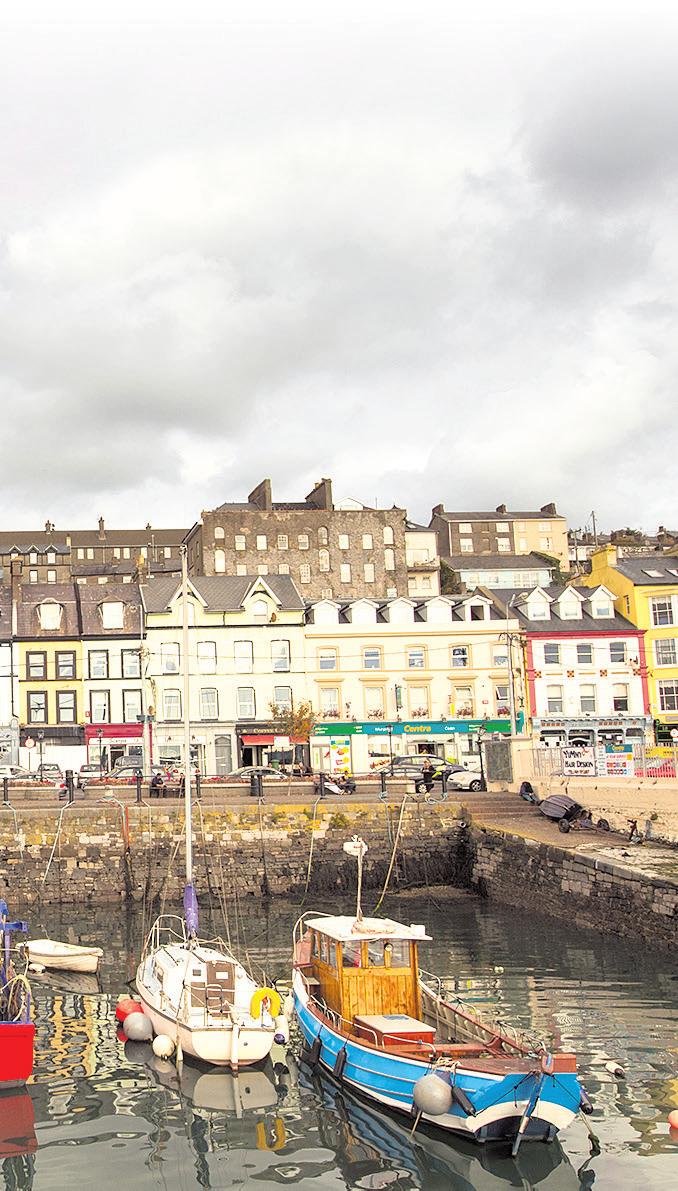
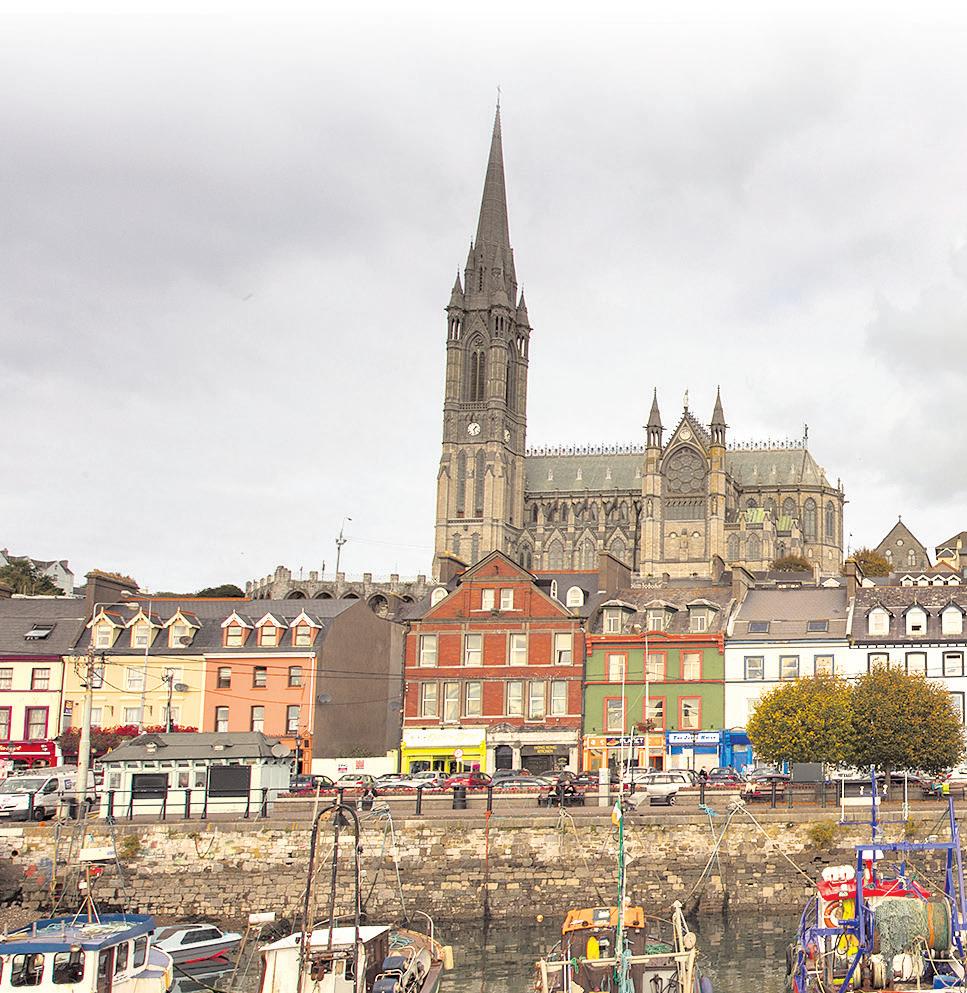
The next few days brought magical flashes of old memories and new delights: Lisdoonvarna, where the annual matchmaking festival was cancelled due to the hotels being filled with refugees from the war in Ukraine; Clifden in Connemara with its glorious Sky Road drive; Mulraney in Mayo with its views out to the mystical Clew Bay islands.
And then there was a stay next to the roaring Atlantic, outside Belmullet, the home of my late father where I spent many summers riding donkeys, stacking hayricks and carrying water buckets from the nearby well.
As we drove back to Dublin and our flight home, I pondered on the many reasons Ireland calls us – and so many people with no family connection – back again and again.
I concluded that it was that uniqueness of spirit in a people who shine with joy and laughter in the face of the harshest of adversity. Perhaps it’s best encompassed in the old saying: ‘Dance as if no-one’s watching, sing as if no-one’s listening and live everyday as if it were your last’.
Who really knows?
Whatever your interests, there’s a great winter break waiting for you in Ireland.
Here are a few ideas to get you started...
1. Winter hikes
Ireland’s dramatic landscape is a walker’s delight and on a bright winter’s day it’s a joy to head out on a hike. Scale the heights of the mighty Mournes in Northern Ireland, step out on the stunning Wicklow Way in Ireland’s Ancient East or challenge yourself to climb McGillycuddy’s Reeks, the highest mountain range in Ireland. Less arduous but equally beautiful walks can be enjoyed along the island’s traffic-free greenways.
2. Star gazing
Winter is great for star gazing and Ireland has three dark sky areas where thousands of stars are visible to the naked eye. Co. Kerry’s Dark Sky Reserve offers guided star gazing experiences, while in Co. Tyrone, the Om Dark Sky Park has a great Stars and Stones experience that combines astronomy and archaeology. The
Mayo International Dark Sky Park’s festival took place from 4–6 November but the Co. still has stacks of great stargazing spots..
3. Wild swimming
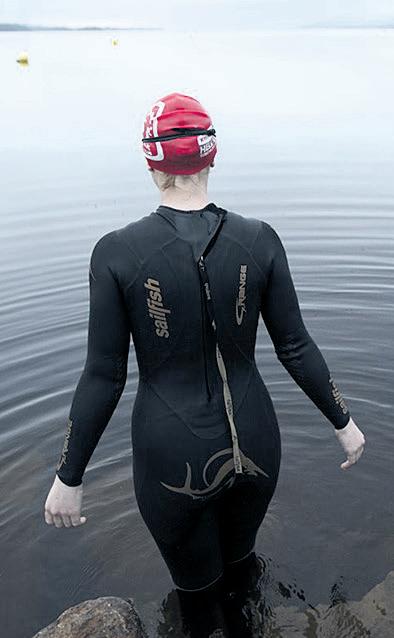
There are lots of wonderful wild swimming spots in Ireland from wild Atlantic waters to sheltered bays and lakes. Keem Bay on Achill Island was recently voted the number one wild swimming spot in the UK and Ireland. For more sheltered waters head to beautiful Lough Erne in Co. Fermanagh or to the glacial fjord of Carlingford Lough, Co. Louth. Remember to bring a wetsuit, these waters are cold!
EXHILARATING: Take a dip
4. Cultural hotspots

If your perfect winter break involves delving into history and heritage, there is a wealth of castles, manors, museums and exhibitions to explore across the land. In Northern Ireland don’t miss Mount Stewart, a gorgeous neo-classical house, and the Game of Thrones Studio Tour, a must-visit for fans of the blockbuster TV series. Dublin has amazing museums, from the traditional National Museum of Ireland to the quirky Irish Rock and Roll Museum Experience, while elsewhere castles and cultural hotspots abound.
5. Cosy retreats
If relaxing by an open fire, savouring fine food, enjoying gorgeous views and experiencing world-class spa treatments appeal, you’ll be spoiled for choice in Ireland. Park your hired campervan outside for a night or two at Blackhead lighthouse, Co. Antrim, to watch the vagaries of the winter sea, or head to Knockranny House Hotel and Spa, Co. Mayo, for some serious pampering. For an unforgettable experience, treat yourself to a stay in Adare Manor, Co. Limerick, recently named the number one resort in the world by Condé Nast Traveler Readers’ Choice Awards 2022.
For lots of useful information, go to www.ireland.com. For planning, try: Road Trips Ireland book, www.dk.com/uk/ book/9780241436691-dk-eyewitness-road-trips-ireland
Factfile
Campervan hire
Bunk Campers are one of the UK and Ireland’s largest campervan hire companies with depots in Dublin, Belfast, Edinburgh and London Heathrow. For enquiries visit www.bunkcampers.com, phone +44 (0)800 0590 905 (open Monday-Friday 9am-5pm) or email enquiries@bunkcampers.com
There are winter discounts as well as an early bird offer for 2023 bookings (from March onwards) until December 31 2022. There are also long stay discounts, pet friendly rentals, or saver motorhome options. Find out more at https://www.bunkcampers.com/ campervan-hire-promotions/
Campsites
Blarney Caravan and Camping Park, https://www. blarneycaravanpark.com/
O’Connor’s Riverside Camping and Caravan Park, https://www. campingdoolin.com/
All-Year round sites
Antrim, Dundonald Touring Caravan Park. Armagh Clare Glen Caravan and Camping Park.
Cork, Jasmine Villa. Top of the Rock Pod Pairc and Walking Centre. Desert House Caravan and Camping*. Sexton’s Caravan & Camping Park. Donegal, Killybegs Holiday Park *. Dublin, Camac Valley Tourist Caravan and Camping Park. Fermanagh, Riverside Farm. Kerry, Inch Beach. Leitrim, Lough Rynn. Mayo, Belleek Park *. Tipperary, Parson’s Green. Wexford, Ferrybank Caravan and Camping Park. Trading Post *. Parks marked * are open by prior arrangement and must be pre-booked.
Holiday Extras
For cut-price UK airport parking, hotels and lounges try Holiday Extras. At East Midlands Airport, for example, one night’s accommodation at the Hilton Hotel with 17 nights parking is available from £161. To book, visit HolidayExtras.com or call 0800 316 5678.
Useful links
Tourism Ireland has lots of useful information here: https://www. ireland.com/en-gb/For specific road trips, try here too: Ireland’s Ancient East | Ireland.com and here Wild Atlantic Way | Ireland.com For further planning, try: Road Trips Ireland book, www.dk.com/uk/ book/9780241436691-dk-eyewitness-road-trips-ireland

TRAVEL The Irish Post April 1, 2023 | 23 Advertise in the Travel section and get customers flying through your door – Contact Dara Ashby on 0208 900 4223 DEPARTURE POINT: Cobh Harbour, Co. Cork
lasting peace in Ireland”

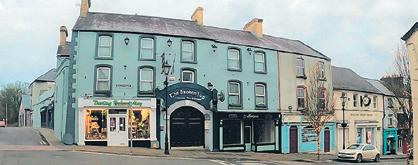


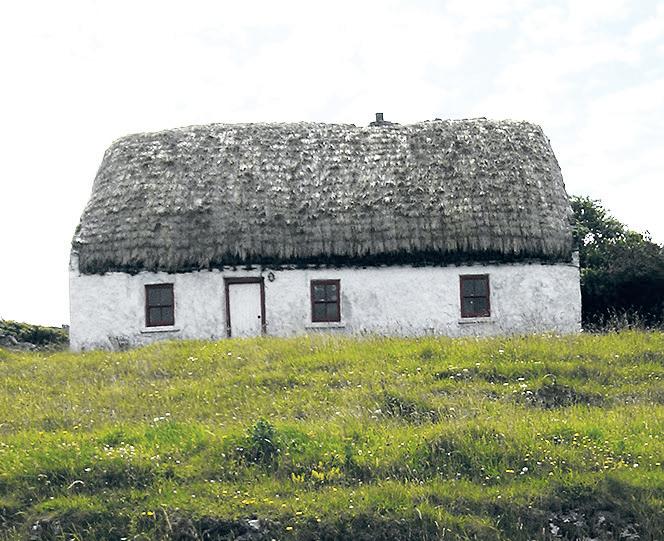




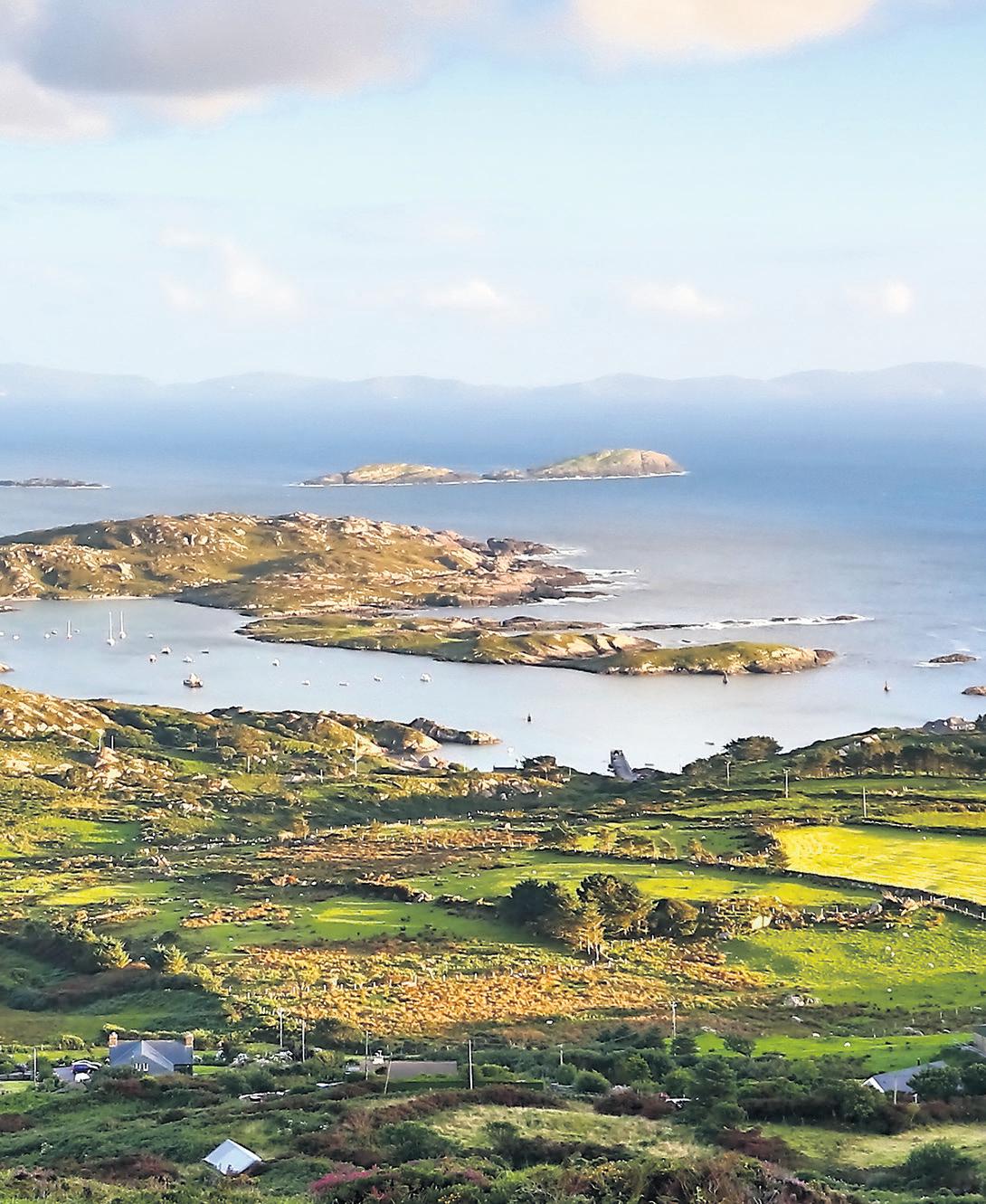









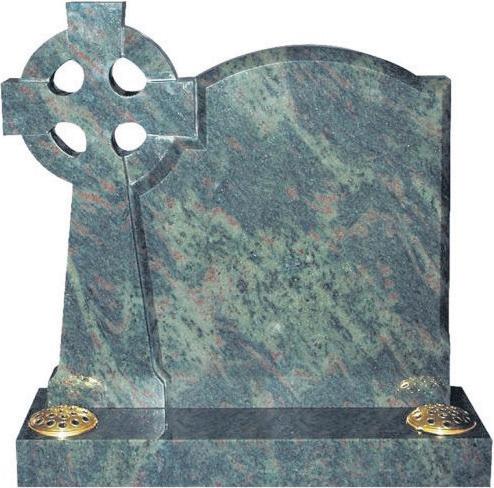















24 | April 1, 2023 The Irish Post MISCELLANEOUS In LovingMemory
want my legacy to be
Co-operation Ireland works with divided and troubled communities in Northern Ireland and the Republic of Ireland to help build a lasting peace. By remembering us in your will you can make a real difference Call us now on 028 9032 1462 or Email info@cooperationireland.org Frank Keogh, Funeral and Repatriation services Transfer by land and sea to any part of Ireland, North or South from €1700. to €2000. Collect remains in U.K. from Hospital or Funeral Home and bring to Funeral Home or Residence in Ireland. No need to have the extra expense of going to an Airport for collection thus saving time and money.. Repatriations usually carried out within 24hrs from first call, depending on location. Over 35 yrs. in the funeral business and 12.yrs in Repatriations Worldwide. Ph: 00353 86 8440208 Email: ftkeogh@hotmail.com Monumental Masons www.mundayandson.co.uk New memorials, additional inscriptions and renovations Email: sales@mundayandson.co.uk T: 0208 968 0556 Visit our showroom at 984 Harrow Road, London, NW10 5JS Opposite Kensal Green Cemetery & St Mary’s Catholic Cemetery Est. 1918 For a free full colour brochure or no obligation quotation call or email SIGN UP TODAY for The Irish Post’s weekly newsletter at www.irishpost.com To advertise your property in The Irish Post, contact the advertising dept. on Tel: 020 8900 4223 or 020 8900 4347 Email: advertising @irishpost.co.uk PROPERTY FOR LEASE OR SALE Pub/Restaurant (with amazing potential) Very large town centre building. Would be ideal for casual dining Italian, Asian, or European food, or would also be suitable for redevelopment as a boutique hotel or apartments. https://michaelboland.ie/property/rahilly-st-ballina/ Telephone: 00 353 9656027 DO YOU WANT THE KEYS TO THE HEART OF BALLINA’S POTENTIAL? A commercial hospitality premises in the heart of Ballina, Co. Mayo is now available for lease or sale. The premises, trading as the Broken Jug, is located in one of Ballina’s main business streets at top of town beside the iconic Post Office building. The Broken Jug first opened its famous big oak doors in July 1995 where a very successful bar and food operation was established. It is one of the largest hospitality premises in the region with a size of circa 4,500 square feet. With two floors of extra bedrooms on site, the premises has excellent potential to be developed into a Boutique Hotel or perhaps short-term rental apartments that would complement the turnkey bar and restaurant. l Superb location in the heart of Ballina town, available to rent or buy. l Corner property in town centre with high footfall. l Well established & popular venue and very spacious. l Huge potential for development as Boutique Hotel with upstairs accommodation. Ideally situated for Ballina’s 300 year celebrations and activities. l Would suit persons with Chef/Manager qualifications. l Serious applicants to provide Plan of Management in advance for rental queries. Would make very suitable premises for an authentic Italian restaurant Call today to schedule your viewing and don’t miss your chance to be part of Ballina’s vibrant community. A video of the property can be viewed here: https://michaelboland.ie/property/rahilly-st-ballina/ FOR SALE OR LEASE The Broken Jug, O’Rahilly St, Ballina, Co. Mayo. F26 KR83 Price On Application For further details, in the first instance please email: deanehotel3@gmail.com for the attention of Molly McMahon FOR SALE OR LEASE The Broken Jug, O’Rahilly St, Ballina, Co. Mayo. F26 KR83 Price On Application DO YOU WANT THE KEYS TO THE HEART OF BALLINA’S POTENTIAL? The premises, trading as the Broken Jug, is located in one of Ballina’s main business streets at top of town beside the iconic Post Office building. The Broken Jug first opened its famous big oak doors in July 1995 where very successful bar and food operation was established. one of the largest hospitality premises in the region with a size of circa 4,500 square feet. With two floors of extra bedrooms on site, the premises has excellent potential to be developed into Boutique Hotel or perhaps short-term rental apartments that would complement the turnkey bar and restaurant. Superb location in the heart of Ballina town, available to rent or buy. Well established & popular venue and very spacious. Huge potential for development as Boutique Hotel with upstairs accommodation. Would suit persons with Chef/Manager qualifications. Serious applicants to provide Plan of Management in advance. Call today to schedule your viewing and don’t miss your chance to be part of Ballina’s vibrant community. A video the property can be viewed here: https://michaelboland.ie/property/rahilly-st-ballina/
“I
14th Anniversary DEACY
In loving memory of Patrick Francis (Frank). Late of Derby and formerly of Swinford, Co. Mayo. Who passed away on 2nd April, 2009. A much loved husband, father, brother and grandad.

You will always be in our hearts and thoughts.
R.I.P.
MICHAEL HEALY
21 April, 1933 – 25 February, 2023



Requiescat in pace
It is with great sadness that we announce the death of Michael Healy from Castlemaine, Co Kerry. Husband to Margaret, father to Caroline, Michael and Colette, father-in-law to Dominic, and grandfather to Oliver.
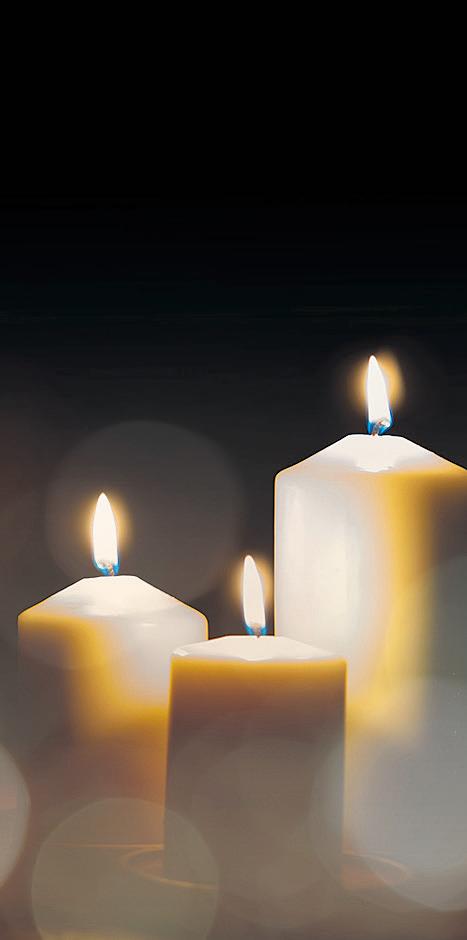

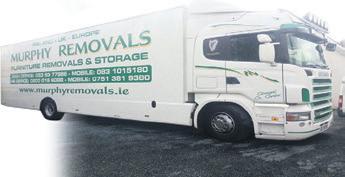
29 March: Reception at 7pm – St Mary and St Andrew RC church, Dollis Hill.

30 March: Requiem Mass at 10 am – St Mary and Andrew RC church, followed by the burial at St Mary’s RC cemetery, Harrow Road. Family flowers only. Donations if desired should be made to: Haematology Cancer Care – uclhcharity.org.uk. Please select ‘Haematology Cancer Care’ for your donation.
ADVERTISING DISCLAIMER

years


Advice on all types of taxation: tax refunds, Capital Gains Tax, Inheritance Tax, investigations, company matters, insolvency
Telephone Christina, Maggie or Michael on 020 8451 6870
Email: Michael.smith888@yahoo.co.uk




CATHOLIC DATING
Tired of being a Catholic on your own when everyone else is partnered up. YOU too can find someone special.
‘Friends1st’ can help you find them.


Call today: 0208 088 3813 www.friends1st.co.uk

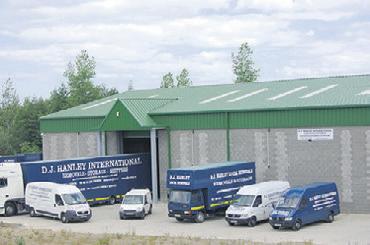






The Irish Post April 1, 2023 | 25
Irish
■ Fully insured ■ Service to all parts of Ireland, UK & Europe EMAIL: info@murphyremovals.com WEB: www.murphyremovals.com IRE: 00 353 53 9377986 MOB: 00 353 831015180 UK freephone: 0800 0156088 UK MOB: 07513819380 TODAY Storage - Part Loads - Pianos - Antiques - Single Items
Local & International Removals & Storage. Based in Wexford, Ireland, we offer an affordable, fully insured removals service covering Ireland, UK and rest of E.U. • House & Office Moves • Local/National/Europe • Packing materials & service available • Storage available • Door to door service • Tailored quotes • Friendly personal service ❯❯ CALL BRYAN TODAY FOR A QUOTE ON +353 85 2250999 bmovers2019@gmail.com @bmovers19 @bmovers2019 REMOVALS KENNEDY MOVERS KENNEDY MOVERS INTERNATIONAL Containerised StorageThe specialists for BRITAIN - IRELAND 0800 592774 (Freephone) Email: info@kennedymovers.com Website: www.kennedymovers.com Ireland removals weekly LONDON - BELLEEK - CASTLEBAR - OMAGH Fully insured Visit www.vpgremovals.com or email vpg75@hotmail.com info@vpgremovals.com Book now or request quote, phone 028 6865 8106 - 07831 629517 - 07734 245359 Family run business built on recommendations. UK- IRELANDevery week! Call 0800 973 800 www.movinghome.ie Email: info@movinghome.ie DJ HANLEY & SONS Est 1984 International Removals - Weekly Service International Licence no: 7360 NO JOB TOO BIG OR TOO SMALL - Packing - Moving - Storage- Car Transport- Fully insuredContact us on 00 353 12810416 or 00 353 862444032 www.djhanleys.ie / info@djhanleys.ie / removals@djhanleys.ie D.J. HANLEY Join The Irish Post on... Sign up today for The Irish Post’s weekly newsletter at www.irishpost.com ANNIVERSARIES & ACKNOWLEDGEMENTS www.irishpost.com CLASSIFIED ADS FUNERALS PATRICK RYAN AND DAUGHTER. Catholic Funeral Directors, 6 South Ealing Road, Ealing, W5. Tel 020 8567 1664. Also at 49 Oldfield Lane South, Greenford. Tel 020 8813 1449. Funerals arranged in the UK and to all parts of Ireland. Irish-made coffins and caskets with religious figures. Pre-paid plan available. Members of SAIF. www.patrck-ryan.co.uk Remembering PERSONALISED MEMORIAM CARDS, BOOKMARKS AND ACKNOWLEDGEMENTS, NOTELETS ALL STYLES Samples / Information KENNEDYPRINTERS BANTRY, CO. CORK, IRELAND Tel. 00353 (0)27 50102 www.kennedyprinters.ie email: info@kennedyprinters.ie ACCOUNTANTS ACCOUNTANTS NORTH WEST LONDON Established 30
While every care is taken to check advertisements, we would advise readers to try as far as possible to assure themselves that offers are of a bona fide nature before parting with money. Neither The
Post or its employees can be held responsible for the failure of advertisers to meet any of their responsibilities.
B. Movers
• • To place a notice in this section, please contact: advertising @irishpost.co.uk Call or email: Tel: 020 8900 4223 or 020 8900 4347 Email: advertising @irishpost.co.uk
Red card for English player rescinded
 BY CONOR O’DONOGHUE
BY CONOR O’DONOGHUE
ENGLAND’S Freddie
Steward has had his red card from the Ireland game in the Six Nations finale overturned.
England and Ireland played the Grand Slam finale in the Aviva Stadium with Ireland winning a 29-16. But the game, according to some observers, turned on a first-half red card for Steward.
After a wayward pass by Ireland’s Mack Hansen, Steward and opposite fullback Hugo Keenan both charged towards the ball.
Keenan lost control of the ball and met the incoming England fullbacks’ shoulder in a collision.
Referee Jaco Peyper gave Steward his marching orders for the encounter after consulting the TMO.
Many people argued that Steward’s role in the sending off was harsh and was not done with intent to hurt Keenan.
The Leinster fullback had to be taken off and was replaced by Jimmy O’Brien for the rest of the game.
Steward faced a disciplinary hearing last week and has been cleared of a red card
The statement from the Independent Disciplinary Committee read: “England fullback Freddie Steward appeared before an independent Disciplinary Committee via video link having received a red
card in the Guinness Six Nations match between Ireland and England on Saturday 18th March 2023 played at the Aviva Stadium.
“The Red Card was issued as a result of the Referee concluding that the Player had acted contrary to Law 9.13 (A player must not tackle an opponent early, late or dangerously. Dangerous tackling includes, but is not limited to, tackling or attempting to tackle an opponent above the line of the shoulders even if the tackle starts below the line of the shoulders),
The independent Disciplinary Committee consisting of Nigel Hampton KC –Chair (New Zealand), Frank
Hadden (Scotland) and John Langford (Australia) heard the case, and considered all the available evidence, including multiple broadcast angles and submissions from the Player and his representative.
“After hearing the submissions, the Disciplinary Committee formally amended the Law which was breached to Law 9.11 (Players must not do anything that is reckless or dangerous to others including leading with the elbow or forearm, or jumping into, or over, a tackler.)
The panel went on to say that after reviewing all the evidence Steward was free to play again, but it was a yellow card.
Ireland’s soccer team may be heading for a golden era
THE REPUBLIC of Ireland men’s football team has been drawn into a difficult group for the UEFA Euro 2024 championships alongside France, the Netherlands, Greece, and Gibraltar.
Ireland has flattered to deceive in qualifying campaigns regarding European Championships and World Cups over the years. There is little optimism that Ireland can make it to the Euro 2024 in Germany at the end of this qualifying cycle.
However, Stephen Kenny has an array of young talent and will aim to give some of his younger fledglings an authentic taste of tournament football.
These include the likes of Brighton & Hove Albion’s Evan Ferguson, Southampton’s Gavan Bazunu, Wolverhampton Wanderer’s Nathan Collins, and many others.
One man who knows what it is like to represent his country is former international and Cork native Stephen Ireland.
newcomers to the squad, but has already made his presence felt.
Ferguson is becoming a household name in Irish and English football for his breakthrough season in the Premier League.
way he is going and close out the season and kick on next year.”
“Evan Ferguson reminds me of Robert Lewandowski.”
Standing at 6 ft 2 in (1.88 m), Ferguson has the frame and the stature to hold his own in the Premier League.
He has even been compared to Manchester City goal machine Erling Haaland, former Manchester United legend Wayne Rooney, Robin van Persie, and other high-profile forwards who have all influenced the game at one stage.
PROMISING PREDICTION: Stephen Ireland predicts a bright future for Ireland’s national team

Ireland played six times for his country and was voted the FAI (Football Association of Ireland) Young International Player of the Year in 2007. The former Manchester City star played four times in Ireland’s UEFA Euro 2008 qualifying group but fell out of the squad for many reasons well known to the Irish public.
Evan Ferguson is one of the
His displays for Brighton at 18 years of age have attracted the attention of some of the biggest clubs in England. They include the likes of Chelsea, Manchester United, and Tottenham Hotspur.
A brace for Brighton against Grimsby in the FA Cup last Sunday has only increased Ferguson’s stock in world football.
After his breakthrough season, Ireland admitted that Ferguson’s mental strength impressed him.

“Yeah, he’s flying and credit to him,” said Ireland. “That number nine role is one of the hardest to play because clubs invest a lot in those areas, and all credit to him. He’s taken his chance. It would benefit him if he could continue the
Ireland had other ideas and likened the Bettystown native to Polish goal machine Robert Lewandowski, once at Bayern Munich and now at Barcelona.
“In terms of his style, for me I think he is more of a Lewandowski, rather than a Robin van Persie-style striker,” Ireland added.
“Ireland could emulate Belgium’s golden generation,” Stephen Ireland believes.
People who follow football closely believe that Ireland has a potential golden generation on the horizon with the level of talent coming through. Still, as an Irish fan, it is hard to get excited about potential when the onus is on getting results here and now.
Ireland’s current crop has been likened to Belgium’s golden generation, which has produced so many stars over the years.
26 | April 1, 2023 The Irish Post SPORT SOCCER/RUGBY Email: sport@irishpost.co.uk
Picture: Getty Images
CONOR O’DONOGHUE chats to Stephen Ireland about Ireland’s chances at Euro 2024, and whether a rosy future is on the horizon for the national squad
In terms of his style, for me I think [Ferguson] is more of a Lewandowski, rather than a Robin van Persie-style striker
SEEING RED: Freddie Steward and Hugo Keenan involved in a prior clash before Steward’s sending off Picture: Getty Images
Irish cricketers humbled on historic tour to Bangladesh
Bangladesh, after losing the toss, notched up their highest ODI total of 349 for 6 on the back of Mushfiqur Rahim’s 60-ball 100, the country’s fastest-ever. He struck 14 boundaries and two sixes as Irish bowlers failed to make regular inroads.
Najmul Hossain Shanto was first involved in a 101-run partnership with opener Litton Das and when Hume struck twice in successive overs to reduce Bangladesh to 190-4 in the 34th over, Rahim stepped up in the company of Hridoy to register a whirlwind 128-run stand.
Ireland’s bowling in the death overs was tested as they were plundered for 108 runs off the last ten overs. Hume was once again the pick of the bowlers with figures of 3-58 but found little support from the other end.
With the opportunity to level the series in the third ODI and be the first Irish captain to taste success in the country, Andrew Balbirnie opted to bat first, more in the hope of being able to make use of the batting-friendly pitch and restrict the Bangladesh batters in the second innings.

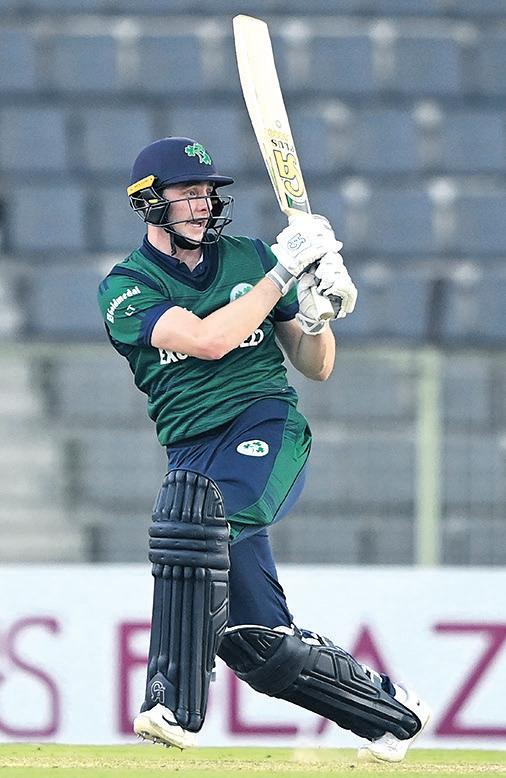
But what followed instead was another trial by seam bowling as Irish batters failed to contend with the quicks on a hard and bouncy surface. As a result, Ireland was shot out for 101 in 28.2 overs with Hasan Mahmud’s maiden five-wicket haul leading the rout.
Bangladesh needed only 79 deliveries to chase down the target in under an hour. Das made a 38-ball 50 alongside the Bangladeshi captain Tamim Iqbal (41*) to ensure there were no blemishes.
HATHI reports


IRELAND’S first-ever bilateral ODI series in Bangladesh in 15 years ended in a humiliating 0-2 series loss.
The margin of victories for the hosts - by 183 runs and 10 wickets - was their biggest in terms of runs and wickets. The latter was also Ireland’s first-ever 10-wicket defeat in the format after the batting was largely undone by Bangladesh’s unrelenting seam attack.
Ireland’s lack of experience in the subcontinent was at the fore as they failed to pose any substantial threat to the hosts and were found wanting across departments. If the bowlers failed to keep the Bangladeshi batters quiet, the Irish batters succumbed to the fast bowlers.
In the first ODI, Bangladesh took advantage of the batting-friendly conditions on offer in Sylhet with their highest ODI total - 338 for 8 - a record which stood for only two days.

At 81-3, Shakib Al Hasan, in conjunction with debutant Towhid Hridoy, steadied the innings with a 135-run stand but both fell in the 90s. In the process, Al Hasan became the third cricketer to reach 7000 runs and 300 wickets in the format and Hridoy recorded the highest score by a Bangladeshi debutant in ODIs.
Mushfiqur Rahim provided the finishing fireworks with a fiery 26-ball 44 as Graham Hume’s 4-60 limited the damage somewhat.
In response, Ireland lost a flurry of wickets after an opening partnership of 60 between Stephen Doheny and Paul Stirling. They lost their next five wickets for just 16 runs and were eventually bowled out for 155 in the 31st over, a total inflated by George Dockrell’s fighting 45-run knock.
Fast bowler Ebadot Hossain, playing in his seventh ODI, was able to generate significant bounce with 140-plus kph deliveries and was duly rewarded with career-best figures of 4-42.
“Bangladesh have shown not just in the series against us but also England that they have become an all-round side,” Ireland head coach Heinrich Malan said after the series.
“It’s not just about playing their spin anymore, they have a quality seam attack as well. That’s come from years and years of planning and experience. If you flip it over for us, our batters don’t necessarily face 140 kph bowlers in our domestic circuit at this stage. It’s a challenge that we have identified for us to work on.”
Ireland’s bowling stocks were depleted with injuries to Josh Little, Craig Young and Barry McCarthy with the likes of Fionn Hand and Tom Mayes handed last-minute call-ups.
While the second ODI was washed out,
“I decided to bat because we wanted to get a score on the board, we knew we had to be pretty tight in the first 10 (overs) but the first hour was a disaster from a batting point of view and we were never going to get a big enough score,” Balbirnie explained after the game.
Bangladesh came into the series with confidence on the back of a historic 3-0 T20I series win over a second-string England side, currently the defending world champions.
“They are obviously off the back of some good cricket against England, we are straight here from indoor cricket, and we didn’t adapt as quickly as we needed to. They have shown they are a good team and have played much better cricket,” Balbirnie said.
Ireland will face an uphill battle when Bangladesh tour Chelmsford for the reciprocal tour consisting of three ODIs, all part of the World Cup Super League. While Bangladesh have already secured a spot in the 10-team World Cup to be held in India at the end of the year, Ireland need to beat them 3-0 in May or fight it out at the World Cup Qualifier in Zimbabwe in June.
“We came here with high hopes of playing good cricket and competing but we didn’t. When you come up against good attacks if you are not at your best you are going to be found out.
“And it’s a shame because we have been playing well in this format, but that’s cricket, and we have to find a way to be better when they come to Chelmsford.”
The Irish Post April 1, 2023 | 27
Email: sport@irishpost.co.uk CRICKET SPORT
Ireland out-bowled and outclassed in 0-2 defeat, MALHAR
ON THE BACK FOOT:
fends off a Bangladeshi fast
Picture: Getty Images
Ireland’s Lorcan Tucker
ball
THE OTHER MEN IN GREEN: Bangladesh’s Ebadot Hossain (second right) celebrates with teammates after taking the wicket of Lorcan Tucker
Picture: Getty Images
SIX NATIONS: THE HIGHLIGHTS AND THE WARNING LIGHTS
THE year 2023 will now forever be etched in the memories of Irish rugby fans. Andy Farrell’s side clinched a Six Nations Grand Slam in Dublin for the first time by beating England in the process.
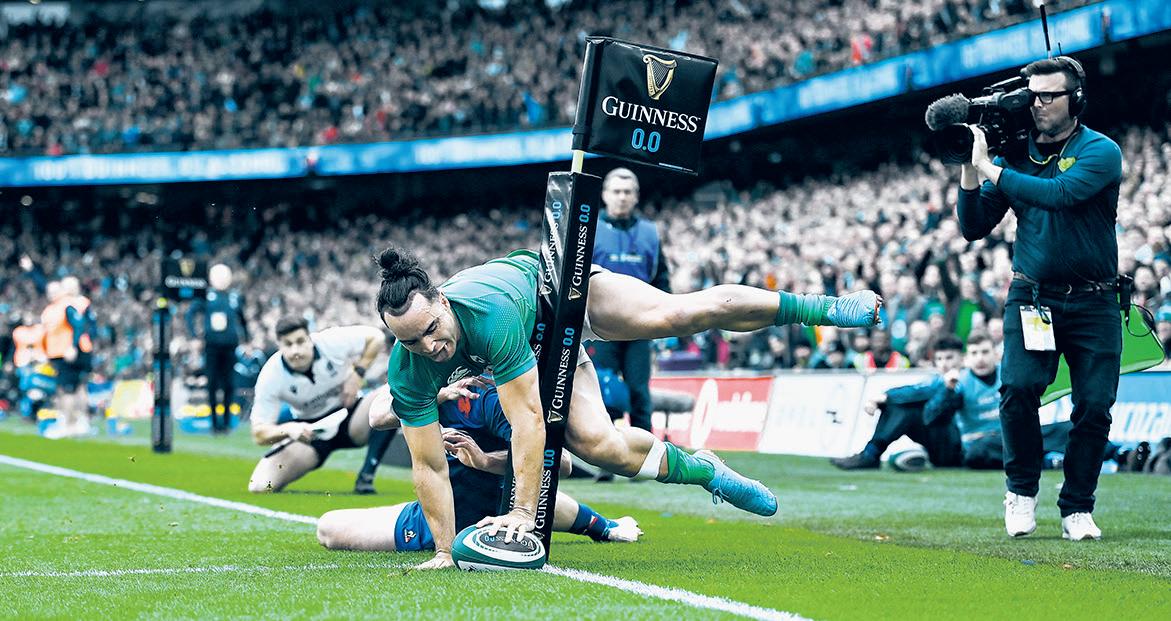
Ireland are now looking ahead to the World Cup in September with poise as their European counterparts dissect where they came up short.
THE GAME IS BOOMING IN IRELAND
Whereas rugby is battling to sustain interest in England and Wales, in Ireland the sport continues to boom.
A record 1.45 million people watched last week’s Grand Slam win on Virgin Media One, making it the most viewed event of 2023 so far and the highest rating seen for a sporting event since 2017.
Meanwhile, the Leinster Schools Final – played the day before Ireland’s victory over England – drew a crowd of nearly 10,000 as Gonzaga College overcame Blackrock College.
The recent success achieved by Farrell’s team will only heighten interest in the sport.
GOLDEN ERA NOT STOPPING
For those wondering whether Ireland’s golden era in rugby will last, the underage sides provided reassurance.

As the senior team secured its third Grand Slam this century, the
under-20s made their own history with a Grand Slam victory of their own – their second in a row and third in four years.
The crushing 82-7 victory over Scotland displayed the potential of the Irish youngsters coming through. Meanwhile the heavy 42-7 defeat suffered by England’s juniors against France suggests that French preeminence is set to continue.
IRFU LOSING OUT ON MONEY
The sight of a packed out Aviva Stadium cheering on Ireland’s Grand Slam win was a joy to behold.
However, the IRFU must regret that their home in Lansdowne Road holds just 52,000 as they could easily have sold double that number of tickets.
At a time when rugby fights for every penny, Irish rugby is missing out on pivotal revenue compared to their European counterparts whose stadium capacities range from 67,000 up to 80,000.
CUT DOWN ON THE BEERS
As the Guinness TV advert mentions, the Six Nations is all about the local camaraderie and the rivalry. It’s why the tournament draws so much interest.
However, in recent times, many fans attending its games seem more interested in drinking than cheering on their team.
Former England head coach Sir
Clive Woodward bemoaned the number of supporters consistently leaving their seats to fill up their cups during the England and Scotland match at Twickenham. Meanwhile, similar complaints were made after the England and Wales match in Cardiff.
Heavy drinking is not exclusive to rugby crowds as racegoers will testify. But it is more problematic in seated stadiums when genuine fans are constantly disturbed.
SCOTLAND A RISING FORCE
Ireland had to fight hard to beat Scotland at Murrayfield and were helped by their Celtic cousins running out of steam in the second half.
Both sides will meet again in the World Cup and, with Ireland having beaten Scotland the last eight times in a row, Andy Farrell’s side will be huge favourites.
However, as Gregor Townsend’s team showed in Edinburgh, they are not to be taken lightly especially if they can add more pace to their play.
TERRESTRIAL TV SUCCESS
In the last decade, the portfolios of live sport held by terrestrial channels have been decimated as sporting CEOs seek high revenues and snazzier presenting from the likes of Sky TV and Amazon.
Thankfully, the Six Nations is still broadcast on free-to-air TV and the analysis provided throughout the tournament from BBC, ITV and Virgin Media was second to none.
In particular, the panel of Woodward, Jonny Wilkinson, Rory Best and Brian O’Driscoll for Ireland’s win over England did ITV proud and showed terrestrial TV channels are still well equipped at broadcasting big sporting events.

WHOLE SQUAD HAS BOUGHT INTO FARRELL
After the winning tour of New Zealand in 2022, it was clear Farrell’s main players fully believed in his leadership and ideas.
Yet this year’s Six Nations showed how important it is that players outside the starting team make a significant contribution.
When Jamison Gibson-Park was absent for the France clash, Conor Murray stepped in with a fine performance. Meanwhile, Jack Conan performed admirably as a substitute against England.
The strength of Ireland’s current squad will concern their World Cup rivals.
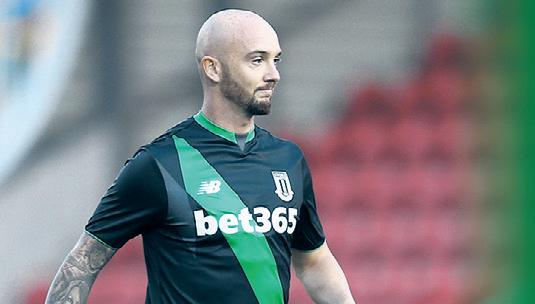
A GREEN ROME
Granted, the Eternal City is a huge attraction as a holiday destination.
However, the swathes of green shirts around Rome and at the Stadio Olimpico when Ireland played there in February was an eye-opener.
During a cost of living crisis, it never ceases to amaze how many Irish sports fans are prepared to travel to follow their team. A green-tinted Rome will live long in the memory.
28 | April 1, 2023 The Irish Post Republic of Ireland, Spain & Portugal €2 9 770959 374002 ISSN 0959-3748 13 A GOLDEN ERA MAY BE ON THE HORIZON Stephen Ireland talks to The Irish Post about Ireland’s Euro 24 prospects Page 26 Contact the sports desk | email: sport@irishpost.co.uk
JACK MARTIN looks back at a fascinating and unforgettable Six Nations tournament, and considers the portents for the World Cup
AEROBATIC TRY: James Lowe scores in the corner against France Picture: Getty Images






















































































































































 BY CONOR O’DONOGHUE
BY CONOR O’DONOGHUE










